Sunday 28, 08:18:05
Awards Ceremony
Images from the Awards Ceremony
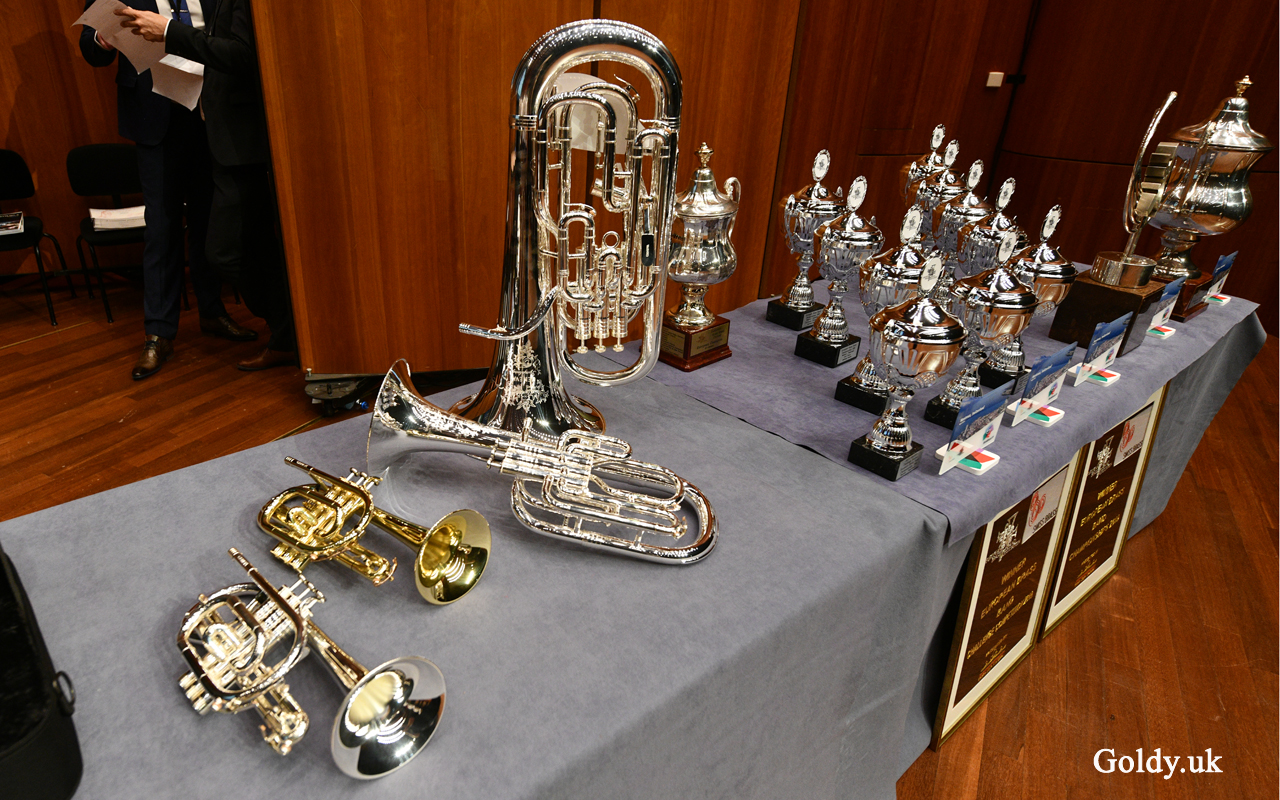
Instrument Awards on Display
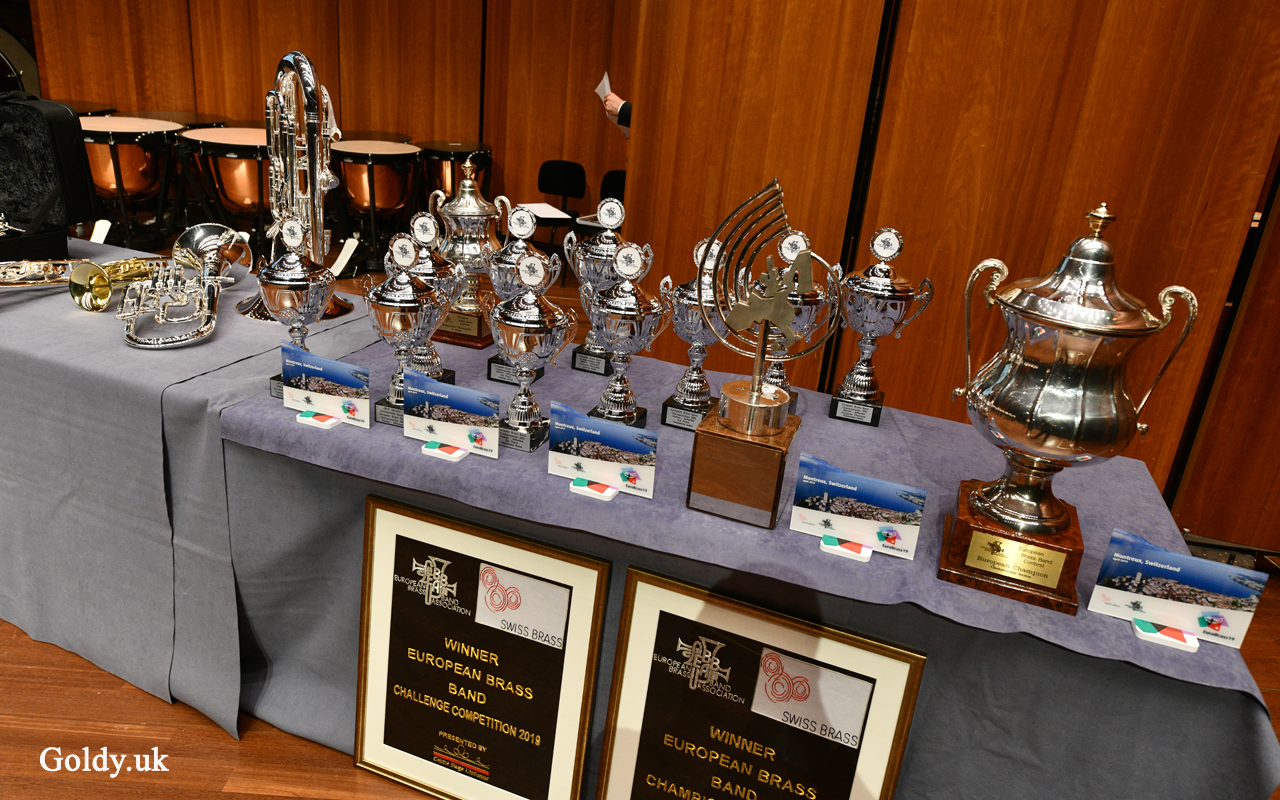
Trophies and Banners in readiness for presentation
Championship Section
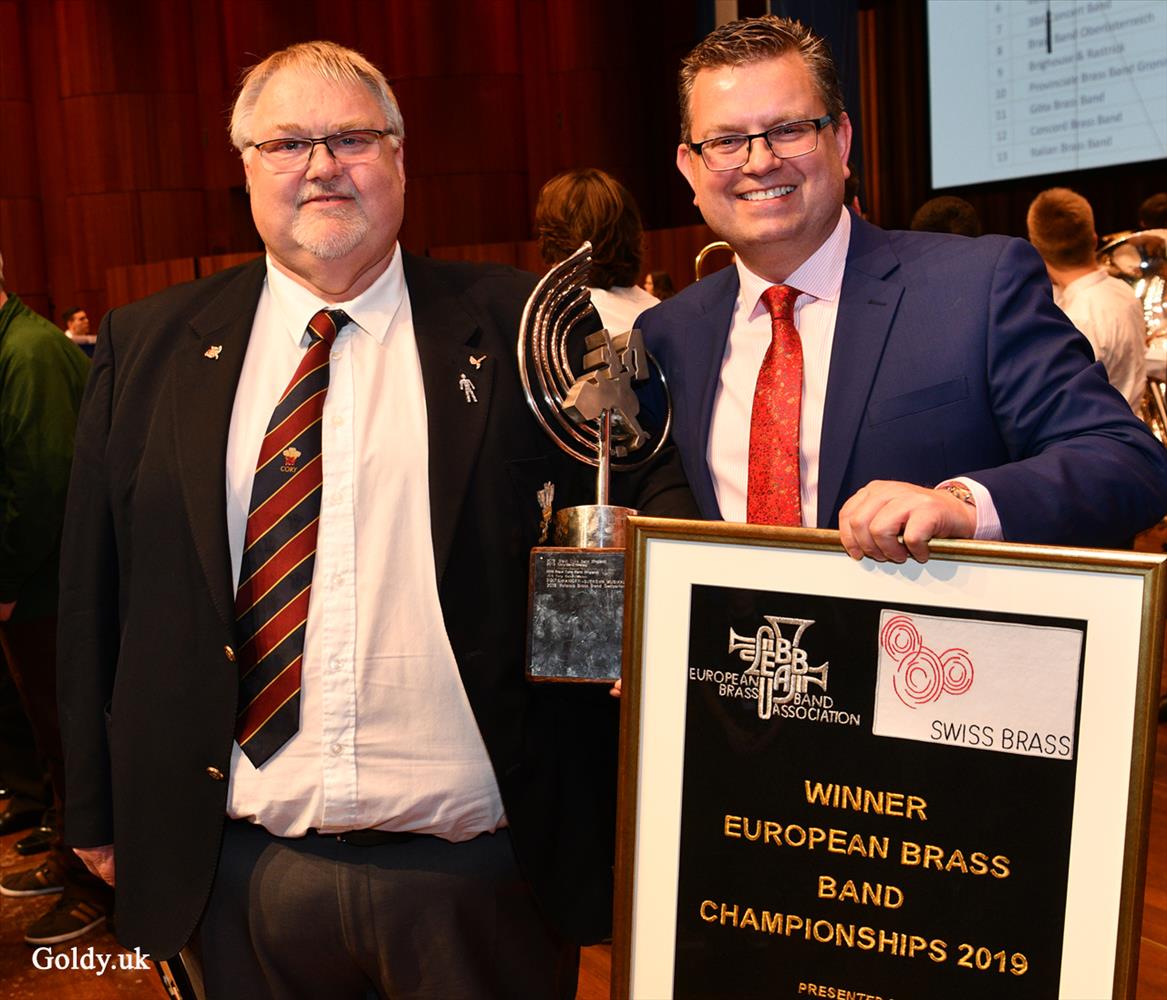
Champions — Cory Band (Philip Harper)
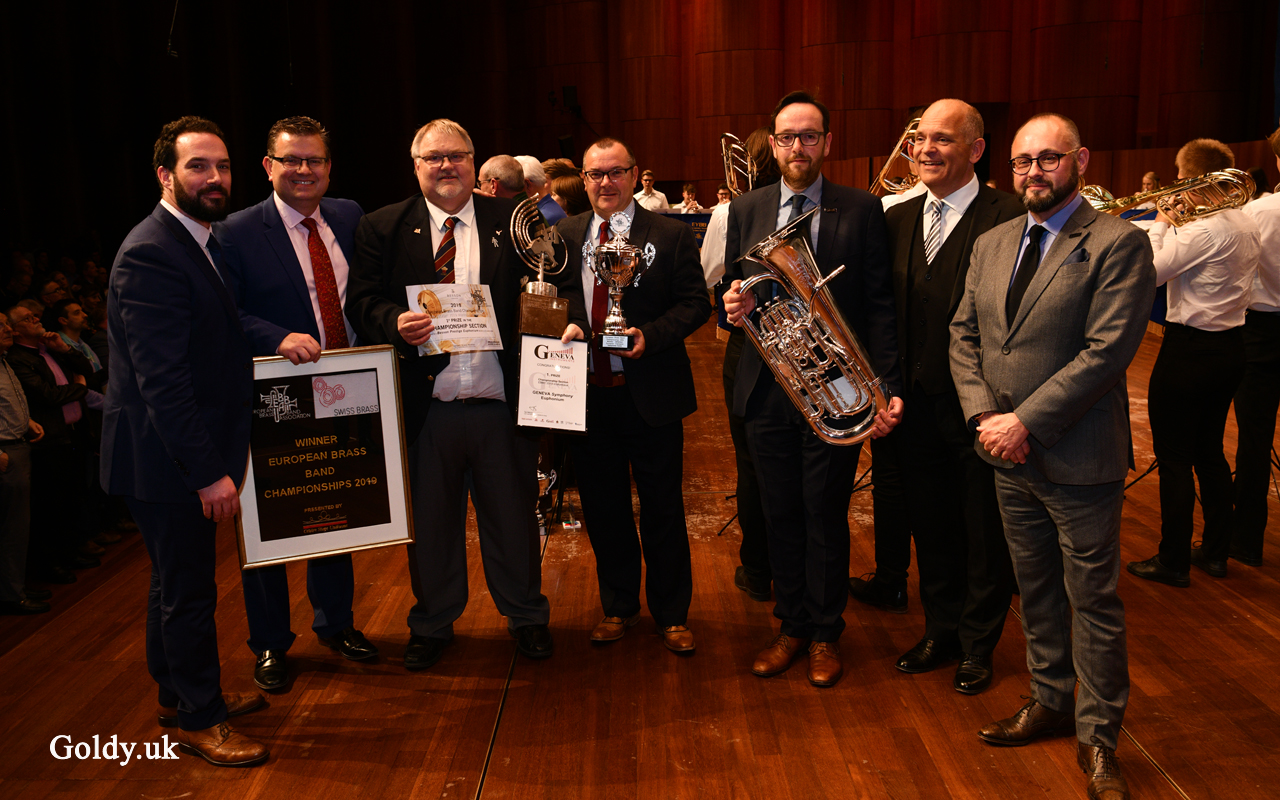
1st. Cory Band (Philip Harper)
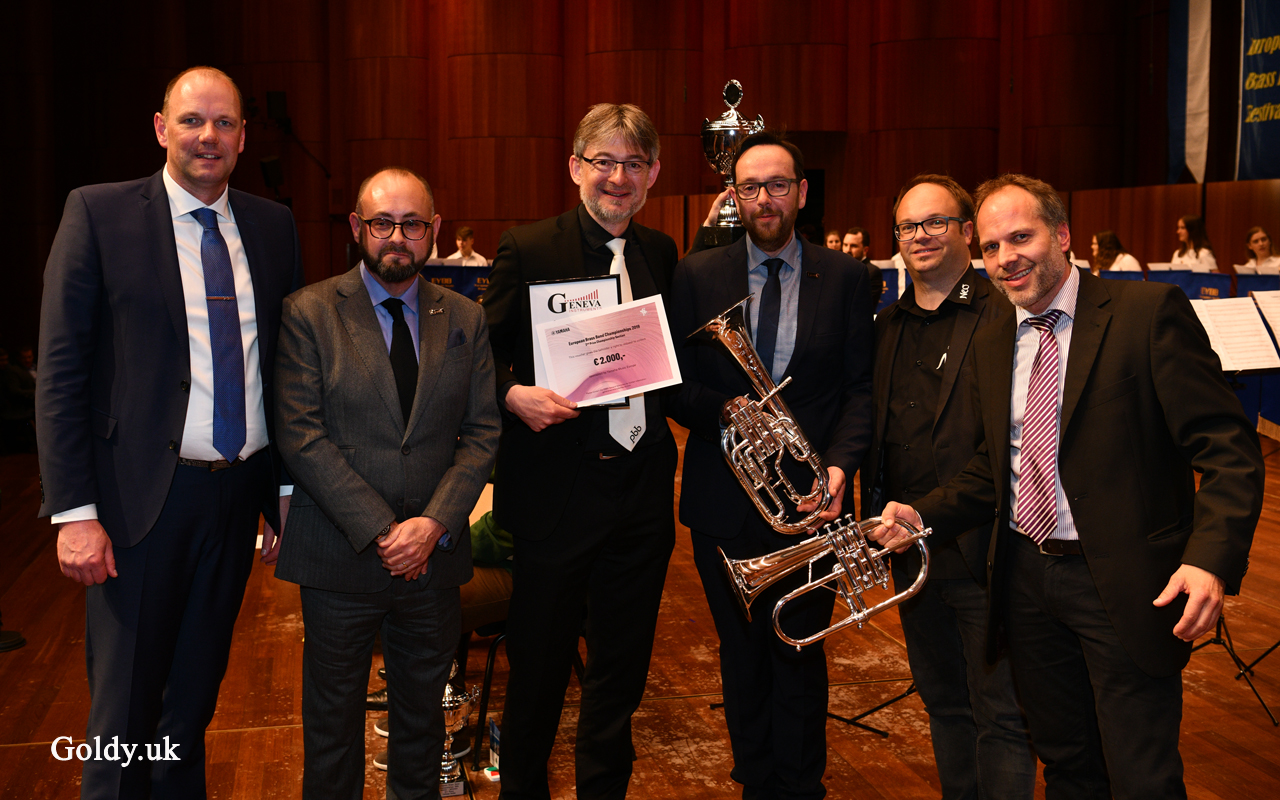
2nd. Paris Brass Band (Florent Didier)
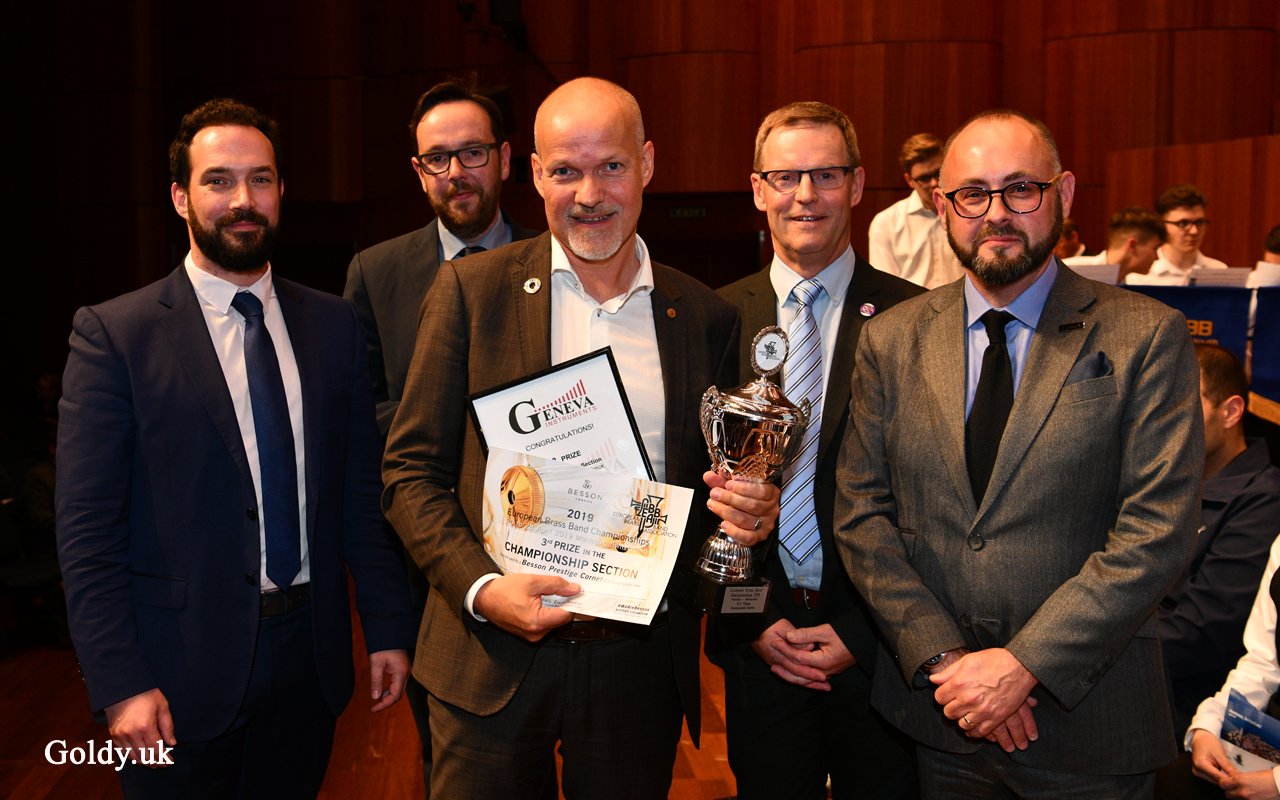
3rd. Eikanger-Bjorsvik Musikklag (Ingar Bergby)
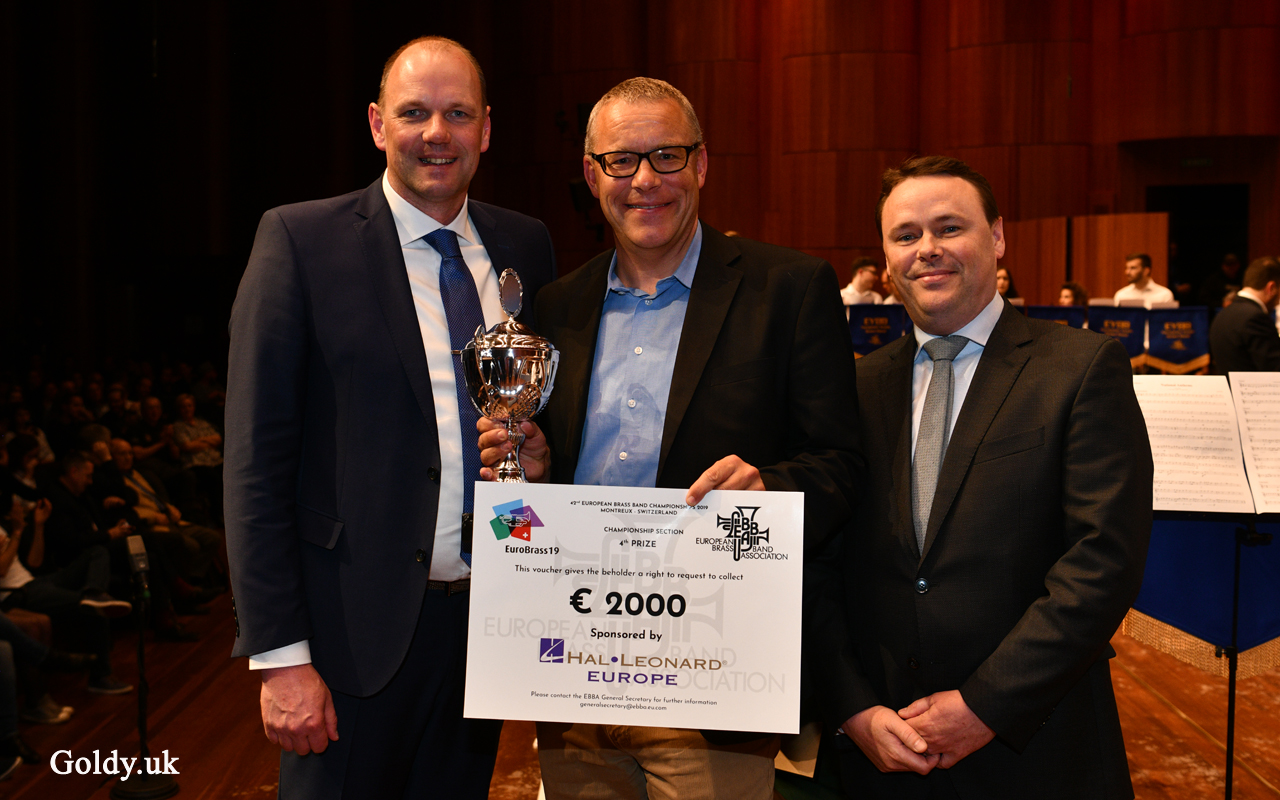
4th. Brass Band Burgermusik Luzern (Michael Bach)
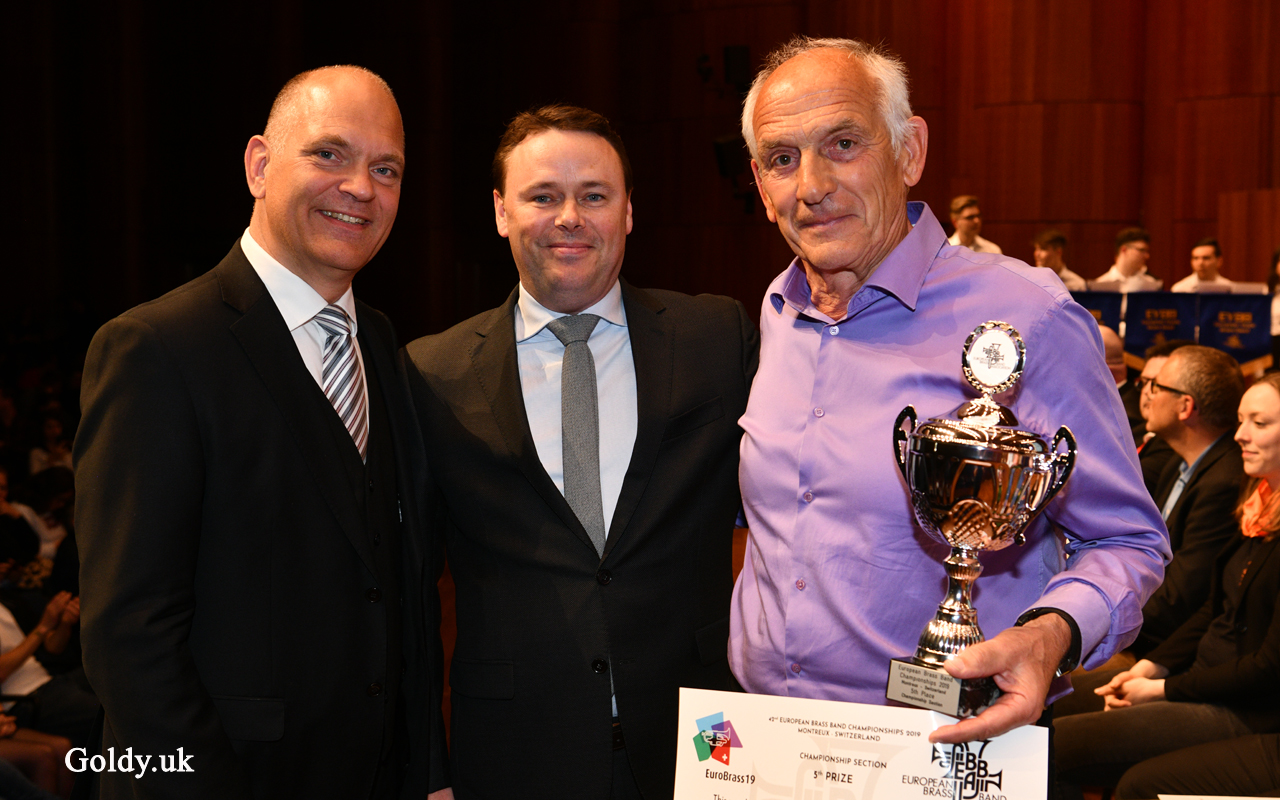
5th. Brass Band Willebroek (Frans Violet)
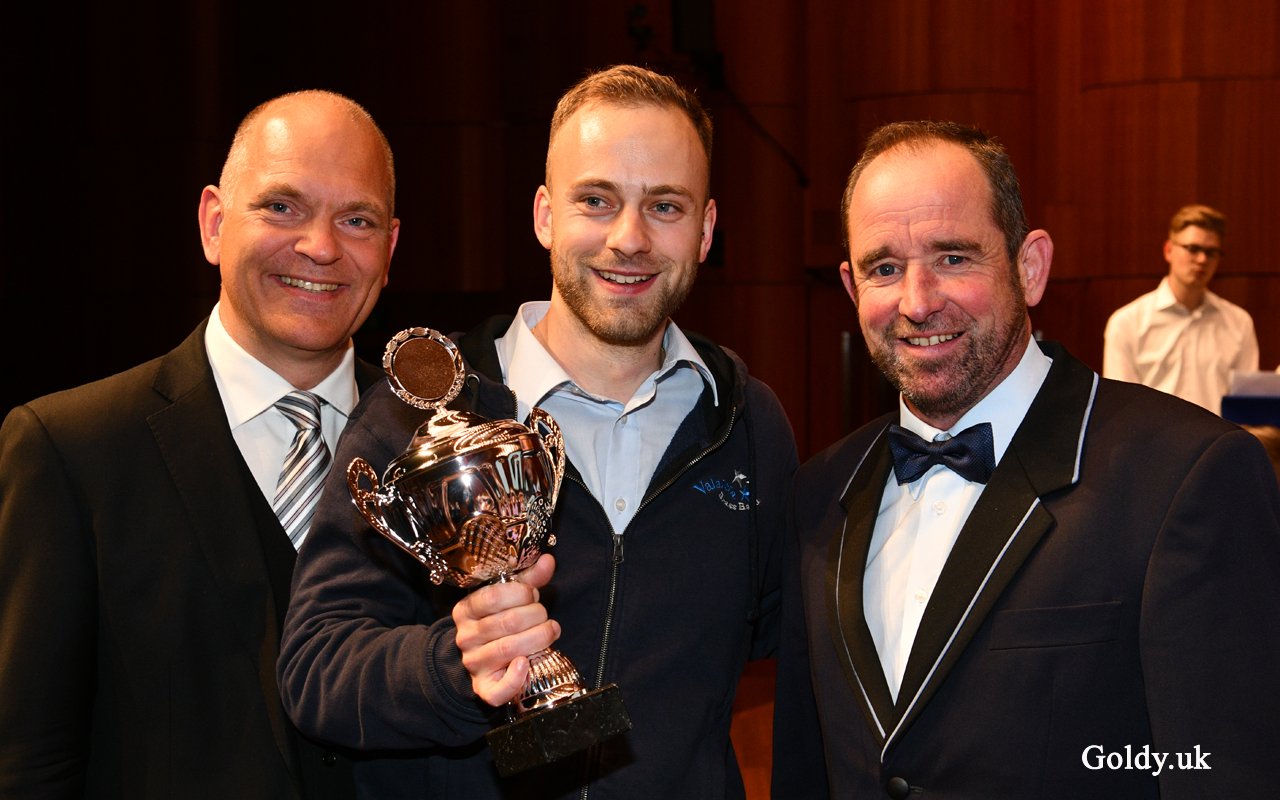
Best Soloist: Glenn Van Looy (euphonium) Valaisia Brass Band
Sunday 28, 01:09:24
Goodnight from Montreux...
That's for today — with congratulations going to Cory Band on their superb success and to Brass Band Regensburg on theirs too.
Up early in the morning for what promises to be a fantastic European Youth Championships.
Sunday 28, 01:06:42
Reactions...
No words required pic.twitter.com/37X9u9FklY
— Philip Harper (@philipharper1) April 27, 2019
Congratulations to @Coryband and conductor @philipharper1 on winning the EBBC 2019! #eurobrass19
— EBBA (@EBBC2019) April 27, 2019
Some soprano player! Another great performance from Brassband Oberösterreich #eurobrass19
— Harry Weir (@harrycomposer) April 27, 2019
10. Brass Band Oberosterreich (Ian Porthouse)
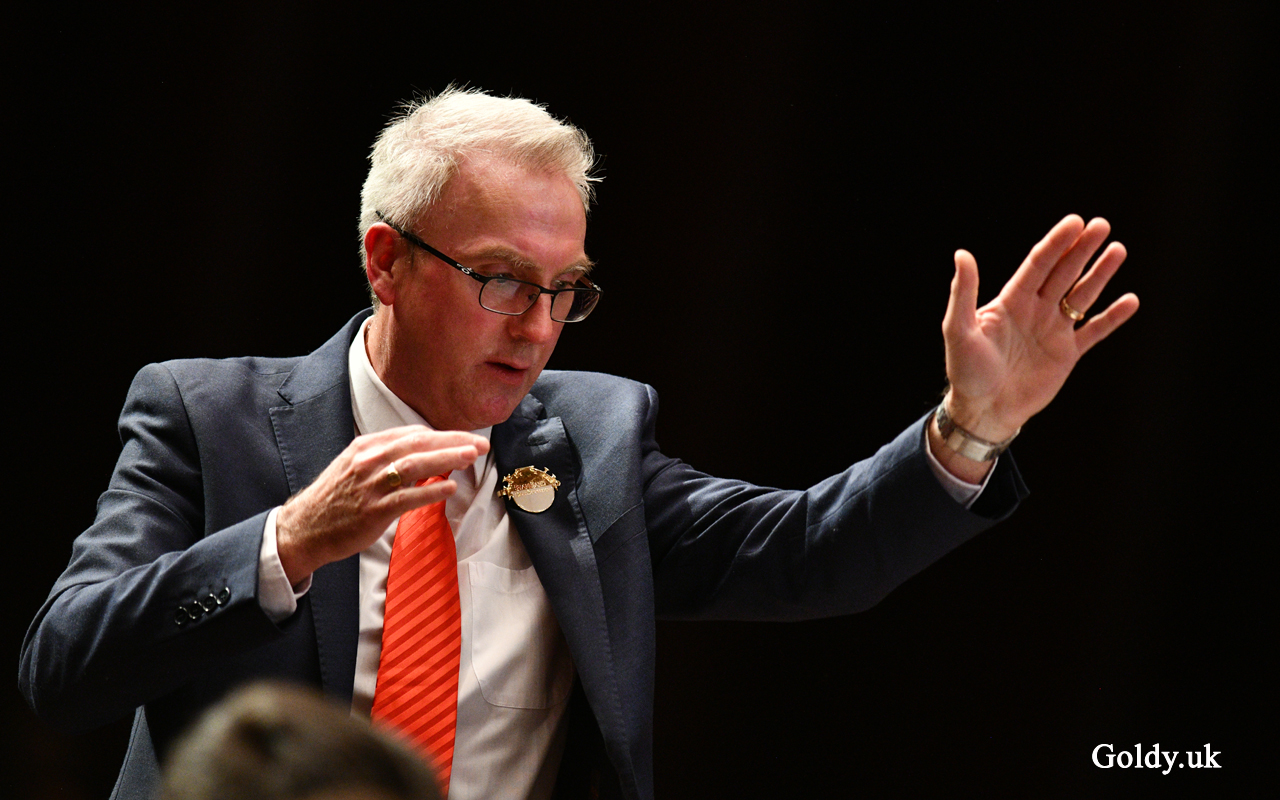
With the composer in the box, Jam van der Roost's From Ancient Times could be an inspired choice by the Austrians who will have high hopes after a quality account of Dear Cassandra yesterday.
The distantly evoked opening emerges through the mists of time effectively with fine trombones and such a well measured sense of cumulative energy and drama. Great work from the middle of the band and horns and there is authority and purpose about this that impresses.
What a fabulous solo cornet in the slow section and there is an aura about this that is so beautifully done. An atmosphere of not just ancient times but distant lands that intoxicate and beguile. Lovely
soprano too and the soloists are delivering in spades here. This is lovely stuff and the atmosphere so delicately evoked.
And out of it emerges a fine solo euphonium. As the band sings its hymn the impact of the final section is huge. We sense a big ending coming and sure enough, it doesn't disappoint.
Overall:
Oberösterreich is another band that has delivered consistency here in the Stravinski Hall. From Ancient Times proved to be a fine choice playing to the band's strengths and with such fine solo work all round.
Chris Thomas
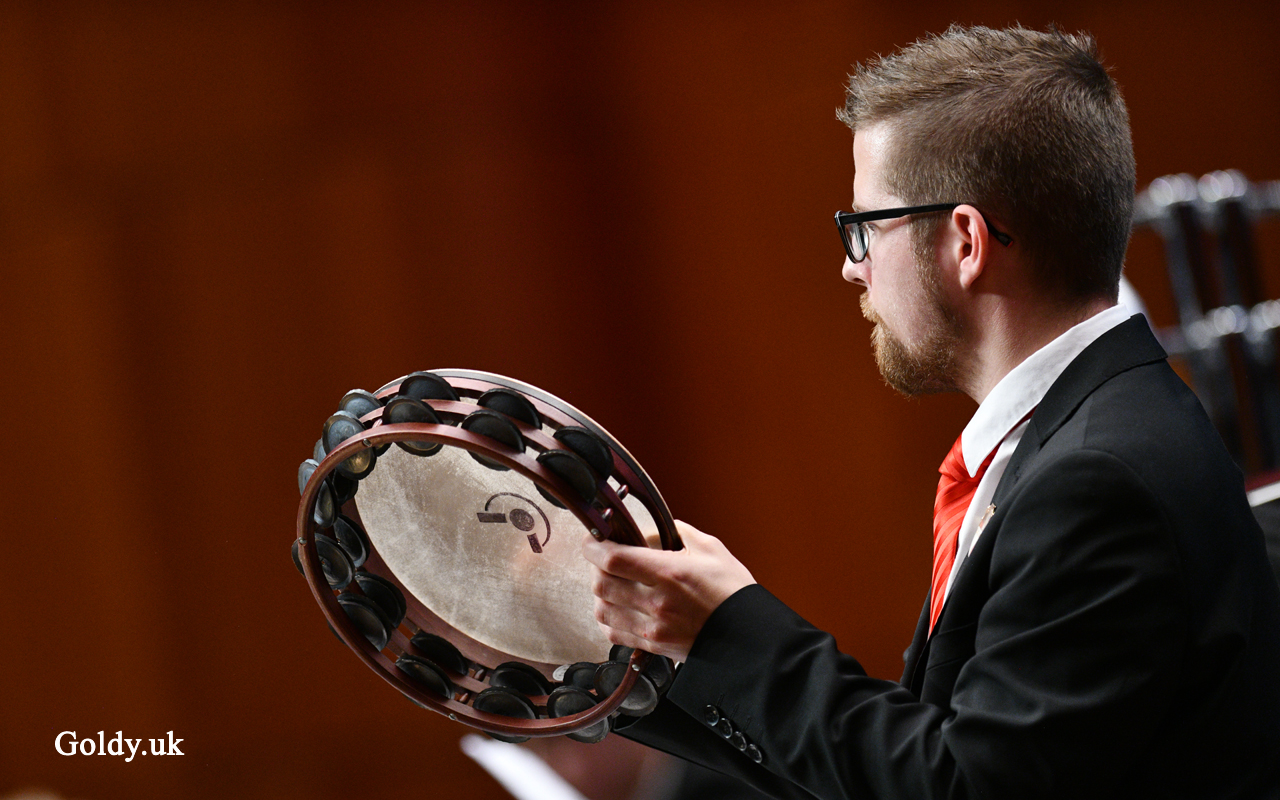
Wonderfully eerie opening to Ancient Times, great atmosphere. Baritone and euphonium duet is well-shaped. Basses sound excellent, and trombones are carefully-crafted. This is all very controlled stuff. Such warmth from euphoniums and baritones. The control continues with a trio of sliding trombones, before the music kicks up a gear. Trombones are so classy, and there's so much space here. Horn entries are so accurate. My goodness the precision is scary.
Some calm now, and flugel is so lyrical. Then the band lets rip with a recap of the opening moments. Trombones are equally superb here. This is excellent playing around the stands. Porthouse has the band under his spell. Precision and clarity abounds — I may have to use these words a few more times! What a climax.
The cadenzas commence with fine flugel, followed by inspired solo cornet. Horn is a little direct in horn/baritone duet, but this is confident playing. Luscious sounds emanate from around the stands — it's hard to single anyone out, but soprano is mesmerising.
The band switches to hymn mode, and the sounds are beautiful. Such stunning shape to this music. Everything sounds so effortless. Now to the home stretch, and Porthouse let's the band open up. What a glorious noise. Soprano once again amazes me.
This was utterly magnificent from the Austrians. I'm not sure I heard any mistakes — if I did they paled into insignificance against the backdrop of sheer quality. I didn't think anyone could challenge Eikanger, but Oberösterreich have come mightily close.
Chris Davies
Saturday 27, 15:44:52
Own Choice — Brass Band Oberosterreich (Ian Porthouse)
From Ancient Times (Jan Van der Roost)
'From Ancient Times' is inspired by the music of the Flemish polyphonists.
There are no literal quotes, but the composer uses historical composition techniques to evoke the genius of the likes of Orlandus Lassus, Josquin Desprez, Adriaan Willaert, Johannes Ockeghem, Jacob Obrecht, Heinrich Isaac, Guilaume Dufay and Philippus de Monte, as well as the artistic inspirations the great painters, Rubens, Van Dijck, Breughel and Van Eyck.
The piece also goes back further in time; referencing Gregorian chant and an estampie medieval dance, whilst a modern twist is found in the cipher ostinato references based on the notes 'EBBA' and the first chord of the estampie-theme based on the notes of 'VLAMO' (the organising organisation who commissioned the work).
The music develops through further senza misura cadenzas and an ethereal homage to Adolphe Sax before moving towards a grandiose finale to be played 'like an organ'.
All this is encapsulated within a contemporary structure that places huge demands on the ensemble and soloists alike — starting mysteriously but ending in glory — from ancient to modern in one huge arc of musicality.
Iwan Fox
Saturday 27, 15:44:18
9. Gota Brass Band (Michael Thomson)
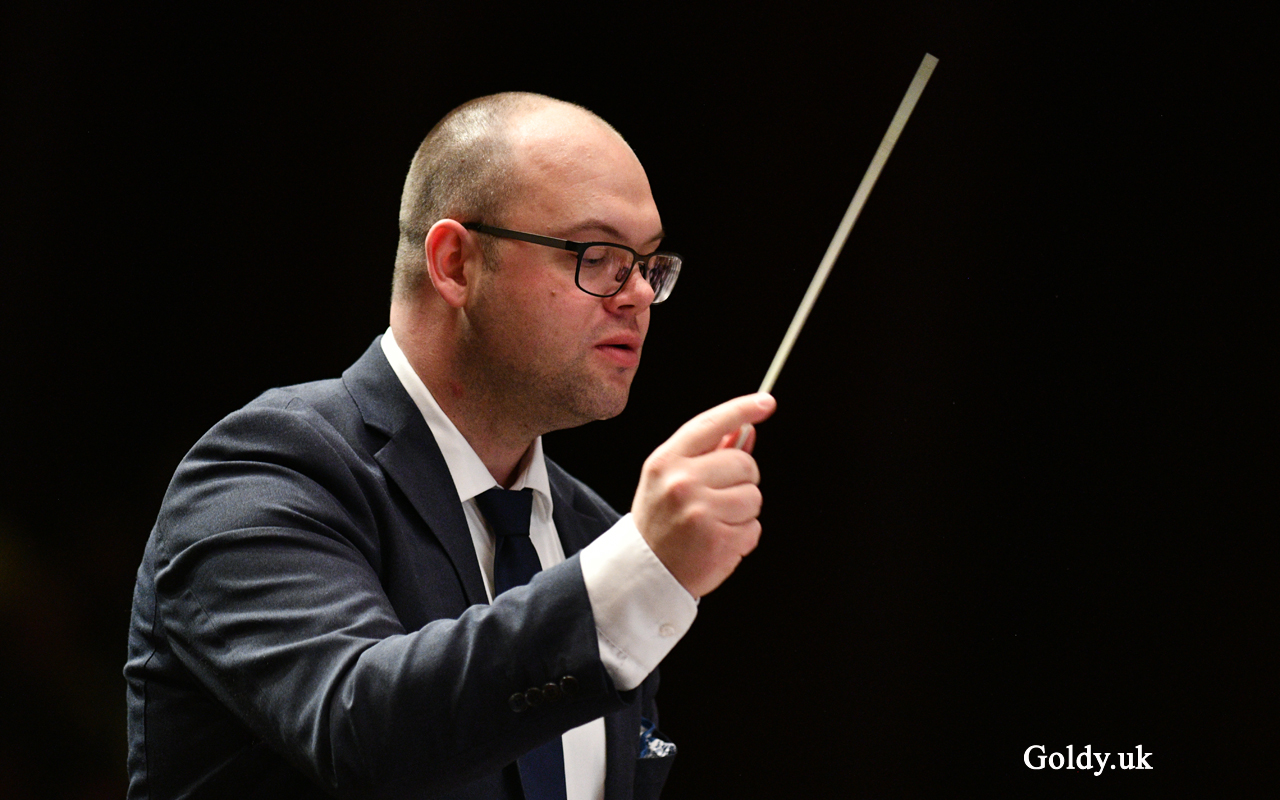
Gota are the second band today to give us Peter Graham's The 39th Parallel whilst hoping to build on a decent showing on Dear Cassandra.
The luminous opening is well captured and this immediately settles into a haunting atmosphere before the dramatic scenery of New Zealand begins to inform the musical picture. This is engaging
stuff and both the inner detail and musical images are painted with care and technical accuracy.
The Lament is evocatively done and we can sense both the affection and the scenery that was so important to the dedicatee of the work.
The 'disrupted march' is effective and the transition into the final reprise is deftly done leading to a conclusion of affirmation.
Overall:
A fine effort from Gota. It tired towards the end but musically so well informed.
Chris Thomas
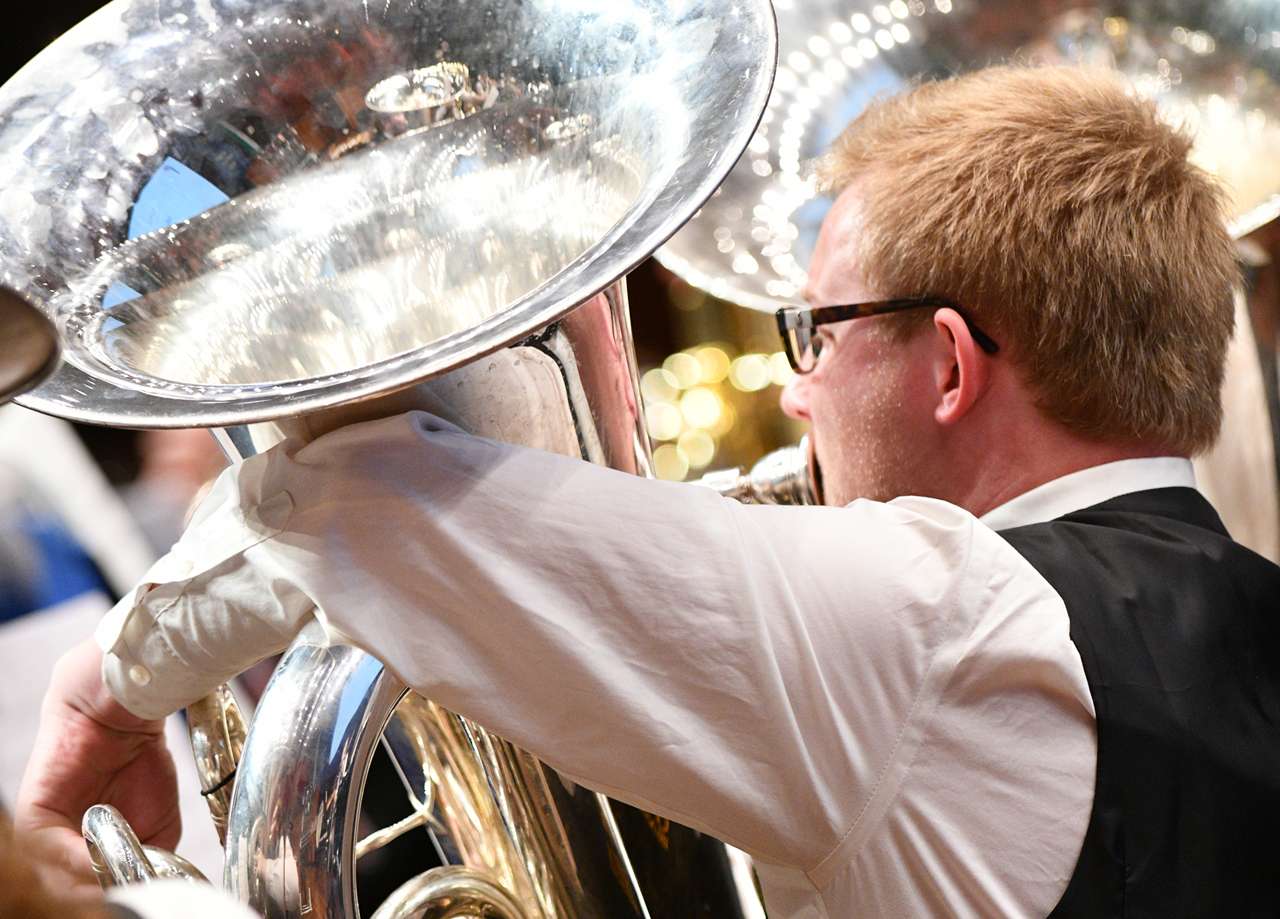
Opening build-up is effective as Gota treats us to the second rendition of The 39th Parallel today. The band is restrained — something is being kept in reserve here. Euphonium and sop high notes impress. The band tuttis are excellent, and that reserve is released. Wonderful bass-driven sound. Some very tidy playing here. That low end sound is wonderful. Some terrific percussion playing here too. Cornet carillon has a few errors, and the final chord isn't quite in tune. Voluptuous tuba sets the scene for solo cornet and flugel who both shine.
Poignant reflection now, and the warmth coming from the inner band is heavenly. The dynamic range on offer is truly impressive, with the band getting down to the lowest dynamics. This has huge impact. Offstage band could have been further away for effect rather than trust the back of the stage. The music gets into its groove, and the technique begins to sparkle.
Full band hymn is restrained, and there are occasional blips. Final moments aren't perhaps as rousing as they might have been, and the final chord is somewhat marred by a split or two. A decent account from Gota nonetheless.
Chris Davies
Saturday 27, 15:38:18
There is a new presenter in town...
Guess the 4BR intruder....! #Eurobrass19 @WorldofSoundUK @EBBC2019 pic.twitter.com/kLCgIrFkNA
— 4barsrest.com (@4barsrest) April 27, 2019
Saturday 27, 15:19:57
Own Choice — Gota Brass Band (Michael Thomson)
The 39th Parallel (Peter Graham)
Peter Graham's 'The 39th Parallel', was commissioned by the Brass Band Association of New Zealand, in memory of the late Kevin Jarrett, with funds from a variety of sources. It was first performed in competition by the National Band of New Zealand at the World Music Contest in Kerkrade in 2017.
It is inspired by the 39th Parallel (South) in which lies the New Zealand district of Whanganui and at its heart, the Whanganui river — Te Awa Tupua.
The work is cast in two parts — the first an evocation of the course of the river from Mount Tongariro to the sea.
This is constructed according to the mathematical principals of the 'golden ratio', which runs in parallel with a sequence of metrical modulations that gradually increase the tempo of the music, mirroring the course of the flow of the river.
It is followed by the elegiac Apakura (meaning 'lament' in the Maori language) which develops the theme hinted at in the opening section but which is now fully realised.
It is a homage to the late Kevin Jarrett — a towering figure in New Zealand brass banding, who for many years lived and worked in Whanganui.
It includes references to music which formed a significant part of his life; as part of the New Zealand Army Band musician (echoes of the Urbach march 'Through Bolts and Bars') and his long association with the National Band of New Zealand (hints of Goffin's 'Rhapsody in Brass') before ending with optimism and triumph with a reprise of the major thematic material.
Iwan Fox
Saturday 27, 15:14:47
Really enjoyed that performance by @ProvBBGroningen! #eurobrass19
— Glenn S. (@glenns_music) April 27, 2019
8. Provinciale Brass Band Groningen (Richard Visser)
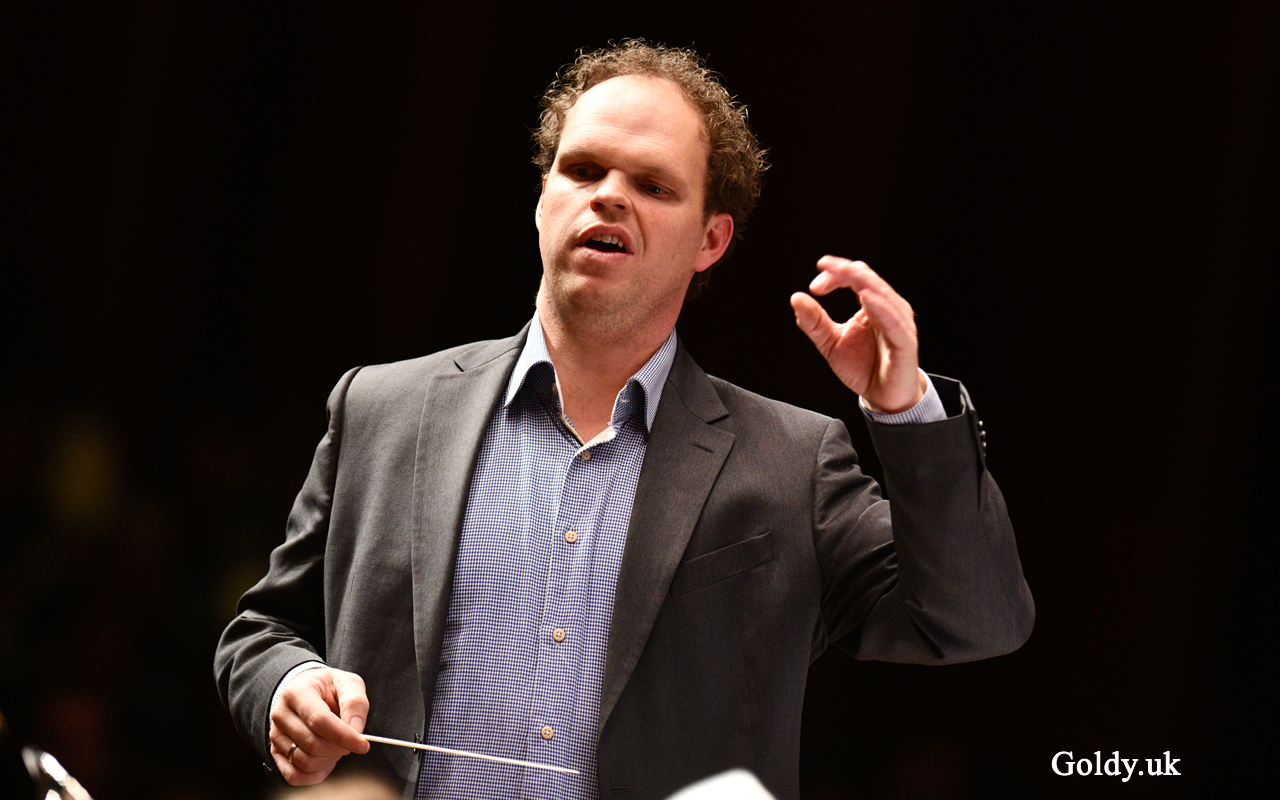
The opening movement has a somewhat academic feel about it. Everything is in the right place yet it doesn't quite ignite..it just needs a little more drive and edge of the seat excitement.
What a fine and fruity bass trombone sound in the middle movement. This is great stuff…so much so that we wonder whether the piece has been chosen with the bass trombone player in mind. But
somehow, it's hard to get excited about this.
The dynamics are a touch one dimensional and we are missing contrasts of colour and subtlety.
The final movement opens with much more authority about it and drives onward with purpose and power. This is what we needed to hear earlier on and suddenly it has come to life with so much
more stature and character in the closing bars.
Overall:
A curious one was this. There was nothing greatly wrong with the playing but somehow we found our attention wondering when we really wanted to be engaged and drawn in.
Chris Thomas
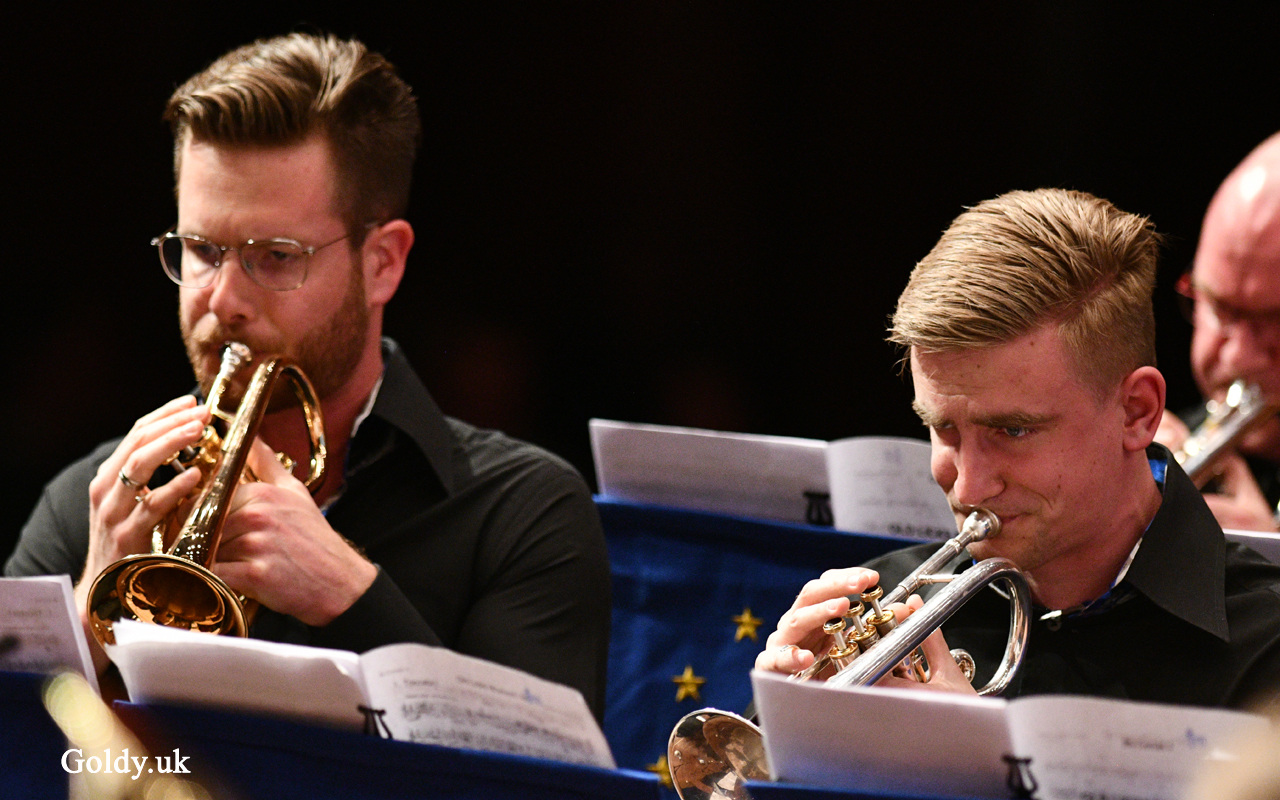
Showstopping opening moments that arrest the listener who is then bombarded with a wall of train-like sound. Soprano is impressive. Some super moments of ensemble playing, with the full band involved accompanied by understated whip. Monstrous sounds here. Delicate horns round things off in style.
We move on. Trombones are mice, and a rare bass trombone solo is delivered with conviction and a suitable level of bluesy nonchalance. The trio works well. Solo cornet follows with minor blips, and the texture feels nicely cooked with muted and open sounds enmeshing seamlessly. This is a lovely touch. That bass trombone is back, only he has flugel for company. Could this be a bit more 'bluesed up' perhaps? The character is almost there, but something is missing. Everything is being played at comfortable dynamics now — more variety would be helpful. That said, solo trombone is outstanding.
Basses are marvellous as they deliver a polished quartet (well, quintet....). We get more dynamic breadth now, and marimba is allowed to shine. Today is the day of the marimba. Things open up, and we are treated to a blockbuster band sound and impressive rhythmic control. A rare moment of exhilaration. Marimba continues to shine as does an scurrying band. The finale has more on offer than the entire middle third, and the band puts on a fine show.
This was a tough one for me. I could appreciate the fine playing across most of the performance, but I felt huge swathes of the piece offered little in the way of the sorts of challenges the band needed to make a serious impression. Is this a case of the wrong piece played well? Only time will tell..
Chris Davies
Saturday 27, 14:43:41
Own Choice — Provinciale Brass Band Groningen (Richard Visser)
Old Licks Bluesed Up (Torstein Aagaard-Nilsen)
'Old Licks Bluesed Up' was commissioned by Manger Musikklag in 2010 (revised in 2011) with support from the Norwegian Composer's Fund and is dedicated to conductor Peter S. Szilvay.
The piece is constructed in three movements; 1. 'Toccata I'; 2. 'Ritornell'; 3. 'Toccata II'.
The title itself gives clues of how the piece can be understood.
The words 'old' and the name of the movements connect the performer and listener to the past.
The descriptive idiom of the verb 'licks' comes from the musical styles found in blues, rock and jazz; arpeggio-figures, scales and riffs that are regularly used in improvisations.
'Toccata' is a well known musical genre from baroque keyboard music, a free flowing piece filled with energy, whilst the 'ritornell' ('little return' in Italian) can be described as a refrain; a reoccurring theme evoking the form of a returning musical passage derived from madrigals also of the baroque.
As the composer states: 'I have used licks inspired by both old masters and not so old masters, but no quotations!
They're all mine. Enjoy!'
Iwan Fox
Saturday 27, 14:42:51
Italian Brass Band ups the game from yesterday. A very committed performance. Give them some years, the speed of improvement they've shown is ridiculous. Bravo!#ebbc2019 #eurobrass19
Matt Ryan (@MattiRaz) April 27, 2019
7. Italian Brass Band (Filippo Cangiamila)
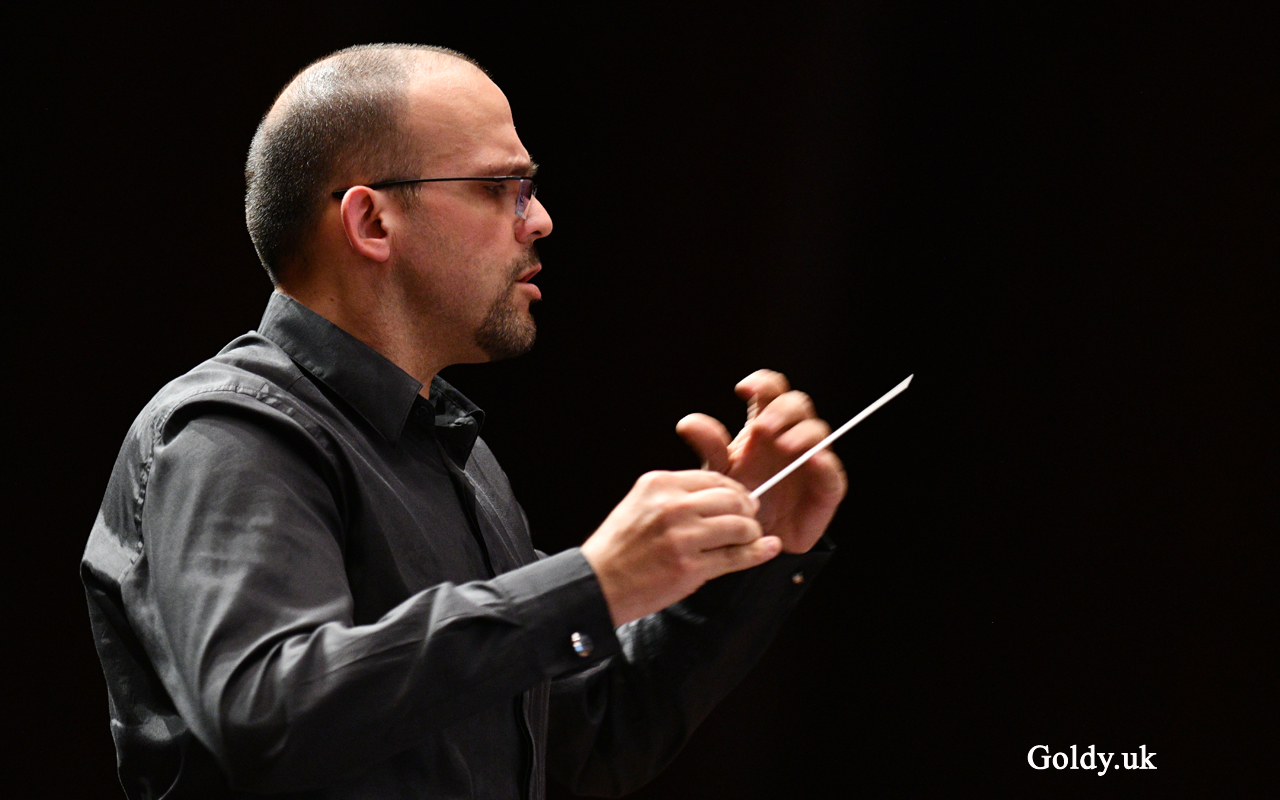
It's great to hear Extreme Make-Over again, especially in the hands of Elite Section debutantes the Italian Brass Band.
The opening is beautifully shaped and moulded by the MD and although there are one or two moments of insecurity, there is so much passion and affection in the way the phrases and melodic
lines are shaped.
The figure of Tchaikovsky looms large over the band and the detail and verve of the playing impresses. It's powerful stuff until the bottles bring a new direction to the music. This is really gripping and although not faultless, the sheer uplifting joy and energy of the playing sounds
celebratory in terms of the long awaited arrival of the Italians in the upper echelons of the competition.
And what a great ending! The audience has really taken this band to its collective heart and there
are players on the stage visibly in tears of emotion. Bravo!!!
Overall:
Music making of such endearing energy and commitment from the Italians. This was gripping from start to finish and what a huge ending!!
Chris Thomas
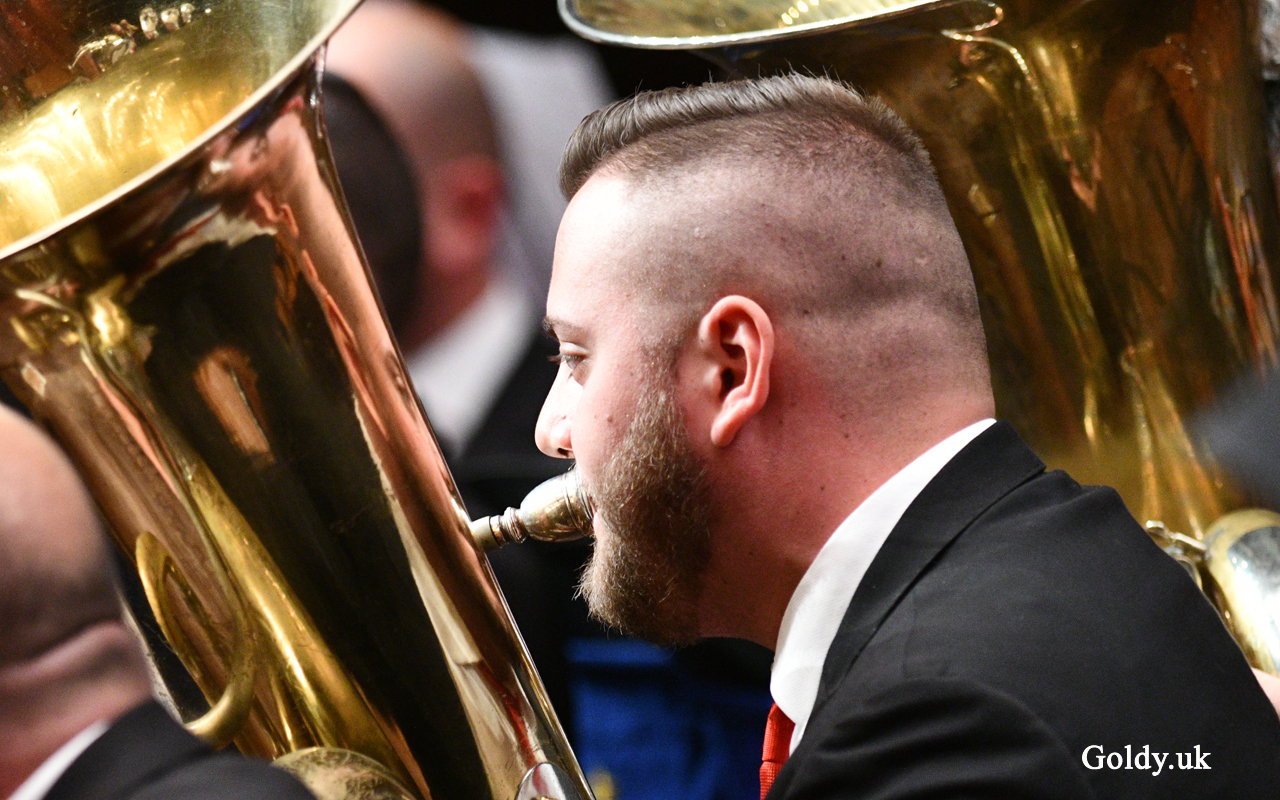
Solo cornet is on top form as he cooly dispatches the opening solo, though answering euphonium has some problems with intonation. Muted sounds aren't always comfortable, with suspect intonation, but the climactic exclamations of the opening section swell to dramatic heights. Intonation settles down a little, and bass trombone and soprano spearhead a thrilling climactic moment — what a noise from both of them!
Bass quartet is superb. Following trombone trio starts well, but poor intonation plagues this and the joining cornets. Nice exchanges between euphonium and cornet, and the band opens up with a tremendous, thrilling channel of sound. This is great. Intonation problems in trombones continue to be an unwelcome visitors. Tutti band scurrying is impressive, but balance with percussion is occasionally out. Back row cornets come through like laser beams.
Bottles work well, though the ensemble needs a few moments to settle. Marimba solo is excellent, supported by a breathy chorus of bottles. The effects are tremendous. Percussion and bottle blowers on fine form. Neat basses and euphoniums start scurrying around setting the whole band in motion. It's s touch frantic, and this leads to a few slips. The 1812 is evoked with a rich, full-bodied sounds that lifts the roof off. What a fantastic sound these guys make.
A thoroughly committed account from the Italians, with flashes of brilliance (particularly the marimba player, whose colleagues embraced him during the applause — thoroughly deserved). The intonation problems are likely to come back to haunt them, as are the moments of ensemble insecurity, but this was a thoroughly enjoyable performance to listen to.
Chris Davies
Saturday 27, 14:16:20
Own Choice — Italian Brass Band (Filippo Cangiamila)
Extreme Make-Over (Johan de Meij)
'Extreme Make-Over' is inspired by a number of musical references from Russian composer Tchaikovsky; most notably the Andante Cantabile from the second movement of his String Quartet No 1 in D, Opus 11, written in 1871.
It was music that brought tears to the eyes of Tolstoy when he heard it played in 1876.
It is structured into a number of clearly defined sections, although not in variation form.
This theme is introduced by a brass quartet consisting of two cornets, horn and euphonium, before a series of metamorphoses are created from the neo classical to Indonesian gamelan.
There are fleeting references to the Fourth and Sixth Symphonies and the fantasy overture 'Romeo & Juliet' to ten 'hoketus' tuned bottles played by members of the cornet section.
This initial fragility builds in intensity and virtuosity to lead into the finale; a fevered canonic treatment of the theme that hurtles towards its triumphant conclusion.
Iwan Fox
Saturday 27, 14:15:24
Willebroek fans...
Say it quietly Willebroek could be in with a shot after that. Well balanced, well executed and lots of energy. I liked that... Frans Violet is an experience to watch too! Hands everywhere including a lovely rub of his tummy. #eurobrass19 #ebbc2019
Matt Ryan (@MattiRaz) April 27, 2019
6. Brass Band Willebroek (Frans Violet)
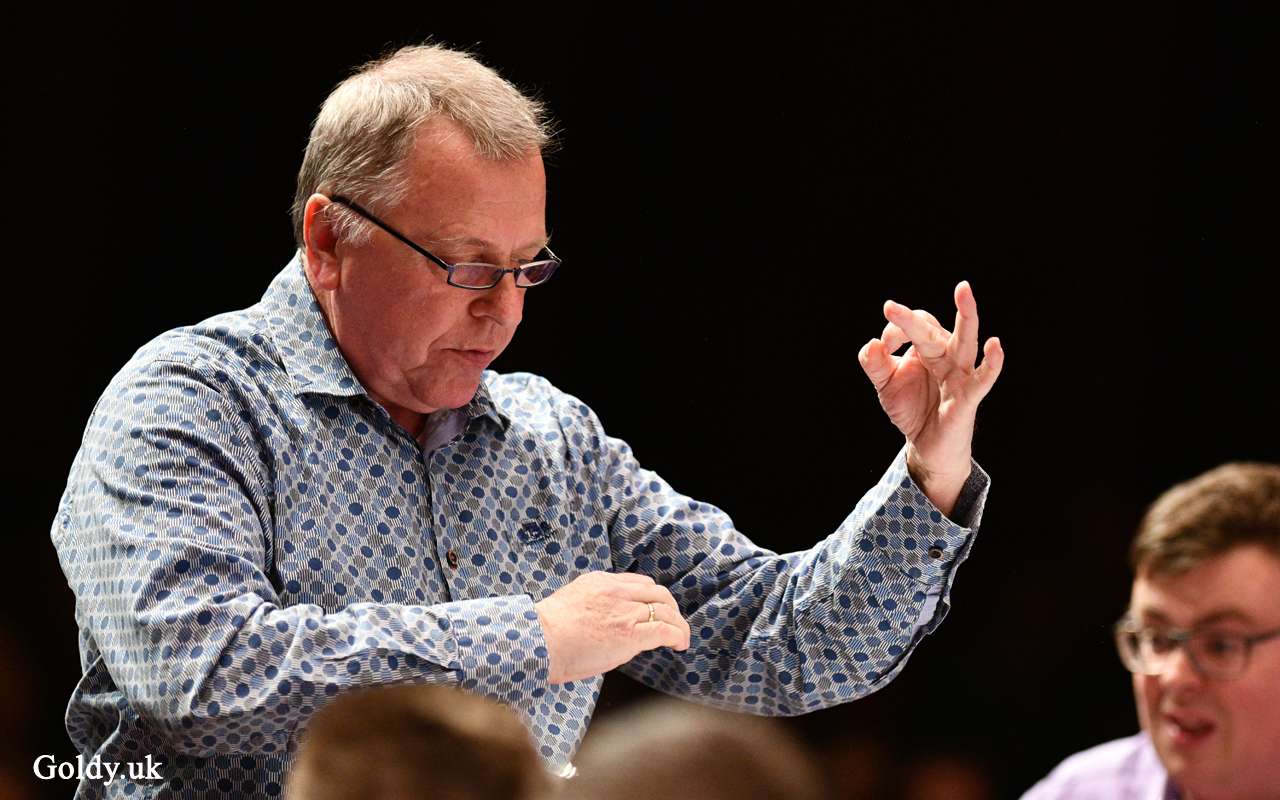
For a piece that takes as its starting point the breaking of the sound barrier, the opening movement is appropriately adrenalin fuelled, as well as jazz fuelled as the music flies by in a stream of bluesy
consciousness.
It's an adventurous choice of piece and perhaps not everyone's cup of tea but after the rhythmic exertions of the opening, which were made to sound far easier than they are by Willebroek, the stillness and subtly shifting textures of the movement that follows forms a striking
contrast.
It's beautifully done with so many contrasts of light, shade and instrumental colour with every section and instrument playing its part, including vital parts for a percussion section of six players.
The final movement is a technical tour de force and is played with bravura and at times stunning facility. Whether it has enhanced Willebroek's position from the previous day however could be a
matter of opinion.
Overall:
A brave choice of piece given that it is unfamiliar to the audience and probably the judges too but played with such gusto, clarity and energy by Willebroek.
Chris Thomas
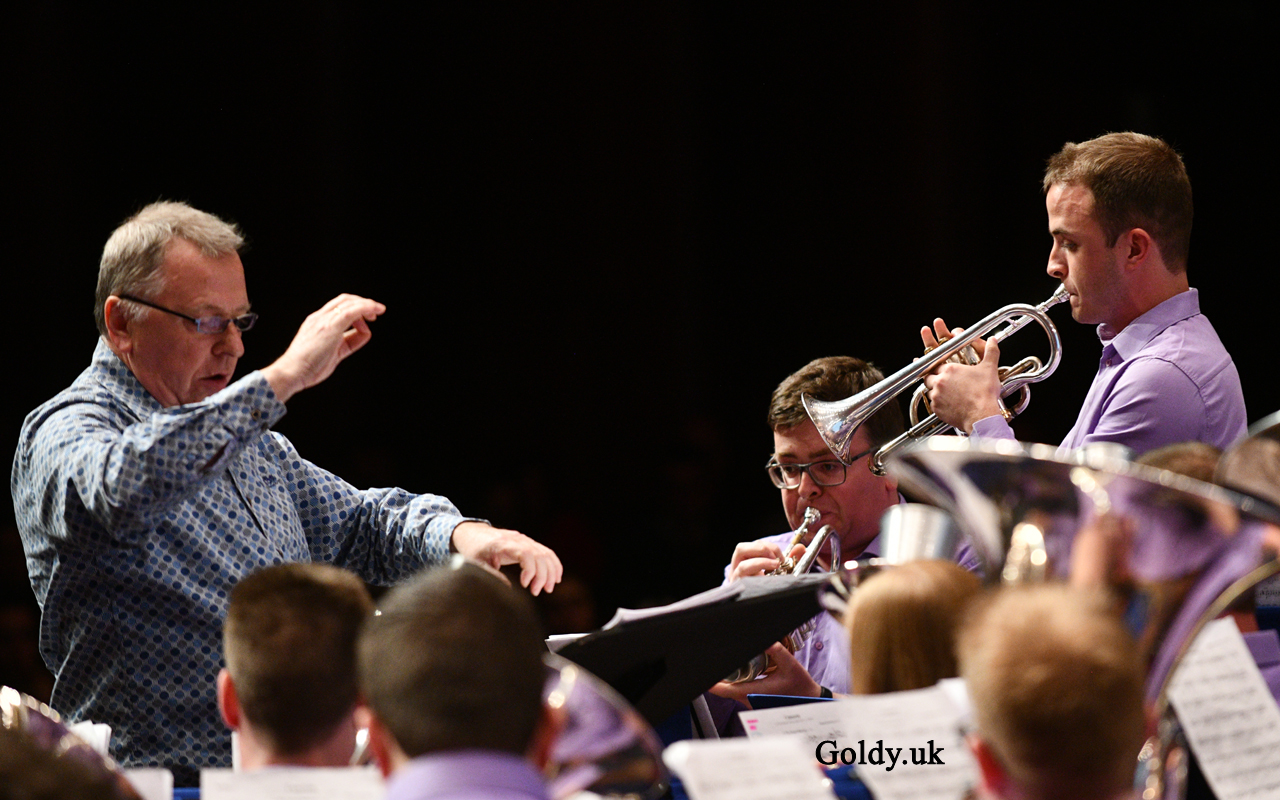
Vibrant opening. Tight ensemble, loads of detail. Solo cornet is in the groove and sounding superb. Euphonium and flugel work well together. Some fabulous unison playing — tight as you like. The opening rambunctiousness is closed cooly and precisely. A real statement of intent right from the get go. Reflective territory now and the band and soloists do well — hats off to sop. A few gremlins creep into isolated lines, but the band soon rediscovers its confidence.
We're off and rolling. Tremendous energy, but there are isolated moments of insecurity in the ensemble (but these are very minor). Euphoniums and trombones are so warm, and the movement ends in well-crafted poignancy. Horn and flugel work nicely together, and haunting vibraphone provides a lovely accompaniment. Horn is really singing here.
Fanfares erupt and the balance between answering choruses is just right. This is another one of those pieces that needs players to change their mentality from moment to moment — the band gets this. Movement two ends with a hint of quiet magic. I've got a warm, fuzzy feeling, and that's not the Swiss coffee talking.
Finale takes off with such rhythmic character, and baritone and both euphoniums stand up to delight the audience with some fine solo playing. I'd like a touch more detail from inner band as things move on, and 100% ensemble accuracy (not 98%!). The piece reaches a somewhat unexpected, frenzied conclusion, rounding off a fine performance. That should put Willebroek in the running.
Chris Davies
Saturday 27, 14:03:06
Own Choice — Brass Band Willebroek (Frans Violet)
Concerto for Brass Band (Roland Szentpali)
'Concerto for Brass Band' was written in 2019 by the Hungarian composer and tuba virtuoso, Roland Szentpali.
It is inspired by the feelings of adventure, danger, surreal physicality and potential disaster that drive those that seek to break through different analogical versions of the sound barrier.
The four movements chart no narrative progression, but evoke notions, inklings, observations and encounters — artistic, physical and metaphorical; from the opening 'The Sound Barrier' and following 'Hallucinations' and 'Cosmic Levitation' to the 'Nightmare and Chorale' finale.
It is a work of vivid, febrile imagination that charts elements of musicality from contemporary jazz and technical virtuosity to languid beauty and evocative textures.
Iwan Fox
Saturday 27, 13:58:19
Hats off
Massive hats off to everyone at @4barsrest and @WorldOfBrass for the live stream, fantastic coverage (and alot cheaper than a flight to Montreux)! Eikanger leading for me so far, with Luzern in 2nd place. #eurobrass19 #EBBC2019
— Wilson Taylor (@WilsonT189) April 27, 2019
Saturday 27, 13:55:39
Stonking...
Hmmm.... a curate’s egg of a Concerto Grosso. @ebml are a truly STONKING BAND and it was powerhouse. But heavy tempos and a bit meandering in the middle; the rhumba could have rhumba-d a little faster for me. Ingar knows how to milk the crowd bestest. #EBBC2019 #eurobrass19
— Matt Ryan (@MattiRaz) April 27, 2019
Saturday 27, 13:46:51
5. Concord Brass Band (Jesper Juul Windahl)
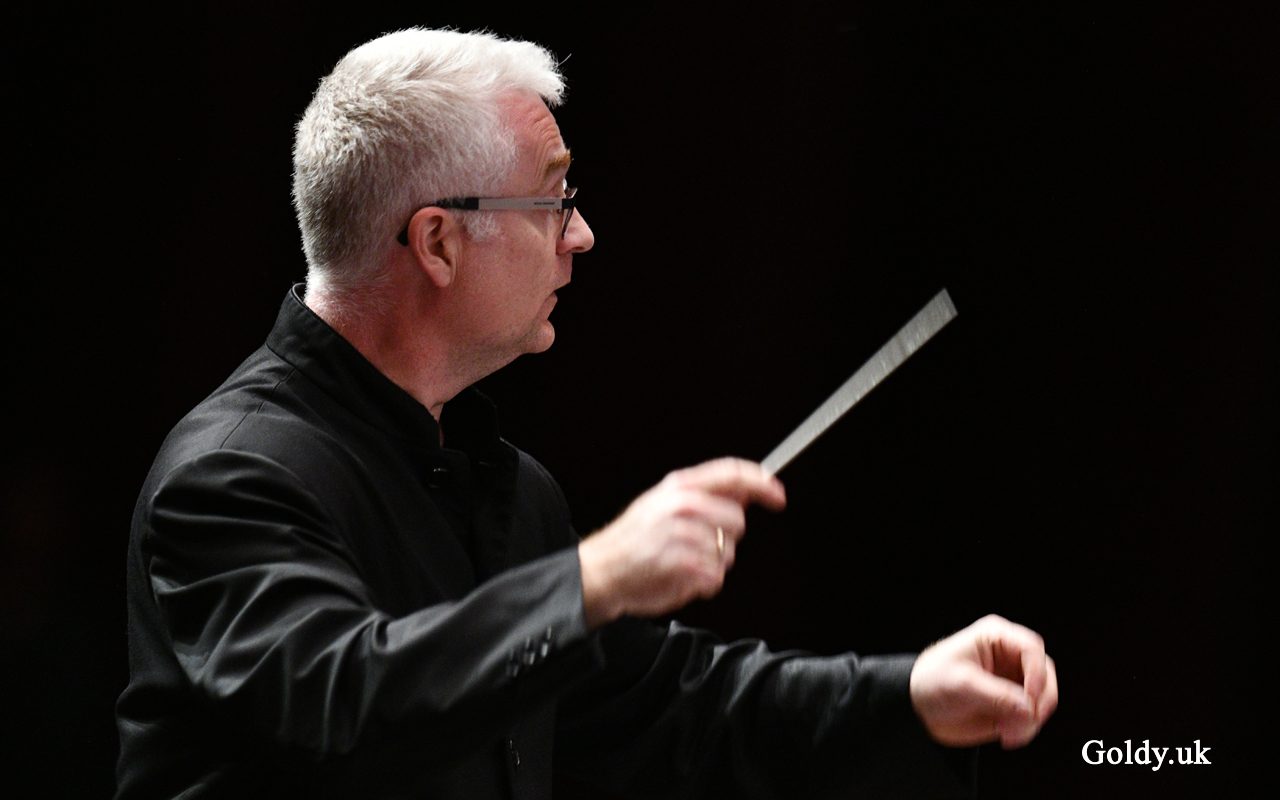
Musical variety is what the own choice leg is all about and from Derek Bourgeois, we find ourselves in the realm of Alexander Comitas and his delightful, life affirming Vita Aeterna Variations.
The emotional warmth of the music is brought through from the start as the opening paves the way with playing of warmth and lyrical empathy. There are fleeting moments of insecurity although there
are also some lovely touches from the soloists.
One or two lapses start to creep in and there are some uncomfortable moments (soprano) as the soloists are exposed one by one. The warmth of expression always remains intact but as the variations pass by, those little niggles and slips start to become more prevalent and troublesome. It's a shame and we can sense that heads are starting to go down to some degree.
The fugue is scrappy both rhythmically and in terms of individual entries and despite a positive ending, this has been an inconsistent performance from the Danes.
Overall:
A performance of emotional warmth but one that was also troubled by moments of insecurity, particularly during the many exposed solos that abound.
Chris Thomas
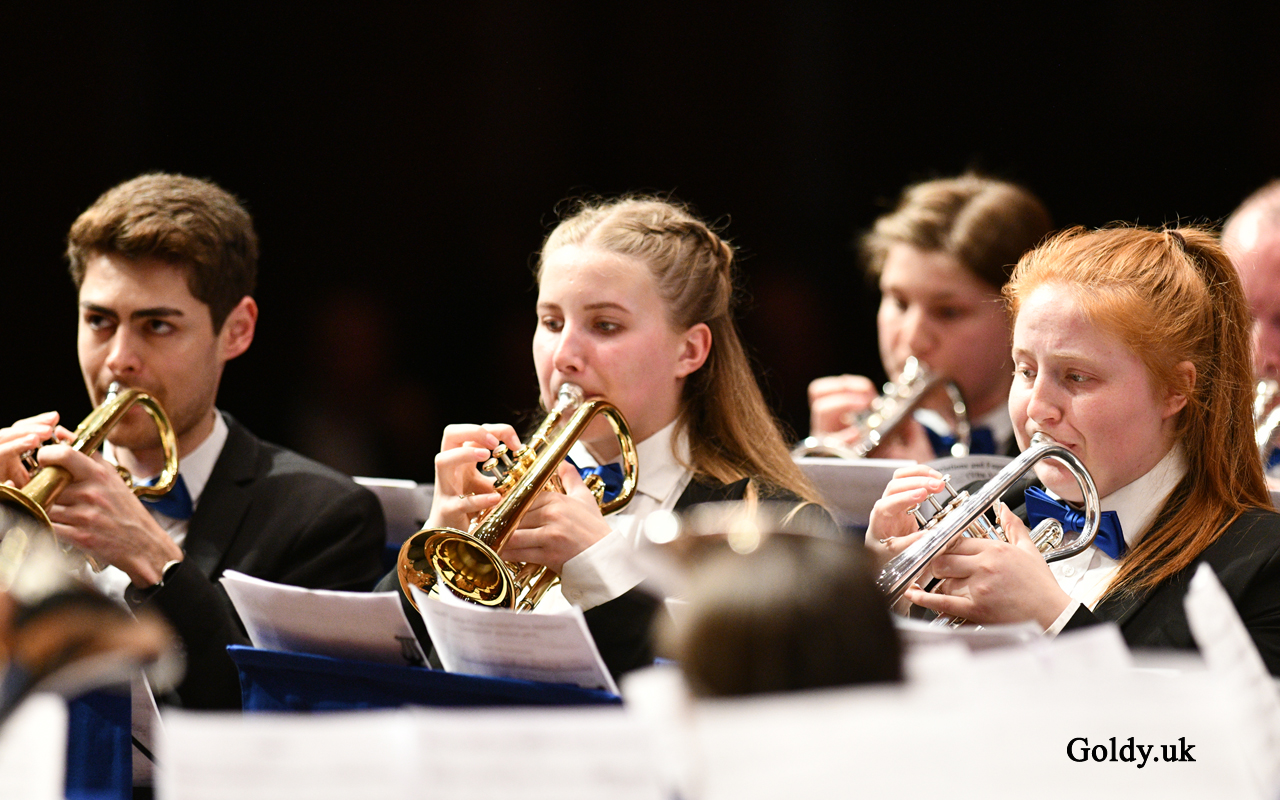
Lovely opening from Concord. Beautifully crafted. Flugel is so warm and tender, and supporting horns do a great job. Tuning isn't quite on the money to close the opening theme. First variation is nice, but could perhaps do with a bit more technical flare. The variations move on, and solo cornet excels. Some fine ensemble playing ensues, with beefy textures and solid ensemble. Plenty of drama here, but intonation isn't always solid.
Solo cornet is classy, and solo horn follows with quality. Band ensemble isn't quite consistent here, and soprano has a few struggles to soar. Horn and baritone interplay is nice, but the intonation between trombones and baritone doesn't quite work. That said, the movement is rounded off nicely original theme is reiterated in a richly delivered euphonium solo. Bravo.
The rich band tutti is lovely, but high cornets don't quite hit the nail on the head. Euphonium does a nice job, but intonation is again a slight issue between basses, trombones and euphoniums. We're into the final stretch now, and it's so cleverly subdued to start. Those pesky intonation issues soon come back to plague an otherwise lovely moment.
Final fugal section is quite untidy. The performance feels a little like it's wandering in the wilderness now. We regain a sense of purpose as the end draws ever closer, with big sounds on offer, but the blemishes continue. Not quite the performance Concord would have been hoping for, but there were some lovely moments.
Chris Davies
Saturday 27, 13:25:08
Own Choice — Concord Brass Band (Jesper Juul Windahl)
Vita Aerterna Variations (Alexander Comitas)
Although in construct a work of six variations and fugue based on a simple theme, 'Vita Aeterna' has the essential spirit of a tone poem.
It is an unfolding tale of life, death, hope, despair and redemption; hence the nods of appreciation towards composers and writers whom Ed de Boer (written under his pseudonym) felt understood his deeply-held beliefs on such matters.
At its core is an emotively affecting attempt to reconcile the feelings of immediate physical loss with those of eternal spiritual hopefulness through an intellectual appreciation of the Hindu and Buddhist teachings of Karma.
And even though thoughts of mortality and its possible dominions tends to be the preserve of those late in their life span, 'Vita Aeterna Variations' commemorates the life and death of a young Dutch euphonium player called Jeffrey Lindelauf.
From tentative beginnings, through episodes of energy and vitality, fate, despair and redemption, to an apotheosis of an acceptance of the possibility of eternal life, it is a work of spiritual as well as academic rigour and insight — questioning our beliefs in accepted norms.
Iwan Fox
Saturday 27, 13:13:38
4. Eikanger-Bjorsvik Musikklag (Ingar Bergby)
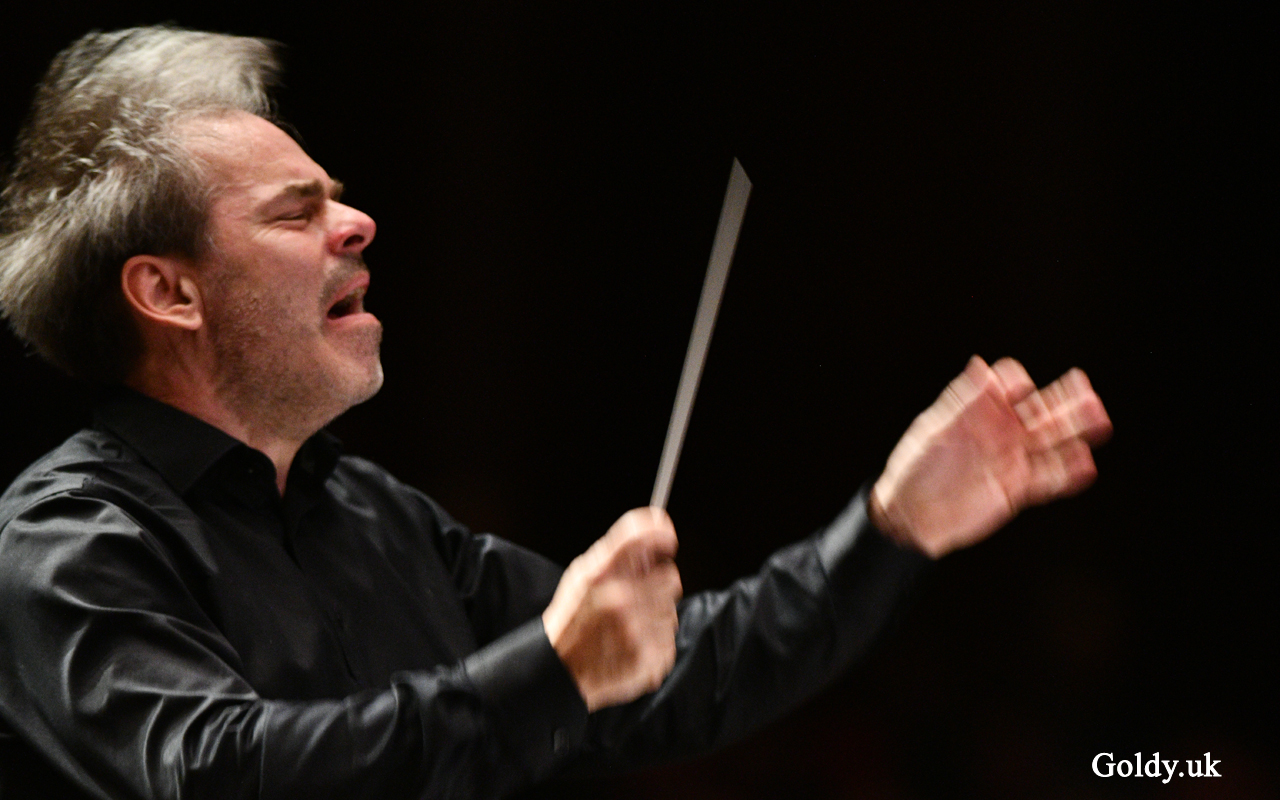
Well now, if our own thoughts on yesterday were shared by the judges, Eikanger are taking a healthy lead into today's own choice contest and Derek Bourgeois' Concerto Grosso is a piece that
could lift the roof off the hall.
It's a fine opening and the first big euphonium solo and Eb bass solos are magnificent. Electricity pulses through the bars although with Eikanger you always suspect that there is something left in reserve. The tension relaxes and suddenly there's a shaft of sunlight through the music.
As the tension builds once again the soprano is stunning and again the tension dissipates into a languid, florid flugel solo. Solo horn follows and muted trombone sings its bluesy number over gently rocking basses. It's captivating stuff.
A haunting duet between Eb bass and solo horn emerges, punctuated by bass trombone interjections and there are moments of magic to follow with silences in which you could hear a pin drop. The lower dynamics are simply breathtaking and everything feels so musically natural in Ingar Bergby's hands.
The transition into the final movement holds the audience enthralled as Flugel sings the this time embellished bluesy melody prior to a riotous final movement that is so gloriously eccentric in its
treatment of the Tico Tico like theme. What a bass trombone solo! And this is suddenly like sitting on a beach in Acapulco with a whiff off the wacky tacky about it. Again, it's glorious in its eccentricity!
The ending simply leaves us stunned.
Overall:
Could they do it?? Yes they could!! The audience erupts at a performance that was well nigh faultless. What a band. What a piece.
Chris Thomas
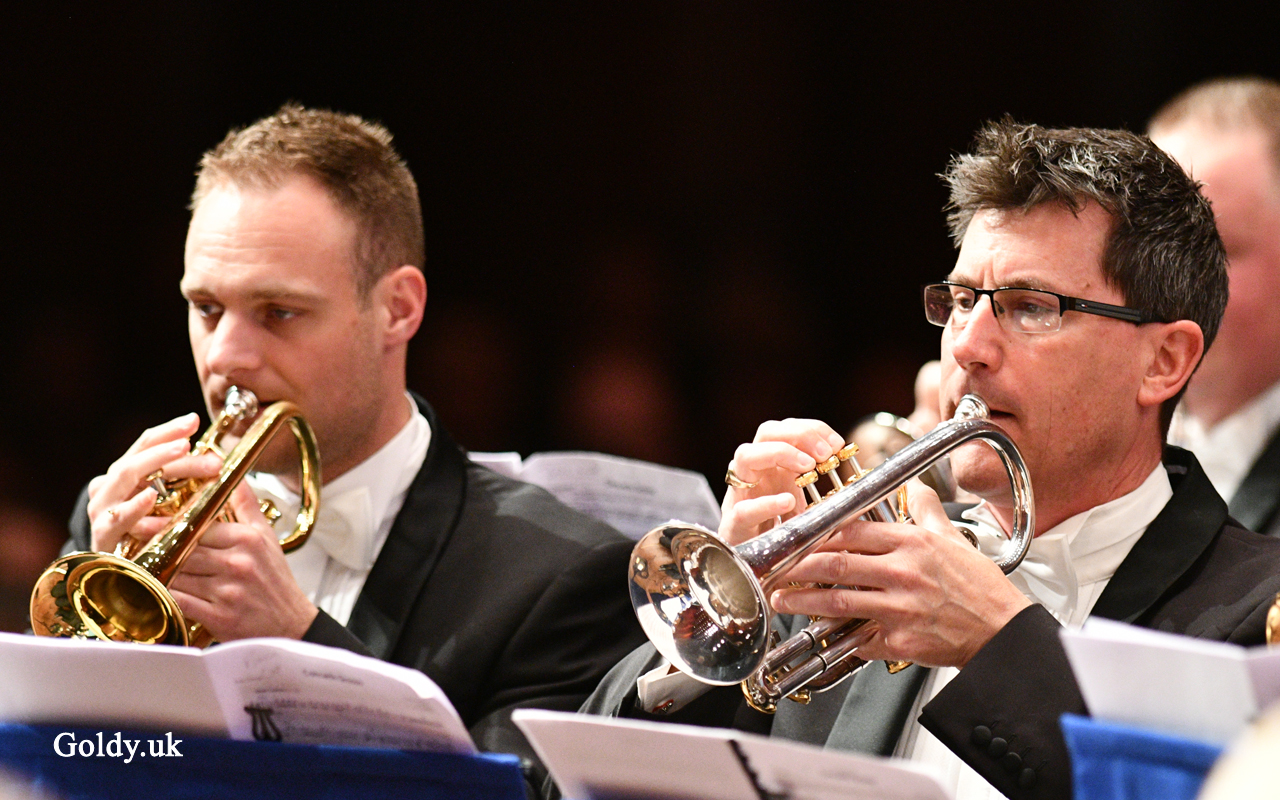
Concerto Grosso. A massive piece for a massive occasion as far as Eikanger are concerned — yesterday was sublime. Can they repeat that today? The early signs are very encouraging, with the opening exchanges tightly managed.
This is impressive stuff. Euphonium is excellent and horn whoops so neat. My goodness this is fabulous ensemble playing. Impressive tuba. Every little detail jumps off the page. Cornet expirations are dramatic and the first notes are hit with such precision (wow sop!). Precision is a badge this band is wearing today.
Soprano is just magnificent. I don't think I've ever heard playing like it. The transition to the flugel solo is deftly handled, and the solo playing that ensues is so enchanting. Baritones, euphoniums and basses are so tender in their accompaniment. Minor blip in horn but this doesn't detract from an atmosphere that has so firmly gripped the listener. Muted trombone adds to the lineup of star quality.
Bass/horn/flugel/cornet interact as though they are of one mind. Trombones are beguiling. Horns have the sort of warmth I'd expect from Moonlight Serenade — so well-balanced and luscious. The hall is utterly captivated as the music builds to its rapturous climax. The rhythmic unity of the band is astounding here. Flugel is utterly stunning — supremely confident and effortless. Muted cornet/trombone choir is so well-balanced.
The final movement is full of character, but that unity of ensemble is still there. This band is just operating on a different level to anything I've heard yet today. The dancing percussionists at the back, waving their maracas are emblematic of the conviction the band has in what it's doing. One moment of untidiness in cornets, but this seems so irrelevant. The finale keeps its momentum and the piece draws to a close with dramatic flare.
This may be one of the best performances I've ever been privileged enough to witness. It would take an extraordinary effort to beat this. I'm blown away. Wow.
Chris Davies
Saturday 27, 13:13:08
Own Choice — Eikanger-Bjorsvik Musikklag (Ingar Bergby)
Concerto Grosso: Opus 61A (Derek Bourgeois)
'Concerto Grosso' was written in 1979 for the farewell concert of the famous Philip Jones Brass Ensemble; a ten-piece work for four trumpets, French horn, four trombones and tuba.
In 1982 Bourgeois was the Professional MD of the Sun Life Band in Bristol, and when they were asked to perform on the BBC radio programme 'Bandstand' he took the opportunity of re-scoring the work.
There is no narrative or thematic inspiration; the term 'Concerto Grosso' is used by the composer in the baroque sense, as throughout the piece much is made of smaller ensembles featured against a larger accompanying background.
Written in three main parts it is played as a continuous whole; exploring material that ranges from orchestral brass brilliance to sombre introspection, blues inflected jazz to rumba inspired wit.
Each of the major soloists is featured in extended quasi-cadenzas; from the euphonium and tuba to the flugel horn, whilst the initial commanding fanfares of proclamation return to close a work of vivid, febrile imagination.
Iwan Fox
Saturday 27, 13:10:11
Favourite day...
"Own Choice" day at the Euros is one of my favorite days of the year! #eurobrass19
— Nate Rensink (@nate_rensink) April 27, 2019
Saturday 27, 12:49:22
3. 3BA Concert Band (Luc Vertommen)
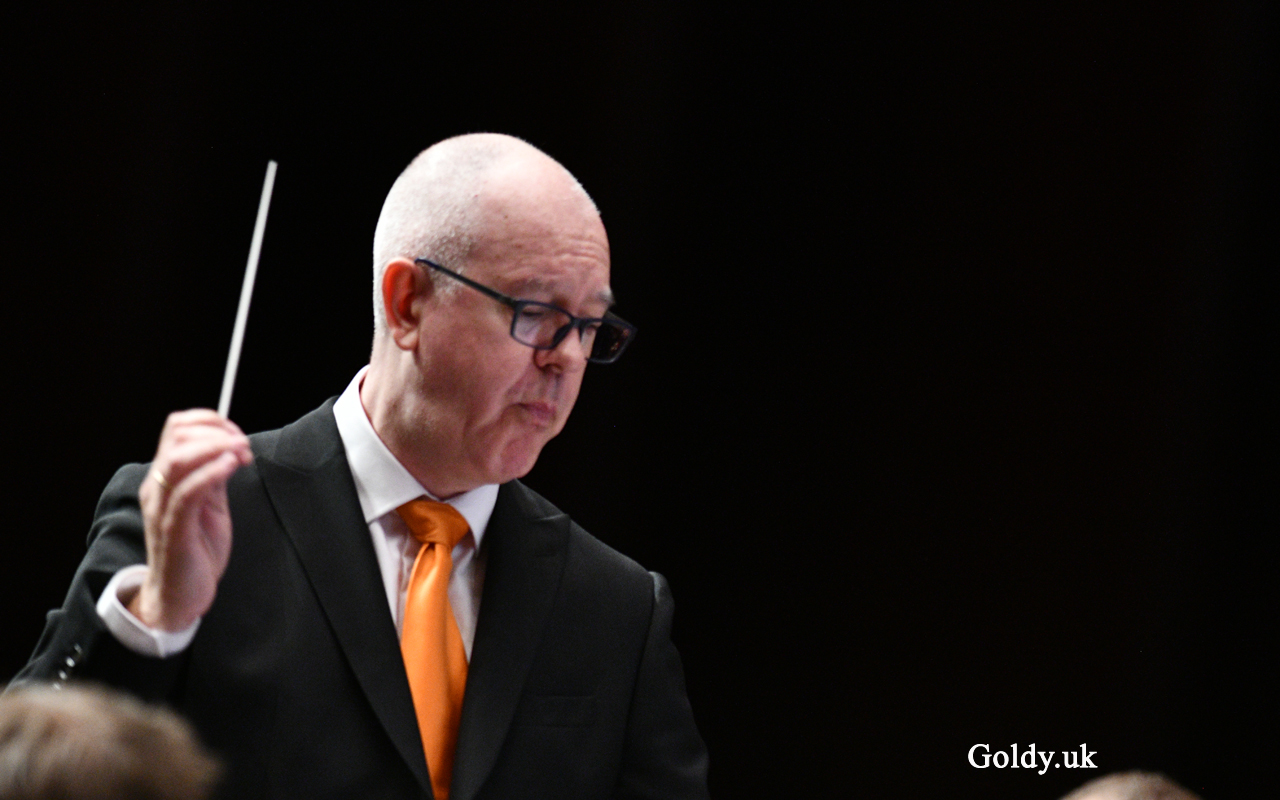
Can 3BA continue the seam of form that saw the band produce such a fine performance of the set test yesterday? From the opening bars, yes they can.
Peter Graham's most recent score opens delicately, with haunting textures and colours that glisten. The confidence that marked the band's playing yesterday under Luc Vertommen is there again as warm sounds emerge and solo lines are played with emotion and empathy, not to mention security.
It feels like the band is totally zoned into the performance.
The Lament is so delicate, so emotionally involving and the blast of march from backstage lends a Charles Ivesian moment to the performance.
The build to the final paragraph is wonderfully measured and the ending simply radiates emotional
warmth.
Overall:
3BA capitalises in the strength of its set test performance with a fine reading of Peter Graham's music. We could sense the inspirational impact of Luc Vertommen and this radiated affection in what is a tribute to one of the great men of New Zealand banding. Fine playing indeed.
Chris Thomas
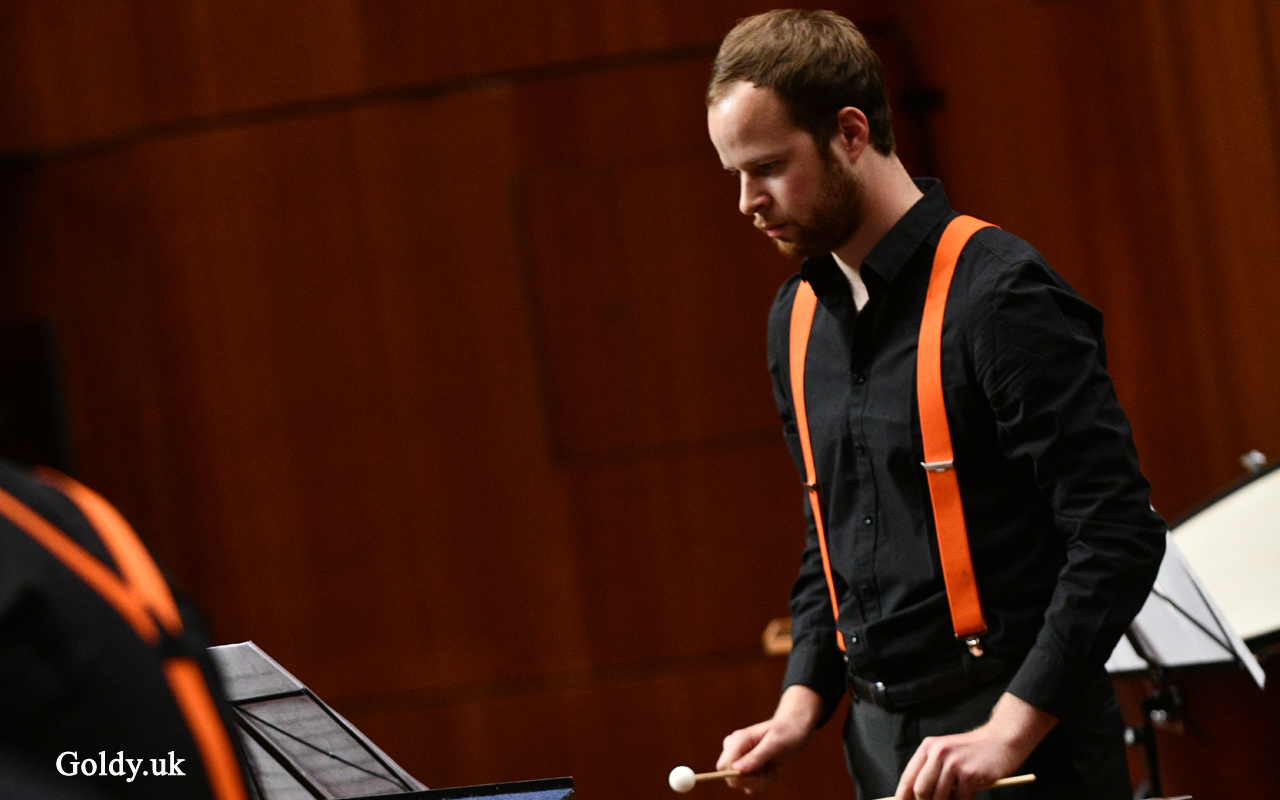
3BA will no doubt be looking to capitalise on yesterday's strong show. There's plenty to admire in the opening exchanges of Graham's piece, with nicely-managed textures and tight ensemble. There is so much detail on show here, and the band is playing so tightly. Euphoniums and soprano soar into the gods with aplomb. Magnificent. A sense of foreboding draws the music to a climax which gives way immediately to something altogether more plaintive. The seams are carefully managed here. The calmness doesn't last long though — the versatility of the band is brought to the fore as it navigates a constantly fluctuating musical landscape.
There's just so much attention to detail here. Soloists are on fine form — both solo cornet and bass — but there are very minor blemishes. Euphoniums and baritones treat us to a beautifully-crafted chorale, later taken up by the full band. This is so musical: the first real moment of deep tenderness for me. Cornet and euphonium get a little lost in the band texture, but this is audibly very good playing nonetheless.
The offstage marching band is effectively executed before the band embarks on another rhythmic voyage which is so exciting but never untidy. Band chorale is slightly overpowered by tubular bells, but I've a feeling that's about to change. Yes — it does. What an ending!
This was another thoroughly excellent performance from the Germans. The piece suited the needs of the occasion so well — it had a bit of everything for adjudicators and audience alike — and it was so well-executed by band and MD alike. Thoroughly enjoyed that one.
Chris Davies
Saturday 27, 12:44:05
Own Choice — 3BA Concert Band (Luc Vertommen)
The 39th Parallel (Peter Graham)
Peter Graham's 'The 39th Parallel', was commissioned by the Brass Band Association of New Zealand, in memory of the late Kevin Jarrett, with funds from a variety of sources. It was first performed in competition by the National Band of New Zealand at the World Music Contest in Kerkrade in 2017.
It is inspired by the 39th Parallel (South) in which lies the New Zealand district of Whanganui and at its heart, the Whanganui river — Te Awa Tupua.
The work is cast in two parts — the first an evocation of the course of the river from Mount Tongariro to the sea.
This is constructed according to the mathematical principals of the 'golden ratio', which runs in parallel with a sequence of metrical modulations that gradually increase the tempo of the music, mirroring the course of the flow of the river.
It is followed by the elegiac Apakura (meaning 'lament' in the Maori language) which develops the theme hinted at in the opening section but which is now fully realised.
It is a homage to the late Kevin Jarrett — a towering figure in New Zealand brass banding, who for many years lived and worked in Whanganui.
It includes references to music which formed a significant part of his life; as part of the New Zealand Army Band musician (echoes of the Urbach march 'Through Bolts and Bars') and his long association with the National Band of New Zealand (hints of Goffin's 'Rhapsody in Brass') before ending with optimism and triumph with a reprise of the major thematic material.
Iwan Fox
Saturday 27, 12:32:01
Elite Streaming
Our view from the hall this morning at @EBBC2019. The challenge section is nearly finished and then it’ll be time for the hotly anticipated own choice contest! Join us at https://t.co/1B6bvoMakI #Eurobrass19 #EBBC19 #ebbc2019 pic.twitter.com/Nsm8HEfbIY
— World of Sound (@WorldofSoundUK) April 27, 2019
Saturday 27, 12:26:40
2. Brass Band Burgermusik Luzern (Michael Bach)
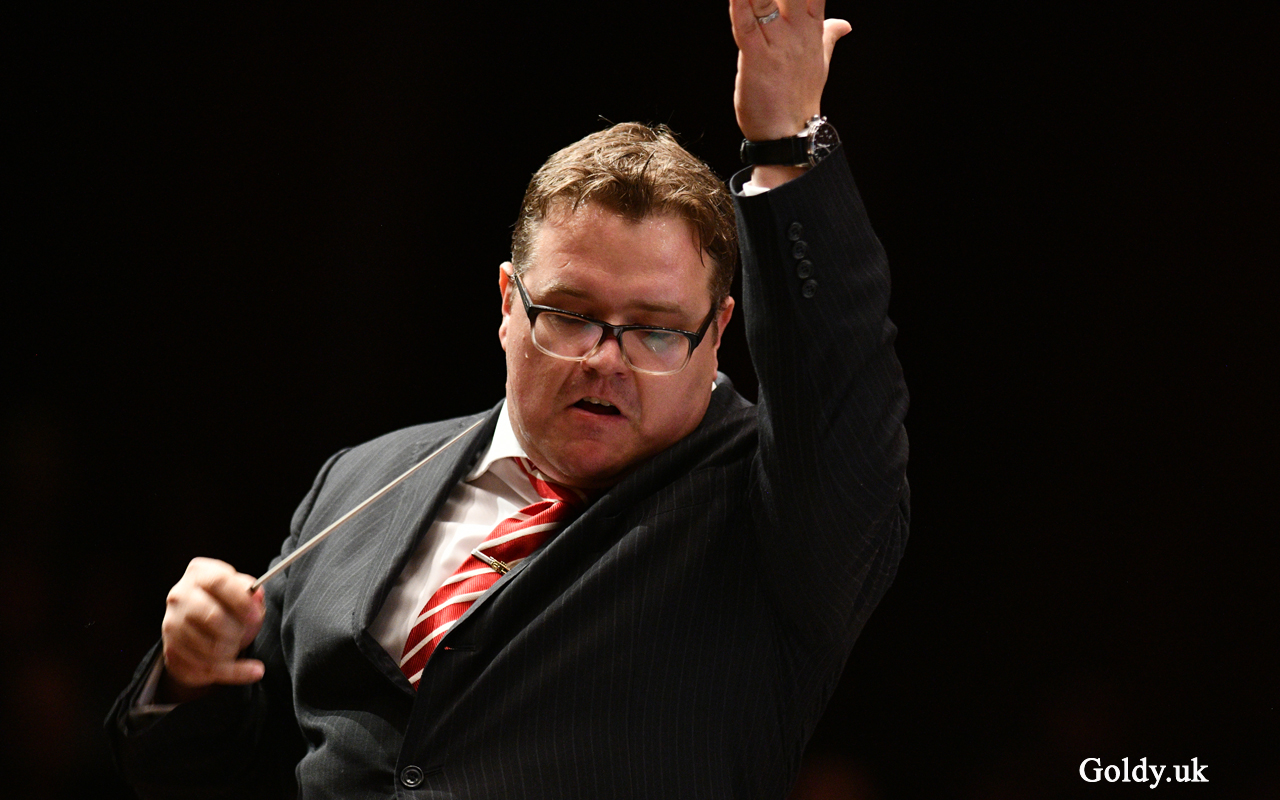
The opening shimmers in so many fascinating colours and the trombone solo that follows immediately sets the standard. You simply know with Paul McGhee's music that there will be incident ahead!
This is right up Michael Bach's street, giving him so much scope to create sound and effect and the impact is huge, allied with a massive band sound and allowing the players to revel in the dissonances, textural effects and colours that constantly shift and mutate at every bar.
It's a score packed with textural ideas and percussion plays a significant part, with constant sounds that draw the ear into the performance.
Solo trombone again excels and those constant shifts in colour and texture are almost bewildering as the band throws them out at every turn. The approach to the close is relentless in its onslaught of sound until a moment of silence precedes the last Le Sacre like shriek from the band.
Overall:
A piece that is likely to divide opinion, as all probing and challenging new music should, but Luzern's response to the score was simply magnificent. Huge sounds and textural effects were very much to the fore here as Michael Bach took every opportunity to capitalise on the score.
Chris Thomas
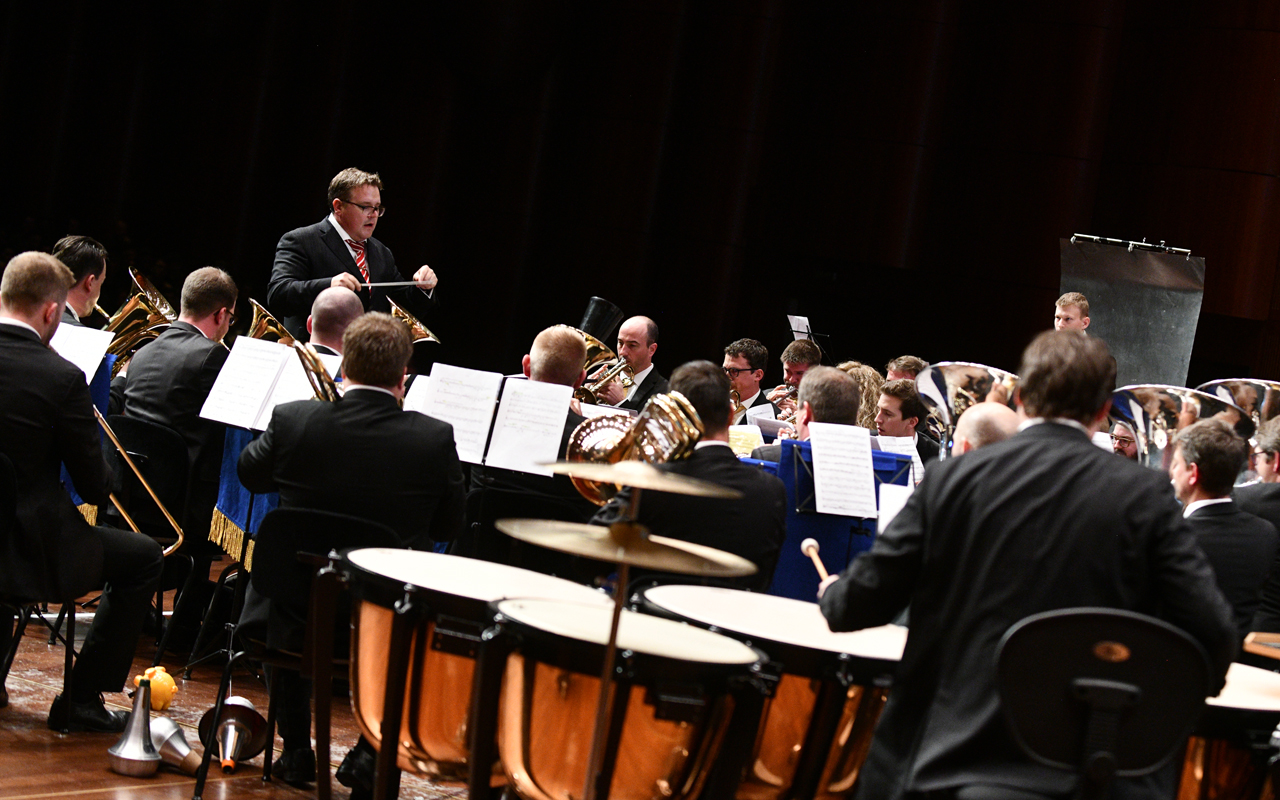
Luzern
Classy trombone is cool as a cucumber atop an unsettled canvas of tubas and muted instruments. There's bags of detail here and a plethora of colourful timbres. Bass drum shakes the entire audience about in their seats.
The drama hits full throttle before we're immediately lurched to a calmer yet unsettled mood. Trombone excellent again. Michael Bach is finding all sorts of flavours in this veritable smorgasbord of musical vignettes. Percussion are strikingly good throughout.
Quietude now, and the musical canvas is stripped bare with beautiful muted textures before flugel and euphonium join together in wonderfully lyrics unity. Classy playing this, and superb direction from Michael Bach. The eeriness hits home with sinister scrapings on a metal sheet. This is all so very atmospheric. The musical character evolves gradually but inexorably, and we're into a romp down the rue.
Detail comes flying out of the band. Flugel teases us before the band hits rhythmic overload. This is much more considered playing than what the band delivered yesterday, with the bombast relegated to the back seat. Does that mean there's no excitement? Goodness no. They have it in spade loads. Some of the detail gets a little lost and the music for a time feels a bit stuck in second gear, but the thematic material spread across octaves throughout the band is surprisingly powerful when it comes. The ending is sensational.
Super performance from Luzern. So much colour and passion. Solo trombone the man of the match for me, but so much quality around the stands. This felt like a more mature performance than yesterday, and it came across so well as a result. The challenge is on!
Chris Davies
Saturday 27, 12:23:20
Own Choice — Brass Band Burgermusik Luzern (Michael Bach)
King Kong on Rue Igor Stravinsky (Paul McGhee)
As ever with Paul McGhee, not everything may be as it first seems.
This is no homage to the famous 1933 RKO film starring the frenetically screaming Fay Wray, but a work of febrile imagination inspired by the real life events that took place on December 4th, 1971, at the Montreux Casino in the middle of a performance by Frank Zappa and the Mothers of Invention.
During the synthesizer solo on the song 'King Kong', the roof of the venue ignited (reportedly by the firing of an errant flare gun) — resulting in over 2500 concert goers being rather manically evacuated.
Nobody was killed, but the entire building burned to the ground and the band lost all of their equipment — the result of which saw another rock group 'Deep Purple' go on to pen their own homage to the night with their iconic rock song, 'Smoke on the Water'.
McGhee's work explores the multitude of textures available to the modern day brass band — from muted timbres to various approaches to 'open' sonorities — requiring aggressive effects, non vibrato playing and sonorous tonality — all with interpretive expression and intent freely in the hands of the performers.
The piece juxtaposes these elements to create momentum in the music — shifting from calm to madness in the blink of an eye — much like the fateful night itself.
Iwan Fox
Saturday 27, 12:21:10
1. Valaisia Brass Band (Arsene Duc)
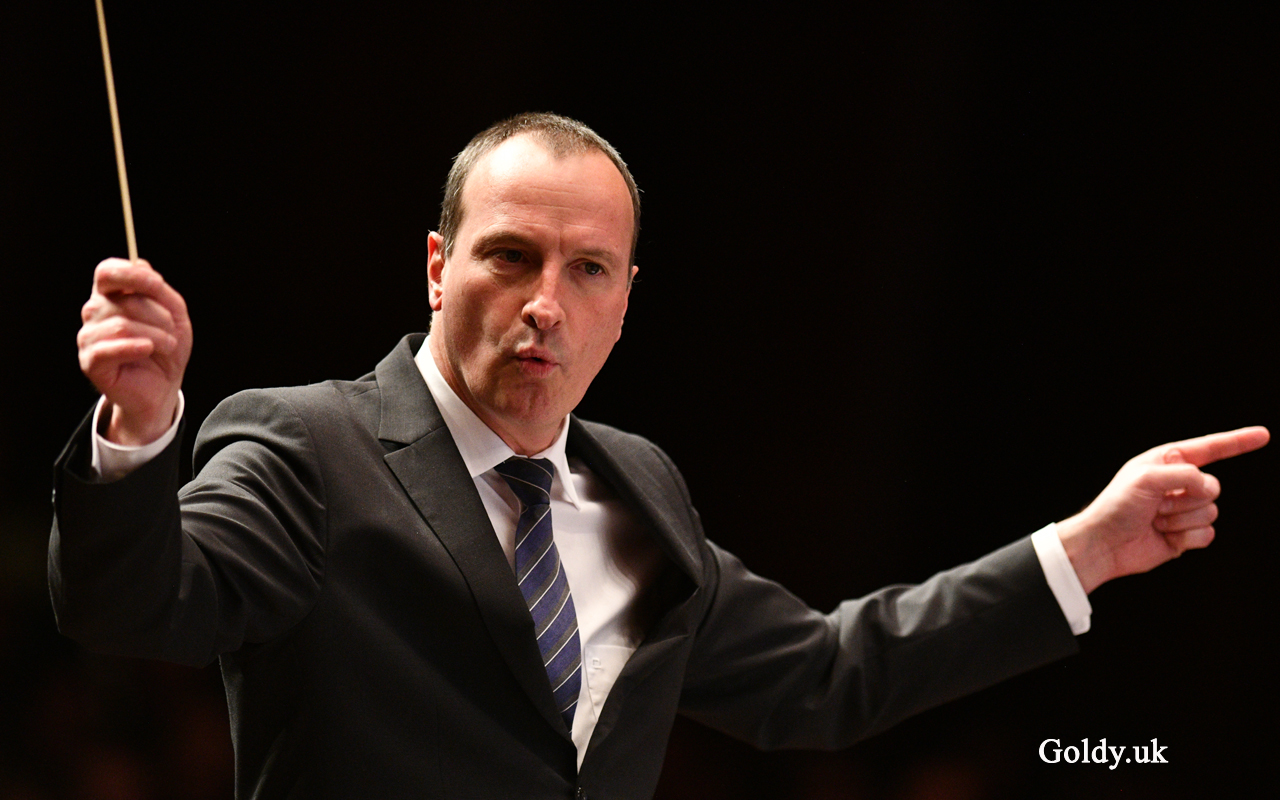
There are just the tiniest of hesitations at the opening as solo horn and flugel stand to the side of the stage. The atmosphere remains intact however and as the momentum builds, the flashes of jazzy colour and harmonies that underpin the music are heard with clarity.
The sound of the band in full flight is magnificent and the detail is always heard pristine through the textures. But it is the colours and textures of the music that are the key here.
This is very different music for Simon Dobson…it's so luminous and at times fragile and delicate, but also characteristically imaginative in its scoring.
We sense that the band is very much in the mindset of the score although it doesn't always sound entirely comfortable with consistent issues of intonation that threaten to undermine and distract.
As it builds towards the close the sounds and detail are again impressive indeed but like yesterday, this has been a Valaisia not quite at the top of its game.
Overall:
Simon Dobson's 'Glass' is an intriguing piece, so full of fascinating colours and textures. it's not a conventional own choice showpiece and although Valaisia have displayed insight and
technical brilliance, there have also been some moments of unease, notably in terms of tuning.
Chris Thomas
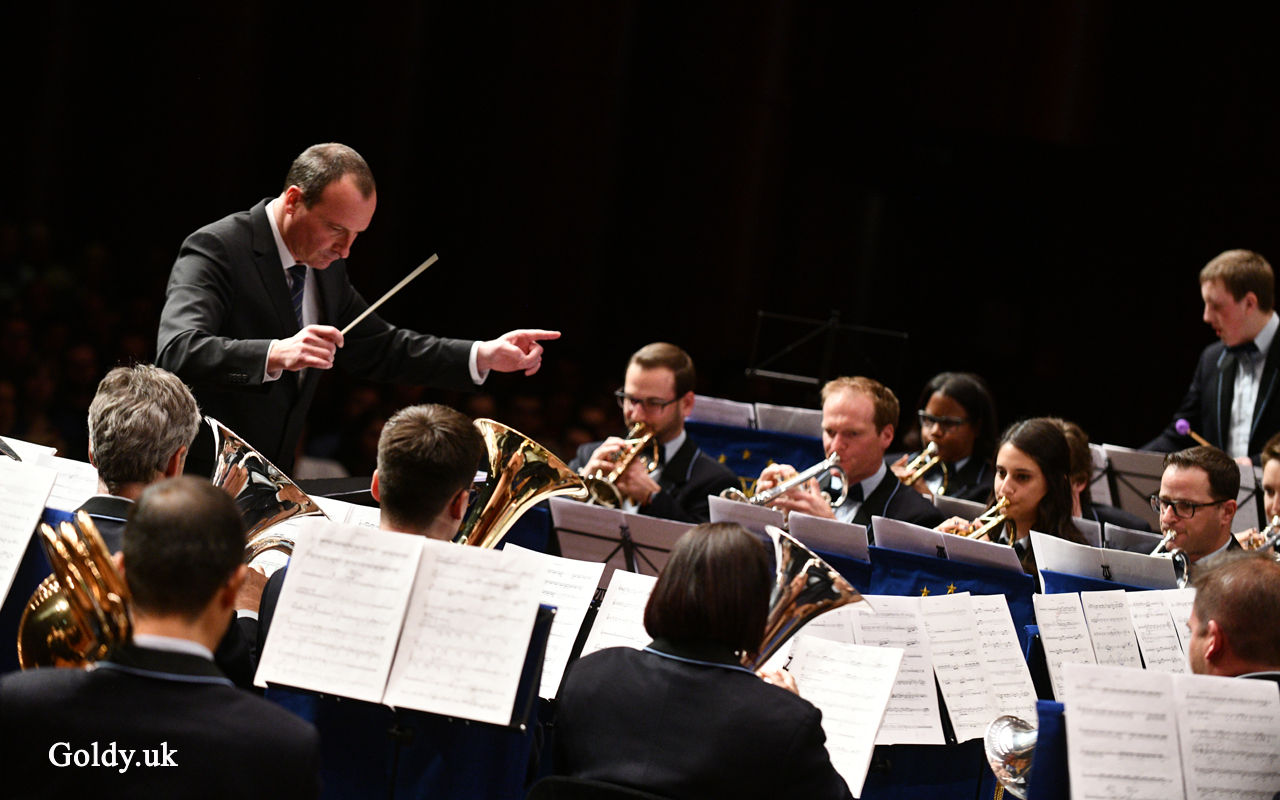
Solo horn almost comes from nowhere with a magical opening — such class. Opening interactions with flugel and solo cornet are so well-shaped.
A kaleidoscope of colours confronts us, but the intricacies of the detail are always audible. Crikey when this band is at full tilt the roof is almost lifted off, but raucousness is somehow avoided. Tenderness now, so well-balanced and delicate.
Soprano glides above the band beautifully. Euphonium is enchanting, and solo cornet matches. Solo trombone is mesmerising as his two colleagues offer sympathetic support in a finely-worked trio.
Crashing percussion, and now we're into Glass' sharp edges. Trombones and tubular bells cut through with laser-like focus. This is pure theatre. Soprano and trombone team up well. Dobson's carefully-crafted textures are brought to life with vivid animation.
The excitement, with whooping horns and spiky rhythms. Flugel deals with unbelievable rhythmic complexity before the trombone trio draw a line under the section with a ruthless klaxon. Some minor moments of jarring intonation across unison octaves despite deliberate dissonance.
We move up a gear and while the ensemble is impressive, it isn't always perfect between departments. A thrilling end with massive sounds draws the piece to a close.
I can't make my mind up about this. Some terrific solo playing — particularly solo cornet, euphonium, horn and trombone — and some utterly dazzling band playing too. There were, however, niggling moments of insecure intonation and ensemble, and an occasional lack of detail owing to the massiveness of the overall sound.
A super performance without doubt, but I'm not sure this is unbeatable.
Chris Davies
Saturday 27, 12:09:50
For anyone who might be interested! This is the program note to my new work, GLASS which will be heard today in the own choice section of the European Brass Band Championships in the Stravinsky Hall, Montreux. #EBBC2019 @4barsrest @BB1887 @BBWMagazine RT pic.twitter.com/R2YCYnl2NE
— Simon Dobson (@SiDobsonMusic) April 27, 2019
Saturday 27, 12:09:07
Own Choice — Valaisia Brass Band (Arsene Duc)
Glass (Simon Dobson)
'The Glass Bead Game' is a novel written in 1943 by Swiss born author Herman Hesse.
It surrounds the lives of Joseph Knecht, the Magister Ludi (master of the game), and his monk-like colleagues who live, research and play the game as members of a utopian society in the far future.
Initially driven to write a work about Knecht, Dobson developed the idea to encompass his own thoughts of playing the game — inspired by texts on sacred geometry, sonnets by Shakespeare, Bach chorales, manifestos by Nietzsche and Goethe and works of Pythagorus and Plato.
One continuous piece split into five 'Moves' — each related in form of what subject 1 is to subject 2, as subject 3 is to subject 4' etc.
For instance: What human observation of the natural principals of structure and growth are to the observations of space and the design of buildings in architecture.
The work therefore contains themes, motifs and rhythmic/ harmonic structures that traverse throughout but are often meant to be hidden.
Move 1: The Monochord as a Model of the World.
Move 2: Variations in the formation of snowflakes.
Move 3: Architecture is like frozen music (Goethe c.1802-3)
Move 4: Kepler 22-b
Move 5: The Kalachakra Mandala
Iwan Fox
Saturday 27, 12:02:56
Championship Section:
Draw:
Adjudicators:
Jan Van der Roost, Thomas Reudi, Rieks van der Velde
1. Valaisia Brass Band (Arsene Duc)
2. Brass Band Burgermusik Luzern (Michael Bach)
3. 3BA Concert Band (Luc Vertommen)
4. Eikanger-Bjorsvik Musikklag (Ingar Bergby)
5. Concord Brass Band (Jesper Juul Windahl)
6. Brass Band Willebroek (Frans Violet)
7. Italian Brass Band (Filippo Cangiamila)
8. Provinciale Brass Band Groningen (Richard Visser)
9. Gota Brass Band (Michael Thomson)
10. Brass Band Oberosterreich (Ian Porthouse)
11. Paris Brass Band (Florent Didier)
12. Cory Band (Philip Harper)
13. Brighouse & Rastrick (Prof. David King)
Friday 26, 23:42:42
See you in the morning...
That's it from us tonight. See you in the morning.
Friday 26, 23:28:53
What others think...
@ebml In a class of its own today. Congratulations! Looking forward to tomorrow's performance :) #ebbc2019
— Håkan Wikenstål (@hwikenstal) April 26, 2019
A very, very odd ending to this contest with two, for me, highly disappointing/odd ones... maybe because I expected them to steal it at the last. @briggusbb or @ebml for me today #EBBC2019 #eurobrass19
Matt Ryan (@MattiRaz) April 26, 2019
#EBBC2019 The set test and first day are all over in Montreux and Dear Cassandra has certainly tested the bands to extremes. Eikanger were a class apart but behind the Norwegians it's close with Obersterreich, Brighouse, Cory, Valaisia and Willebroek all in the top six mix.
Brass Band World (@BBWMagazine) April 26, 2019
Well — then this first day have finished — my top six today will be 1) Eikanger 2) Willebroek 3) Cory 4) Valaisia 5) 3 BA 6) Brighouse — looking forward for tomorrow and part 2!! #ebbc2019 #eurobrass2019
Morten E. Hansen (@MortenEHansen) April 26, 2019
Prediction:
BrassBand BlechKLANG (@BB_BlechKLANG) April 26, 2019
1. @ebml
2. @Coryband
3. @Valaisia_BB #EBBC2019 #eurobrass19
Predictions — Test piece:
Marita Solheim (@solhe1m) April 26, 2019
1. @ebml
2. @briggusbb
3. @Coryband
4. @BBWillebroek
5. @Valaisia_BB#EBBC2019
Ciao from Roma Italy !!!#eurobrass19
— Giuseppe (@Saxrig) April 26, 2019
Friday 26, 17:26:05
4. Concord Brass Band (Jesper Juul Windahl)
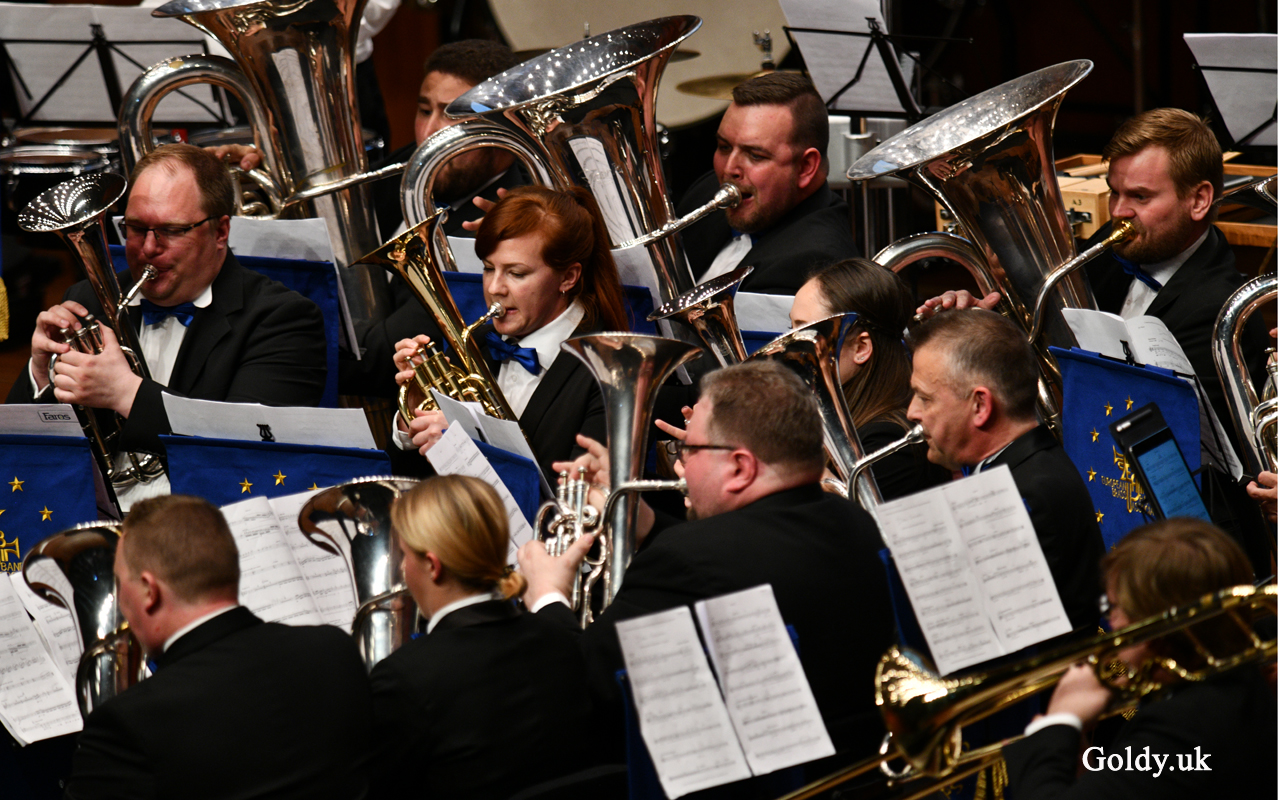
The Danes don't quite gel in the opening bar but it settles and the dynamic hairpins are effective. Solo cornet is not entirely comfortable in the tricky opening solo and for a moment the atmosphere
is fragile but again, it settles and the transition into 'Fear' is well handled.
'Fear' is certainly on the edge and tense although not without a sense of it being a little beyond control at times and the interplay of the 'psychadelic' basses leading into 'High Hopes' is not projected with clarity.
Fine euphonium solo in 'High Hopes' and there is real beauty in the music that follows. This is so delicately tender and limpid. Luminous sounds find their way through the textures and even though there is the occasional fragile individual entry, the atmosphere is beautifully done until the flugelhorn slips.
There are hints of strain in the quiet approach to the final paragraphs as lips tire and this has clearly been an immense effort from the players. The ending displays an energy sapped band with not all of the detail being heard through the textures and a final peroration that doesn't quite raise the hairs on the neck.
Overall:
The quiet sections were so well done by Concord with careful attention to the effects, balance and delicacy of sound. It wasn't always matched by 100% execution in the faster music and despite its many qualities, the ending lost its sense of musical direction.
Chris Thomas
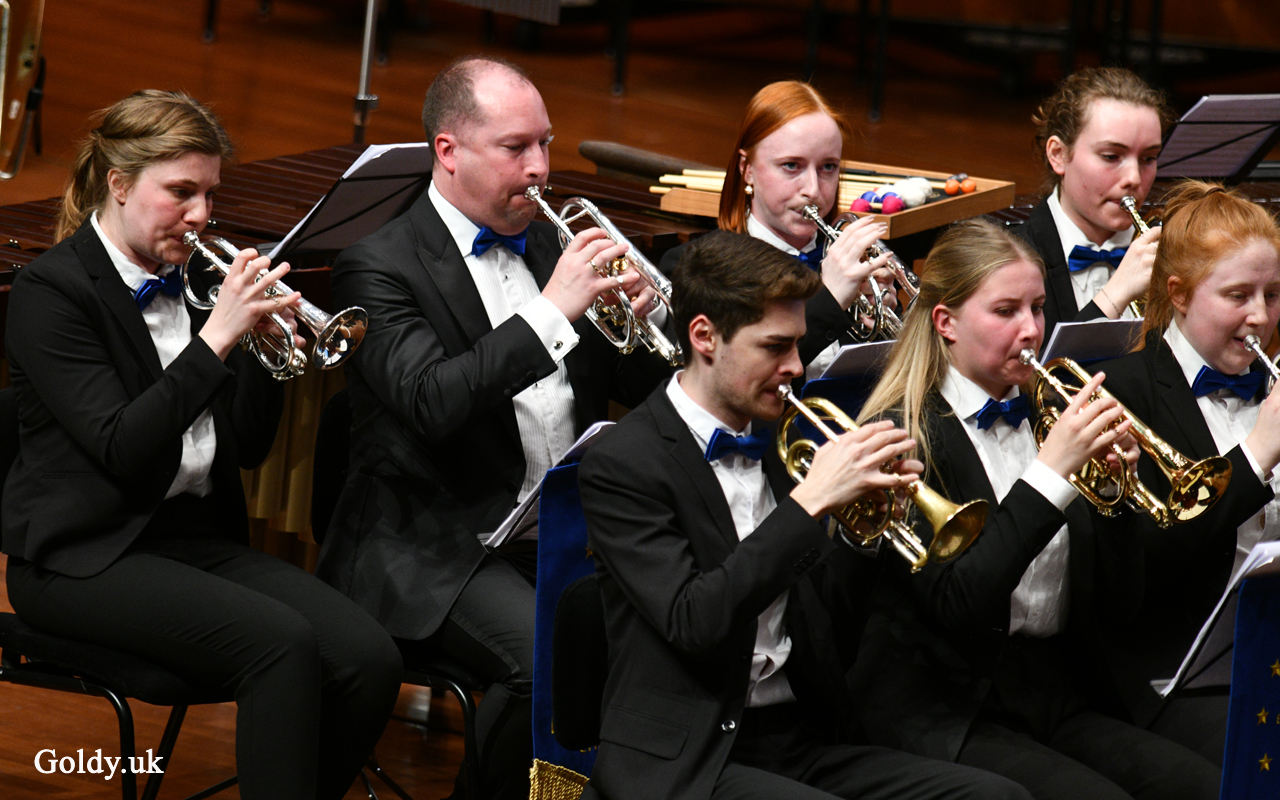
Opening pulsations have some instability in intonation and ensemble — this is likely to be a challenge for everyone today. Solo cornet lead into The Call isn't quite as safe as it could be. The band sound is controlled well by the MD into Fear, which has plenty of detail. Percussion are in fine fettle. Ensemble is good, but not excellent, and the balance doesn't always permit the transparency we heard when the section opened.
Throbbing basses evoke the psychedelic with colour, and the transition into High Hopes is masterfully crafted by the MD. Solo cornet has found his confidence, and it is well-placed. Fine playing. Euphonium takes the baton with similar quality. Bravo. The textures are well-constructed here, and the atmosphere captured brilliantly. Cadenzas not always clean, but cornet and euphonium work well together. Cornets not quite in tune through the tranquilo, but the atmosphere is well-maintained. Flugel doesn't quite hit the mark into the presto, but recovers well.
'No Matter' has character — the bass trombone cast as the naughty kid at the back of the class. Ensemble doesn't quite work between percussion and band, despite the fine playing on offer. Dear Cassandra, the band has opened up with a fine sound! Soprano and euphonium almost nail their respective solos, but there's not quite the level of precision they were hoping for.
I start to lose detail towards the end, and the music seems to meander a little. Lots of the inner parts — middle band especially — are getting a bit lost in the texture. That said, the ending is valiant and bold.
Much to admire here. Flashes of brilliance, but somewhat lacking in consistency, both in precision and direction.
Chris Davies
Friday 26, 17:07:41
3. Provinciale Brass Band Groningen (Richard Visser)
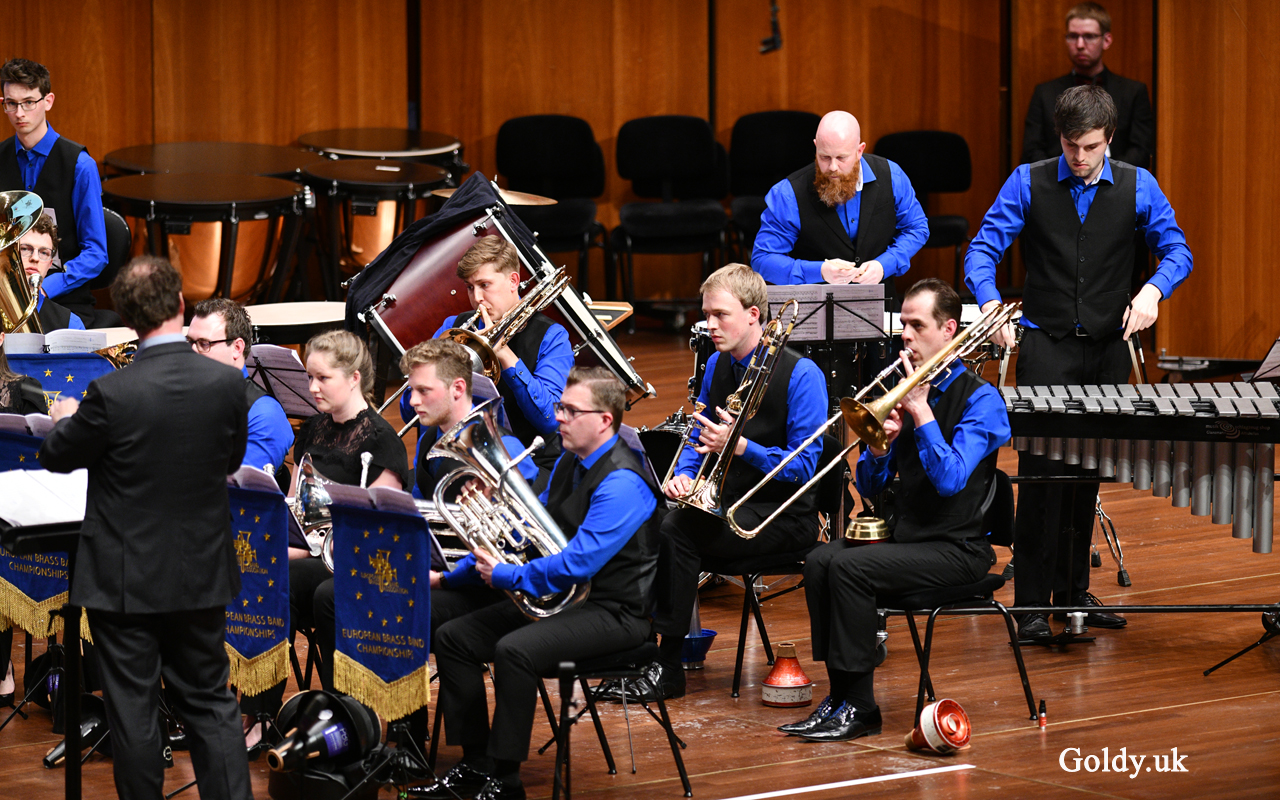
The dynamic hairpins of the opening are well done and this is a solid competent opening, if not quite possessing the delicacy of atmosphere of the opening account.
The energy as 'Fear' takes hold is unquestionable and this has drive and an unrelenting tension about it even though the detail is not always heard with 100% clarity.
The muted dynamic effects are well pulled off although the bass ostinato like figure leading into 'High Hopes' is not entirely consistent in its balance and accuracy.
'High Hopes' itself is luminously beautiful with limpid, delicate sounds that beguile. There are also a handful of entries that are not totally secure however that ruffle the surface of the calm waters.
The sustained approach towards the closing uplifting paragraphs is just a touch laboured at timesand balance between the band and percussion in the final moments is not always sufficient to
allow the detail to be heard with clarity.
A quality ending closes a fine account from Groningen that just lacked a little consistent of execution and balance.
Overall:
There were moments of beauty in Groningen's performance, some luminously so,although there were also passages that didn't quite stand up under the spotlight.
Chris Thomas
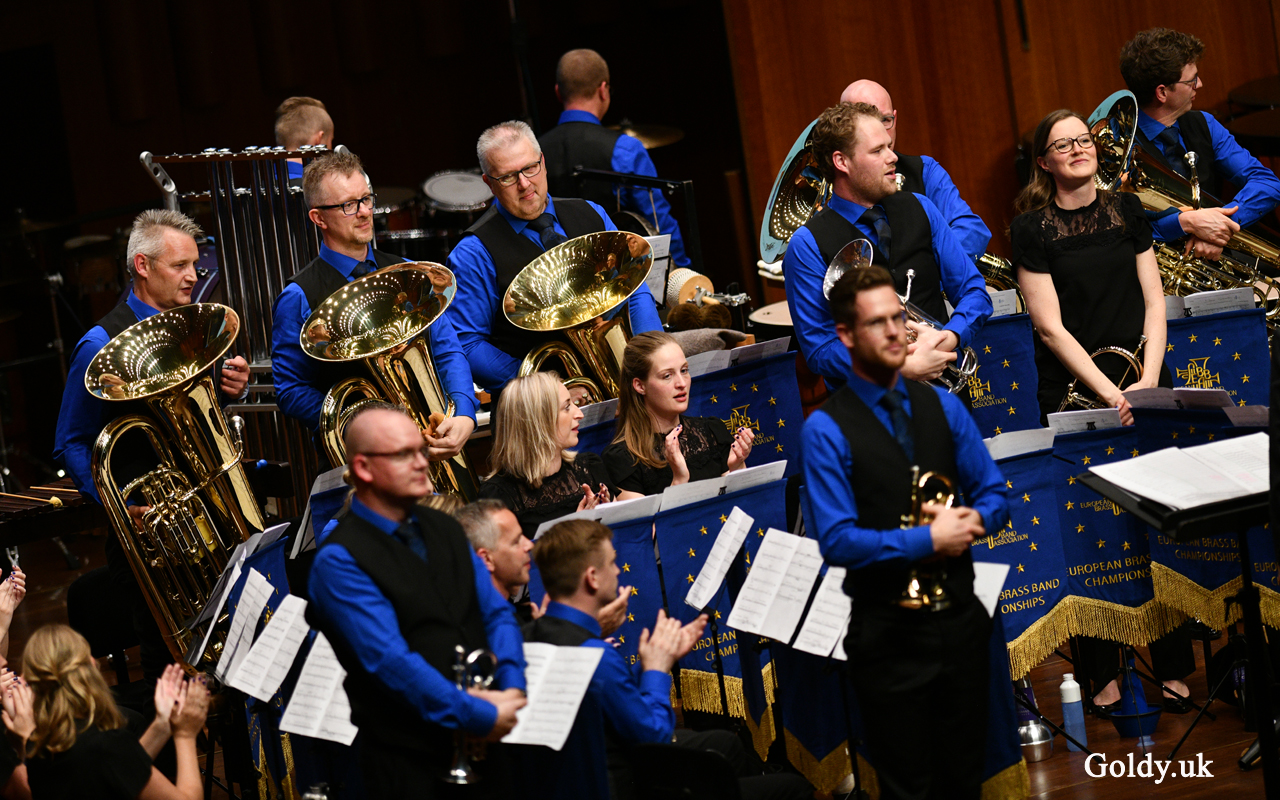
Opening is captured well, intonation generally very good, and the swells not overdone. Plenty of detail on show, and a classy solo cornet takes us into The Call. Band sound is measured but powerful. Plenty of detail on show in Tests — this is impressive playing. The ensemble isn't always perfect, but the MD's attempt to give the detail a chance is admirable.
The psychedelic music flows neatly into High Hopes where cornet and euphonium do well, but there are some blemishes and a few intonation problems as muted and unmuted instruments interact. Cadenzas are well-measured, though perhaps a little lacking in brilliante and not always secure. Again the tuning contrasts between open and muted instruments.
'No Matter' again has a sense of measuredness about it, which makes it easy to hear what's going on but perhaps not enough to exhilarate. 'Dear Cassandra' excites, and high soprano and euphonium do well. Finale is bold and exciting, with a great build to a super finale, though with a hint of tiredness.
A fairly measured, steady performance for me. Could have been a few more risks taken musically, but there was plenty to like in the energy and commitment. A bit more consistency in the solo passages would have made a big difference, but Lady Luck is likely to be quite fickle today.
Chris Davies
Friday 26, 16:45:09
2. Brass Band Burgermusik Luzern (Michael Bach)
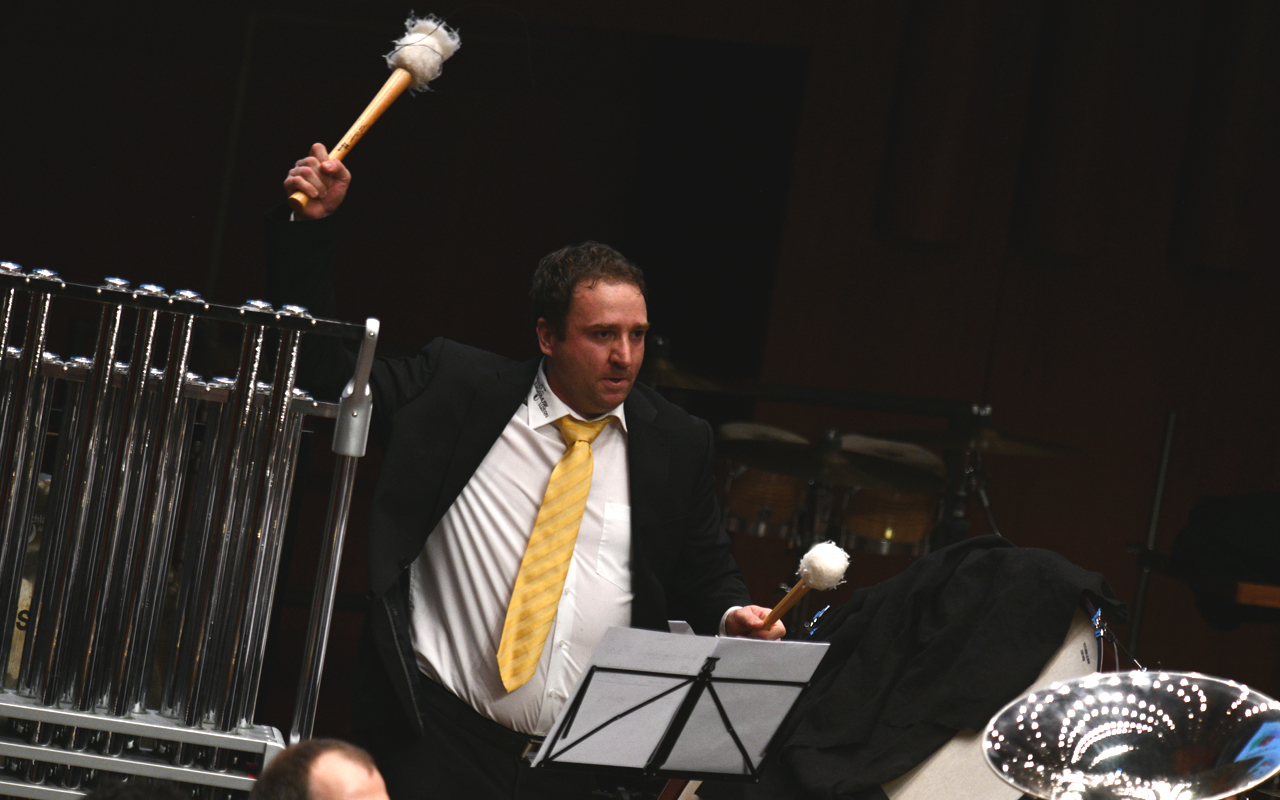
The opening dynamic pulses around the band are taking a less extreme form than in the opening performance and already this feels and sounds like a different approach. When it opens up though
my goodness what a sound!! This is lifting the roof off the the Stravinski Hall!
'Fear' drives on with relentless momentum although the absolute precision and detail required here is not always totally clear.
Michael Bach's approach is always one of total commitment. This is an MD that throws everything at a performance and there is no exception here as he works away relentlessly.
Intricate detail in the basses ahead of 'High Hopes' is just a touch muddied at times but the cornet solo that follows rings so clearly around an auditorium in which every detail can be heard. Beautiful.
Nice cornet and euphonium solos and there's a haunting fragility about this. Just the odd nervymoment…miniscule in fact…but they are there.
Flugel falters momentarily and again there are one or two entries that we sense are on the edge. But again, the atmosphere remains intact.
Soprano not quite there and it's frustrating that there have been quite a few slips in the latter stages.
The close is a radiant apotheosis of blazing … a fine ending indeed but there have also been slips
evident.
Overall: A different approach from Burgermusik Lucerne. This had abundant atmosphere and
character but also one or two moments of fragility that could well become increasingly crucial as
the performances unfold today.
Chris Thomas
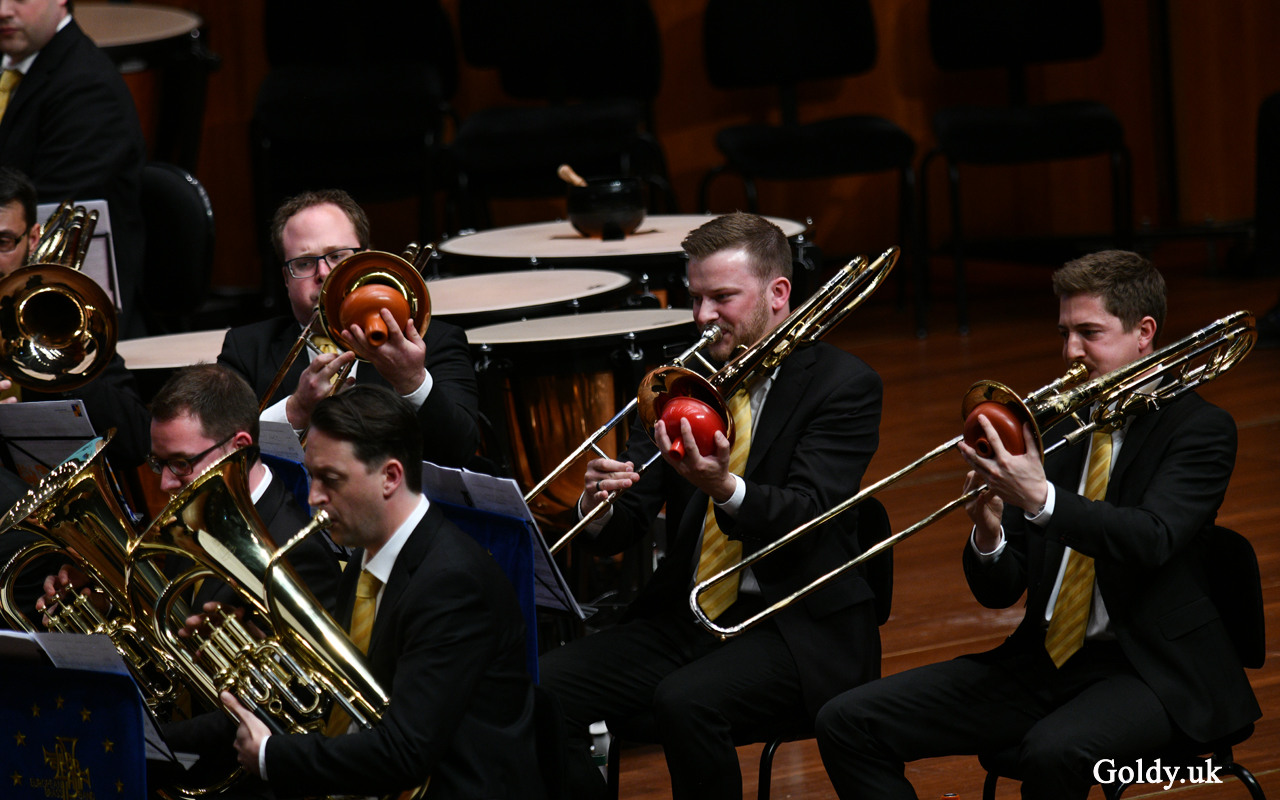
Opening unisons octaves aren't quite secure in intonation, but the swelling effect works well. Occasionally it feels a little overdone. Soprano and flugel both excel, though the scrubbed tamtam is a bit sudden and uncharacteristic (perhaps this is what Mr Neurohr was hoping for?). That said, there's plenty of drama here. The band sound is strikingly voluptuous.
'Fear' is detailed, and the ensemble is tight. It feels to me perhaps that it's all a bit bombastic, and possibly a bit loud, but it's all very thrilling. Soprano is on fine form in 'Tests'.
High Hopes is handled impressively by solo cornet and euphonium, and there's almost an eerie quality to this. Cornet and euphonium duet is sublime. Cadenzas are impressive, though rather texturally direct. This is a 'no messing' approach, but the playing is so good. Cornet and euphonium work well together in the low register. Occasional blemishes to close.
Bass trombone is on form in 'No Matter', and the band equals this quality for the most part. Some minor interruptions in the ensemble, but these are hardly noticeable.
Soloists do well, but there's a tricky moment for soprano which doesn't quite work. Euphonium high E is impressive.
The finale is massive, and I do mean massive. The detail suffers somewhat as a result.
A powerful performance from the home team, but I wonder if it was a bit too powerful. A bit less bombast and a touch more nuance would have been my preference, but this was still a terrific performance with much to admire.
Chris Davies
Friday 26, 16:26:09
1. Brighouse & Rastrick (Prof. David King)
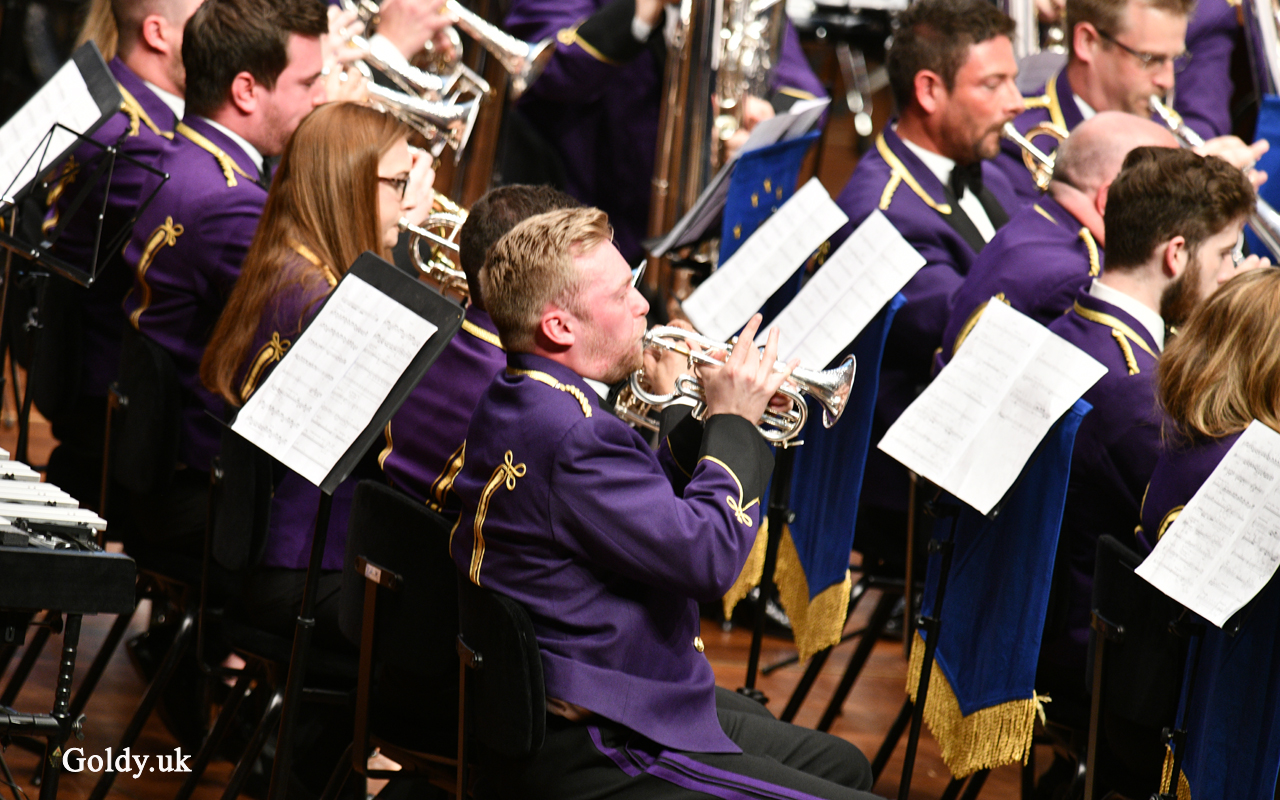
What an atmospheric opening and immediately there is a feeling of mystery tinted with darkness about this. The effects are brought through with brilliance and the sound so well balanced.
'Fear' is edgily tense. This is edge of the seat stuff and the detail flies by in a stream of manic tension. Terrific detail in the basses and again the effects are despatched with brilliance. There's almost a quasi-minimalism about the music as we reach 'High Hopes'.
Fine solo cornet here although euphonium is possibly a touch heavy.
The cadenzas reach for aspirational highs and although there are one or two tiny intonation issues here the atmosphere is so carefully created.
'No Matter' leads off with a fine bass trombone solo and one senses the cumulative momentum here. This has drive and energy certainly, but also a sense of direction that is driving us on to something more.
The questioning of the music that follows is painted beautifully, not without some tiny slips but the blaze of apotheosis that leads us to the final paragraphs is so fabulously done as David King turns
to the audience with score raised aloft.
Overall: A fine opening performance from Brighouse. There was so much to draw from this in terms of its colour, detail and cohesiveness.
Chris Thomas
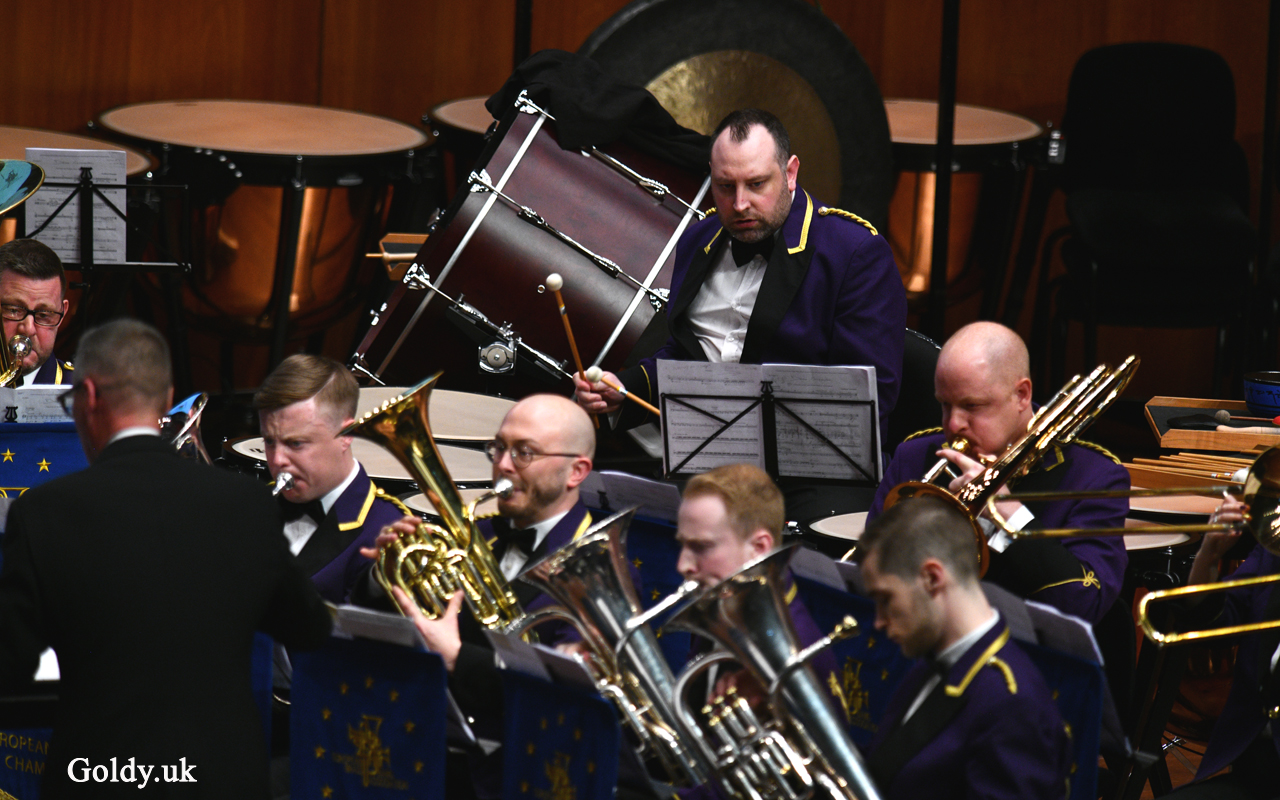
Opening pulsations are as bold and measured as the MD's entrance to the stage. Intonation will be difficult today across the many octaves in these opening passages, but my goodness the bar has been set high here. Such quality. The Call is heralded majestically with superb solo cornet and a thick, impressive band texture. The band sound is truly massive, but always measured. Soprano is just excellent throughout.
We're into the first fast music, and the detail is electrifying throughout the band. Bravo. The psychedelic music comes next — this has the danger of being potentially a bit boring and repetitive, but the MD offers an intoxicating mix of perpetuum mobile and hypnotics.
High Hopes offers up a splendidly confident solo euphonium, and the joining solo cornet sings alongside beautifully. Some slight insecurity of intonation in the lower register, but this hardly detracts. Ensuing solo interjections are impressive, though not error-free. Flugel is so classy — cool as you like.
The tuned percussion jamboree commences in 'No Matter', and the ensemble and technique on display is breathtaking. Band and percussion marry in perfect partnership. This is fine playing.
Soprano and euphonium take Dear Cassandra into reflective territory, both soaring into the very high register. Huge challenges for both players which they meet with aplomb. That'll be a tough act to follow. Things get funky with a seamless segue in style, and we are treated to an utterly thrilling finale with the band sound fully revealed. What a sound it is. Tremendously exciting ending to a performance that may well set the standard all day.
Not a perfectly clean performance, but who cares? An utterly exciting, colourful performance with some serious conviction on display. I was on the edge of my seat all the way through. The Professor strikes again.
Chris Davies
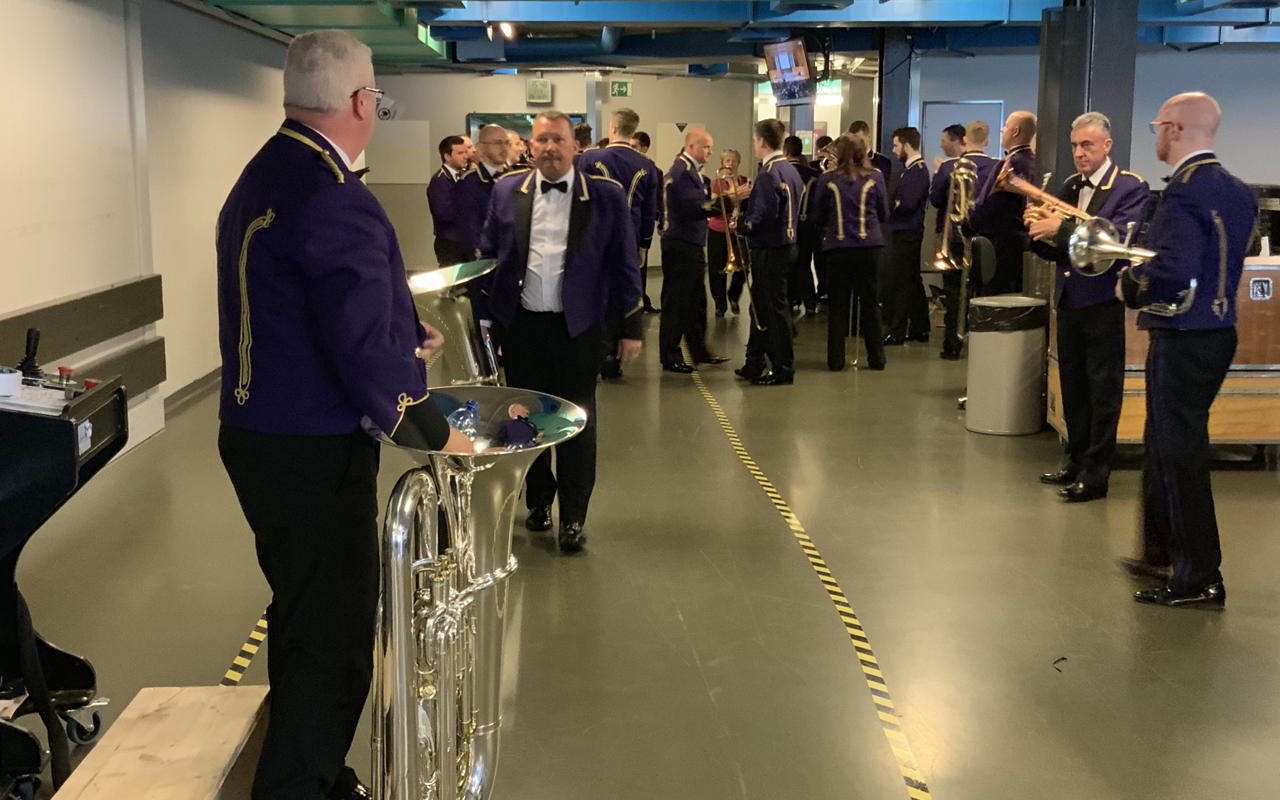
Backstage in waiting
Friday 26, 16:12:54
Expectations are high...
Entrance for the first ensemble of Brighouse. I feel tension from the auditorium a very exquisite idea of music competition. Allez en la musique @4barsrest @EBBC2019 #eurobrass19
Julien Chanot (@ChanotJulien) April 26, 2019
Friday 26, 16:06:00
What a great trio to play Bugler's Holiday...
#eurobrass19 Three generations of great cornet players here in Montreux @IanPorthouse, Harry Porthouse, and Hans Gansch https://t.co/t1f5bXP5ew pic.twitter.com/fTX7uKVTYZ
— 4barsrest.com (@4barsrest) April 26, 2019
Friday 26, 16:01:15
Composer Talk
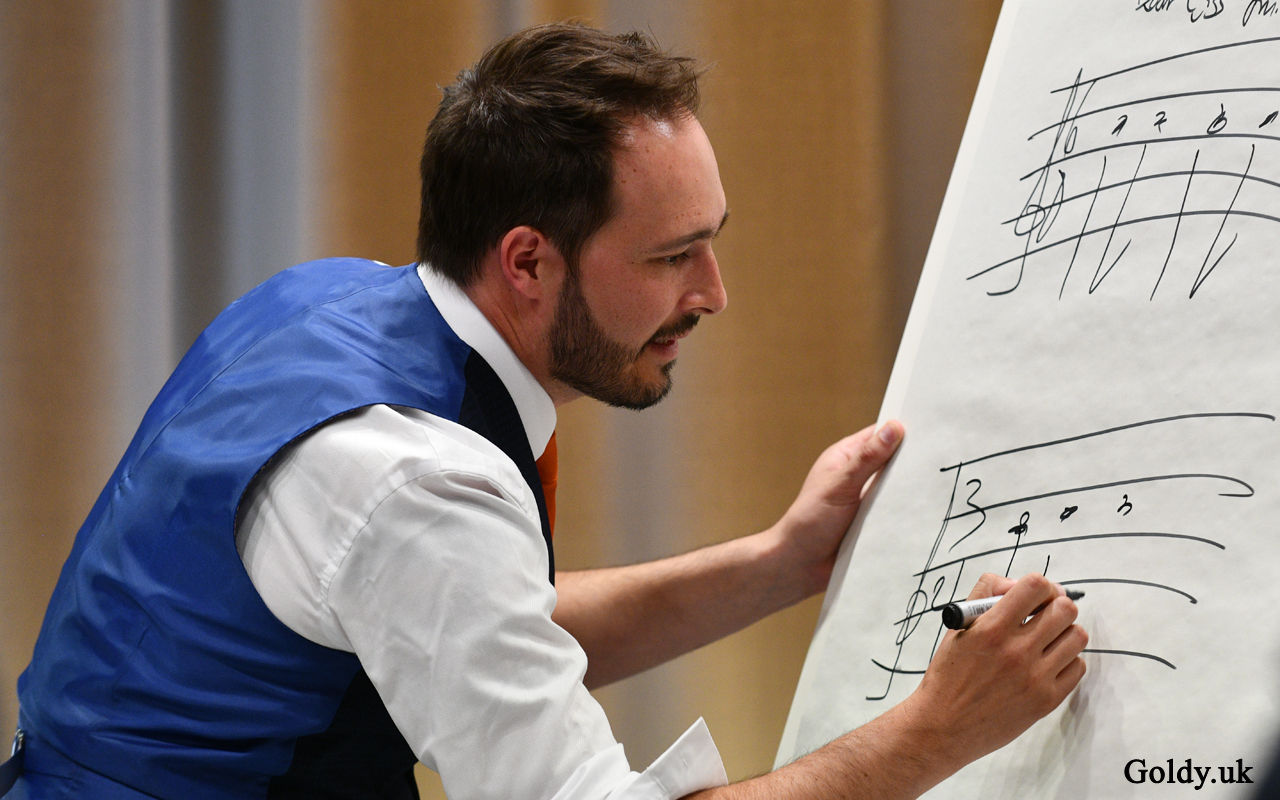
Ludovic Neurohr composer of 'Dear Cassandra' gives a illustrated explanation to his test piece
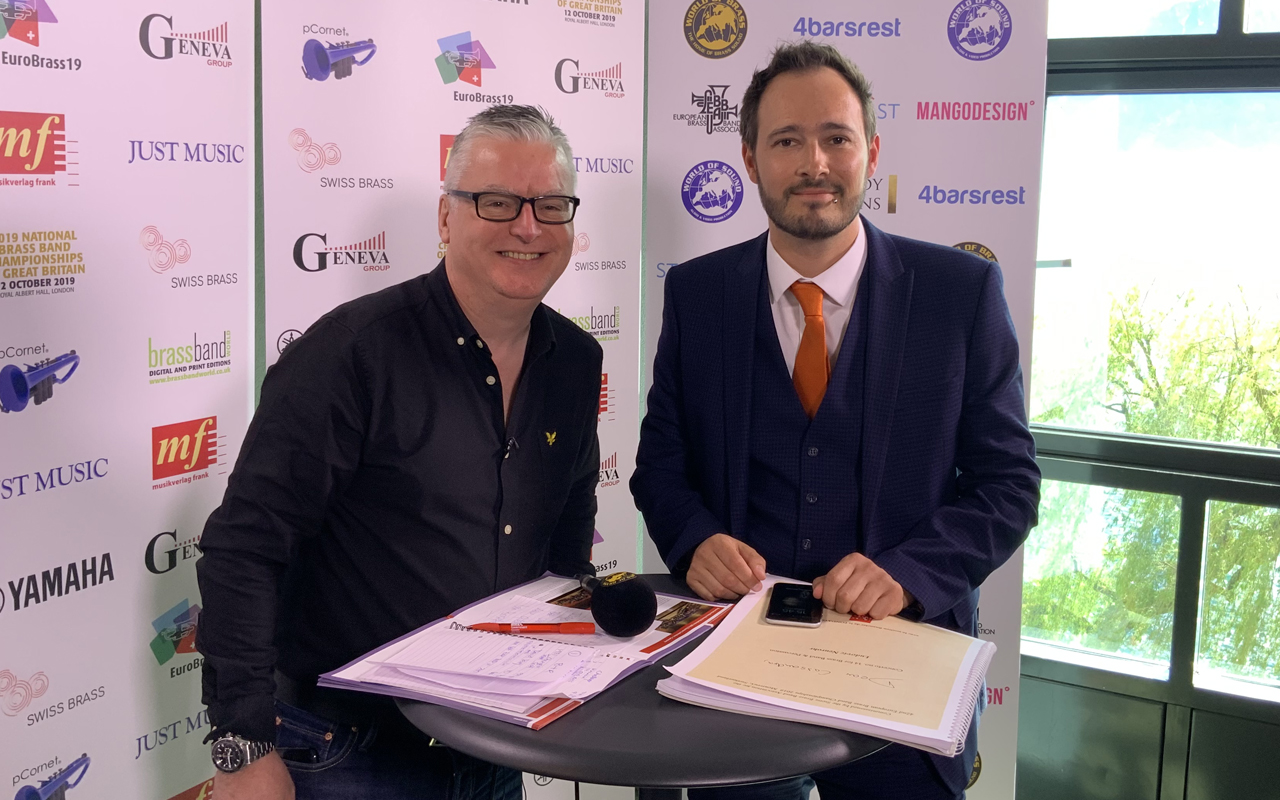
Following the composer's talk Ludovic Neurohr visited the studio to speak with Iwan Fox
Friday 26, 15:17:03
Draw:
Championship Section:
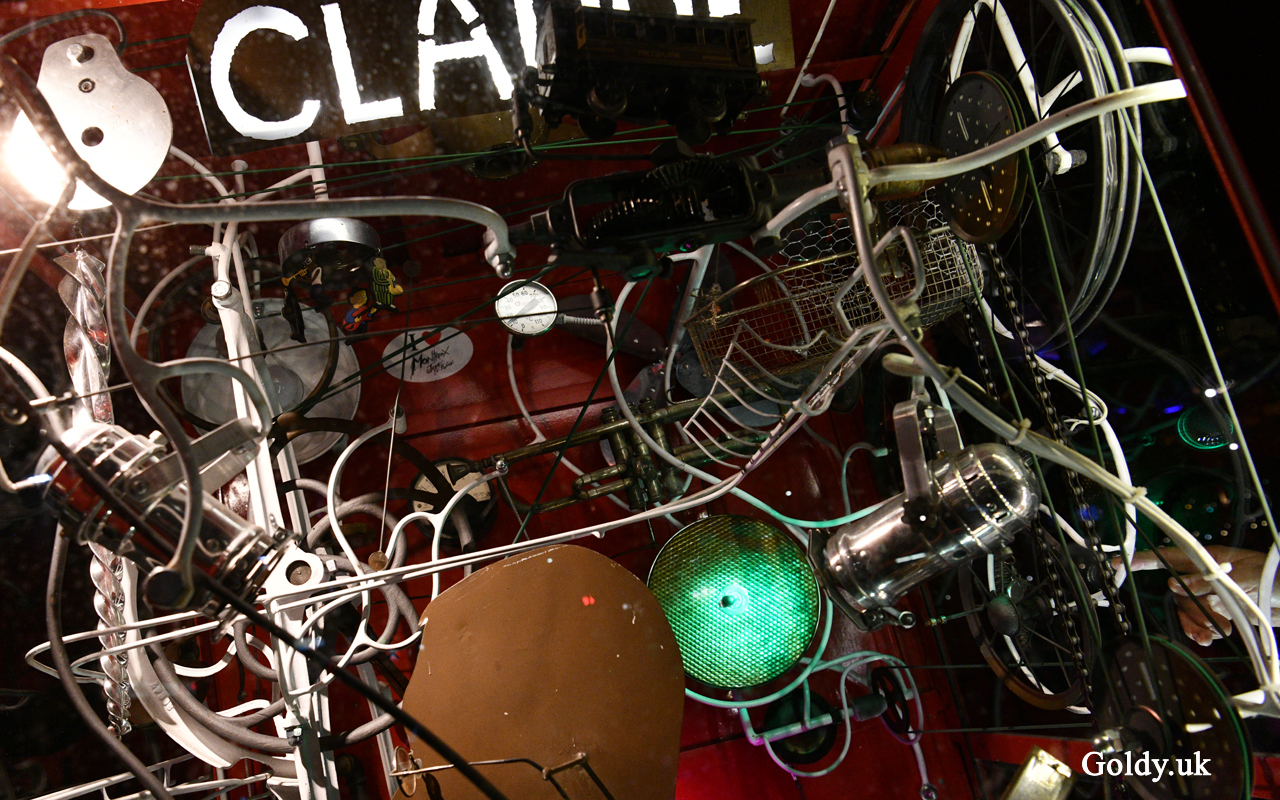
Musical mobile on the lakeside
Test Piece: Dear Cassandra (Ludovic Neurohr)
Stravinski Auditorium, Montreaux
Adjudicators:
Ian Bousfield, Herve Grelat, Bert Van Thienen
1. Brighouse & Rastrick (Prof. David King)
2. Brass Band Burgermusik Luzern (Michael Bach)
3. Provinciale Brass Band Groningen (Richard Visser)
4. Concord Brass Band (Jesper Juul Windahl)
5. Gota Brass Band (Michael Thomson)
6. 3BA Concert Band (Luc Vertommen)
7. Brass Band Oberosterreich (Ian Porthouse)
8. Brass Band Willebroek (Frans Violet)
9. Italian Brass Band (Filippo Cangiamila)
10. Paris Brass Band (Florent Didier)
11. Eikanger-Bjorsvik Musikklag (Ingar Bergby)
12. Cory Band (Philip Harper)
13. Valaisia Brass Band (Arsene Duc)
Friday 26, 14:35:05
Comments and Analysis
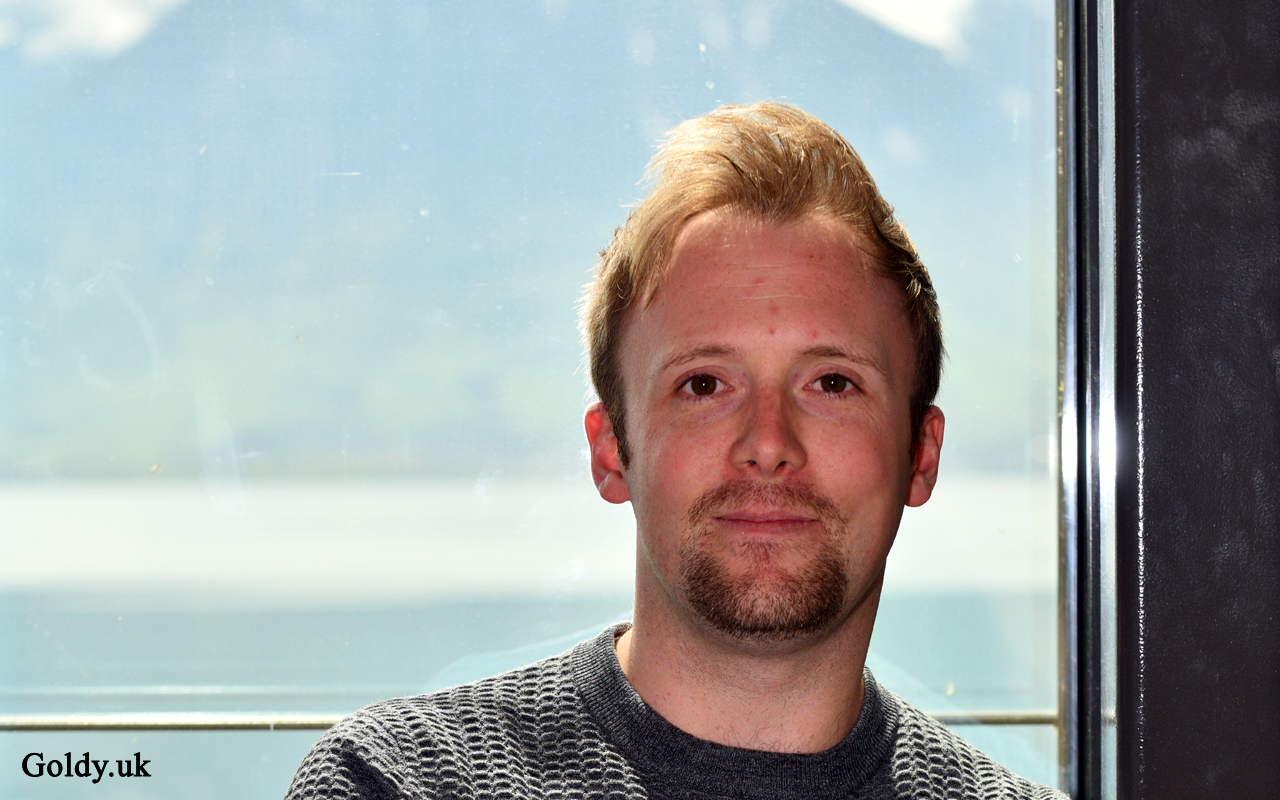
Chris Davies
"I am truly looking forward to providing comments and analysis for this Championships. Having played on this stage in 2011 with Tredegar Band I feel genuine connection with the players playing on the same platform this year.
The whole piece presents a formidable challenge and I am particularly interested in how bands approach the opening phrases in this work which poses a tremendous test in itself."

Chris Thomas
"We are in for quite a weekend of music but ahead of the own choice blockbusters on Saturday, we have a set test of monumental challenges in Ludovic Neurohr's Dear Cassandra.
It's a work that is not only going to challenge the players to extremes (there are going to be a few nervy soprano and euphonium players around to name just two!) but also the conductors, who will face the challenge of steering a course through a work of stylistic multiplicity and multi-layered detail.
And with a sold out auditorium that will be packed to the rafters and an intriguing draw, I'm anticipating a terrific atmosphere as battle commences!"
Friday 26, 13:39:13
Enjoying Montreux
Fantastic day yesterday in beautiful Montreux as one of the judges for the European Brass Band Championships Composing Competition. Thank you to @EBBC2019 for inviting me and congratulations to composers @DanHallComposer @PaulSaggers @StijnAertgeerts 🎵?#eurobrass19 pic.twitter.com/dvP1lH9Oe3
— Lucy Pankhurst (@lucypankhurst) April 26, 2019
Friday 26, 13:13:14
Opening Ceremony & Draw
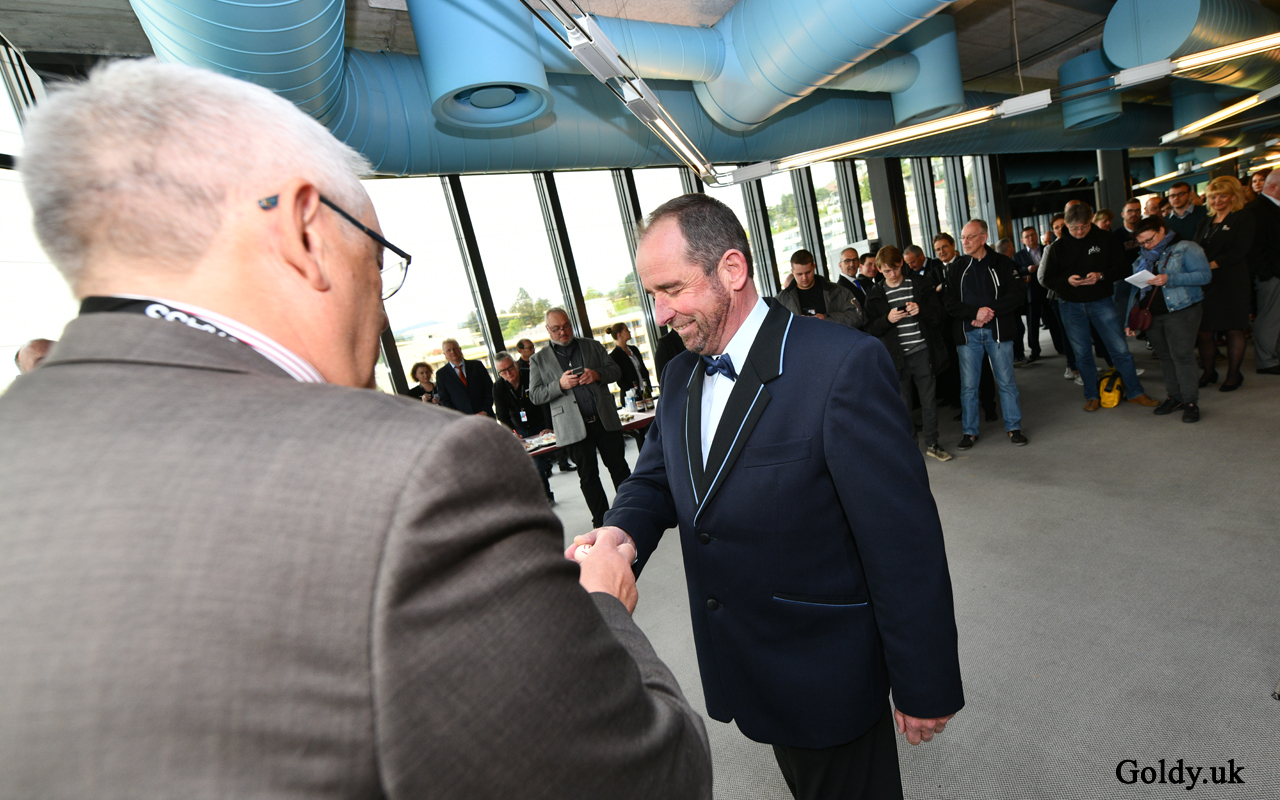
Defending champions Valasia take their draw number
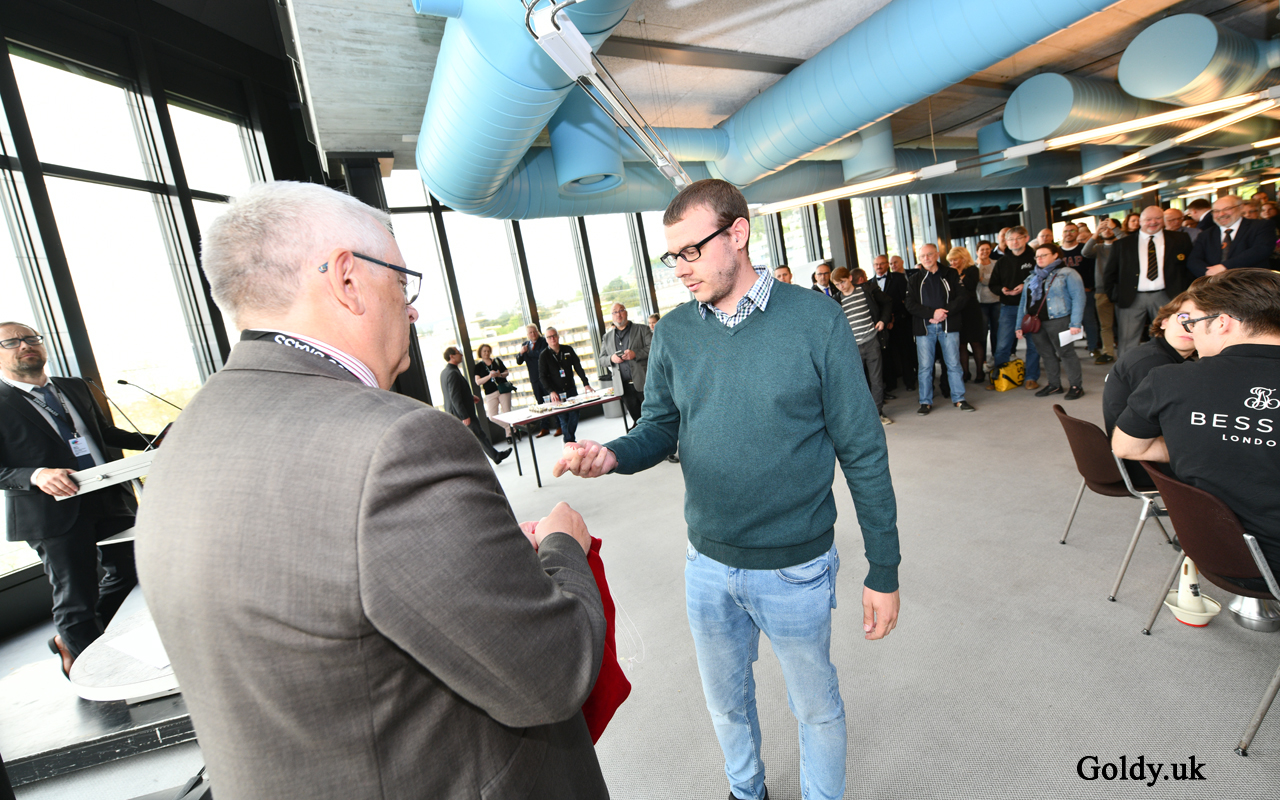
Malaga take their draw for the Challenge Section. The first ever band to represent Spain
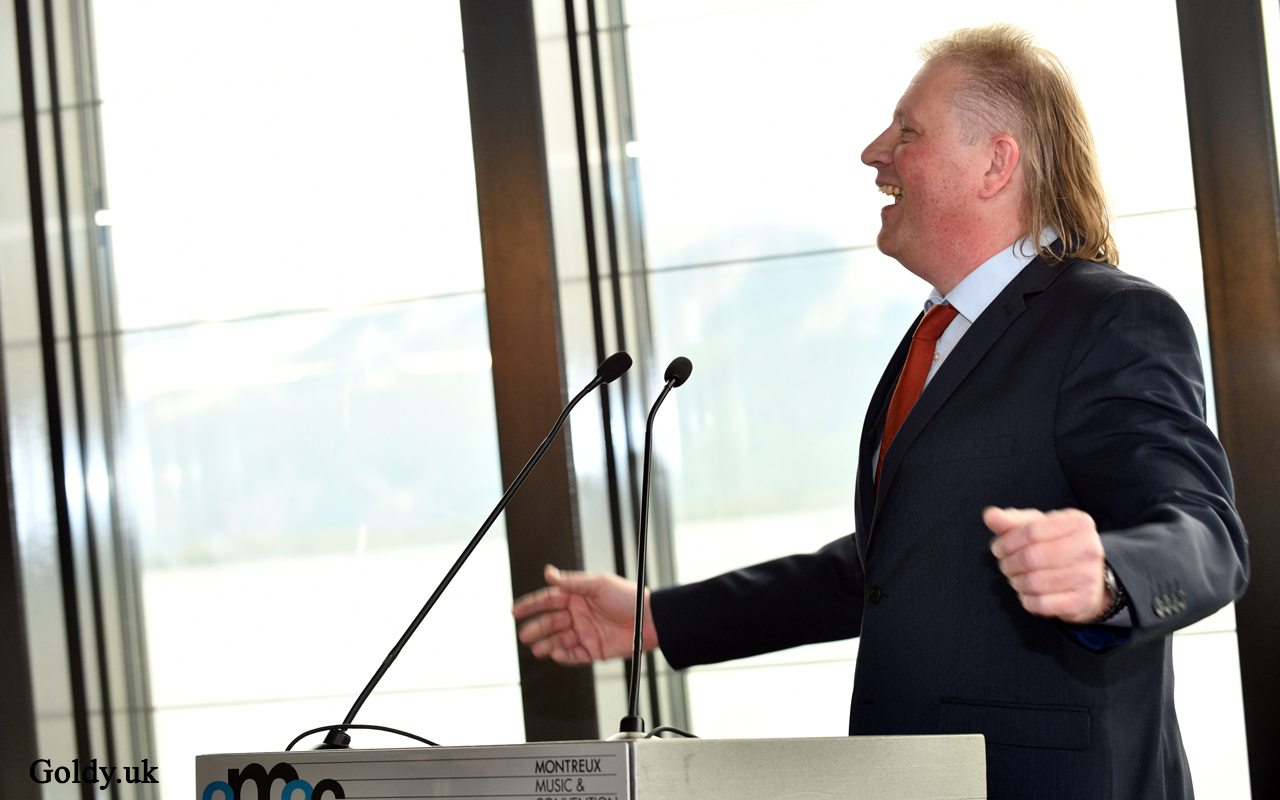
Regis Gobet welcoming address at the opening ceremony on behalf of EBBA
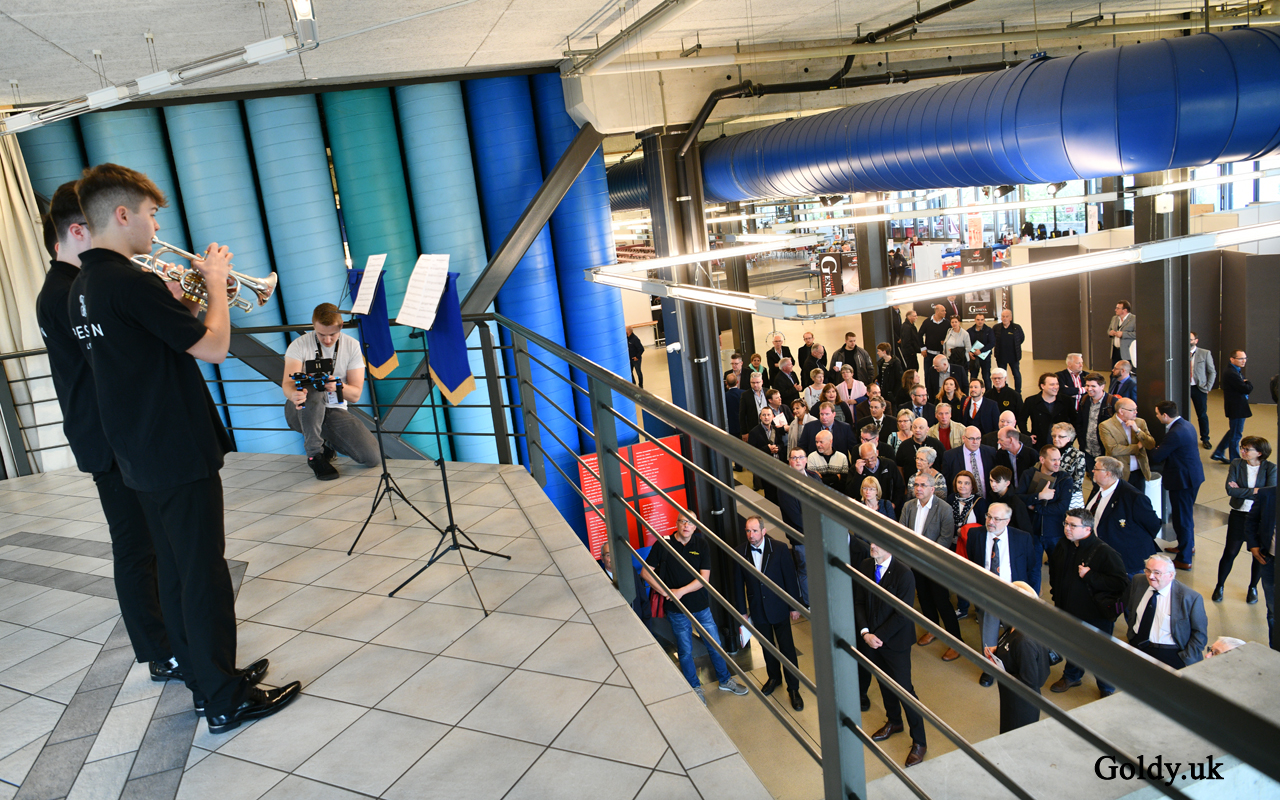
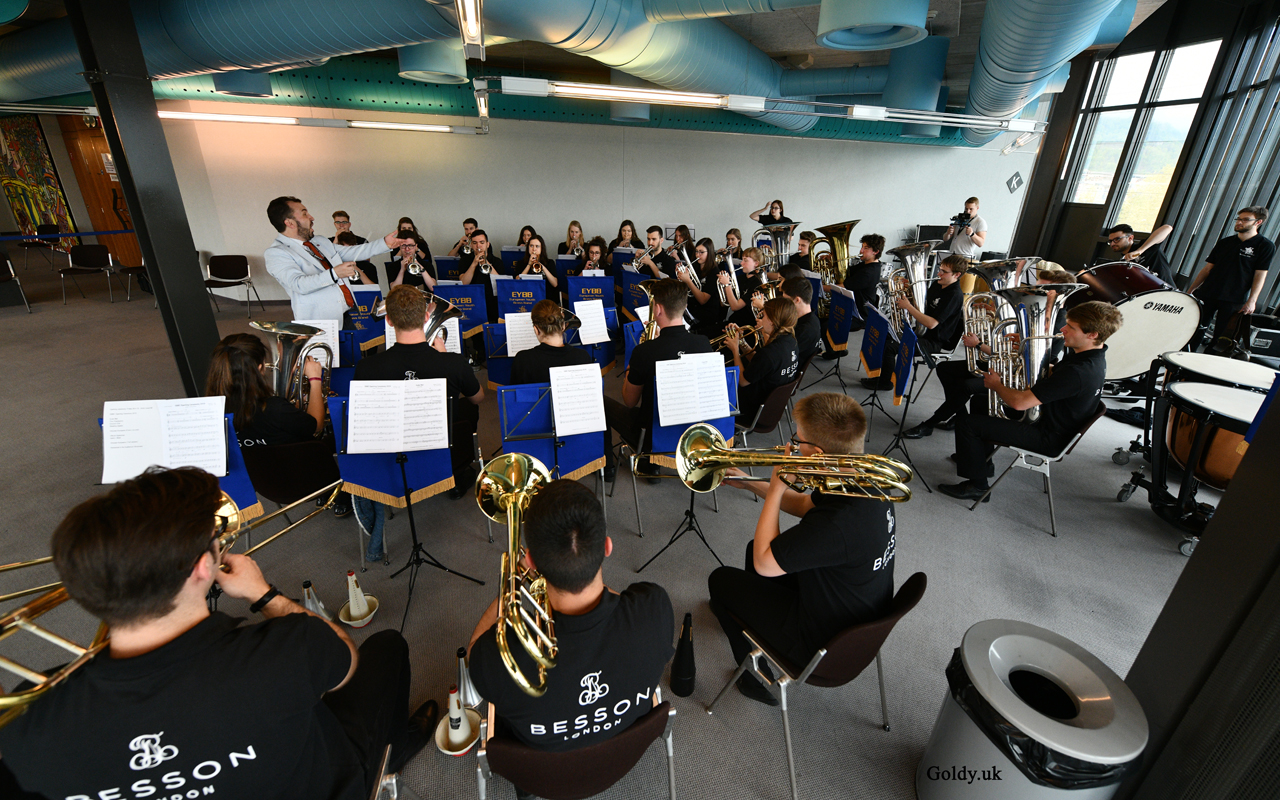
Fanfare and Introduction at the opening ceremony
Friday 26, 12:54:58
Looking forward to the action
Friday 26, 11:37:50
Stravinski Auditorium
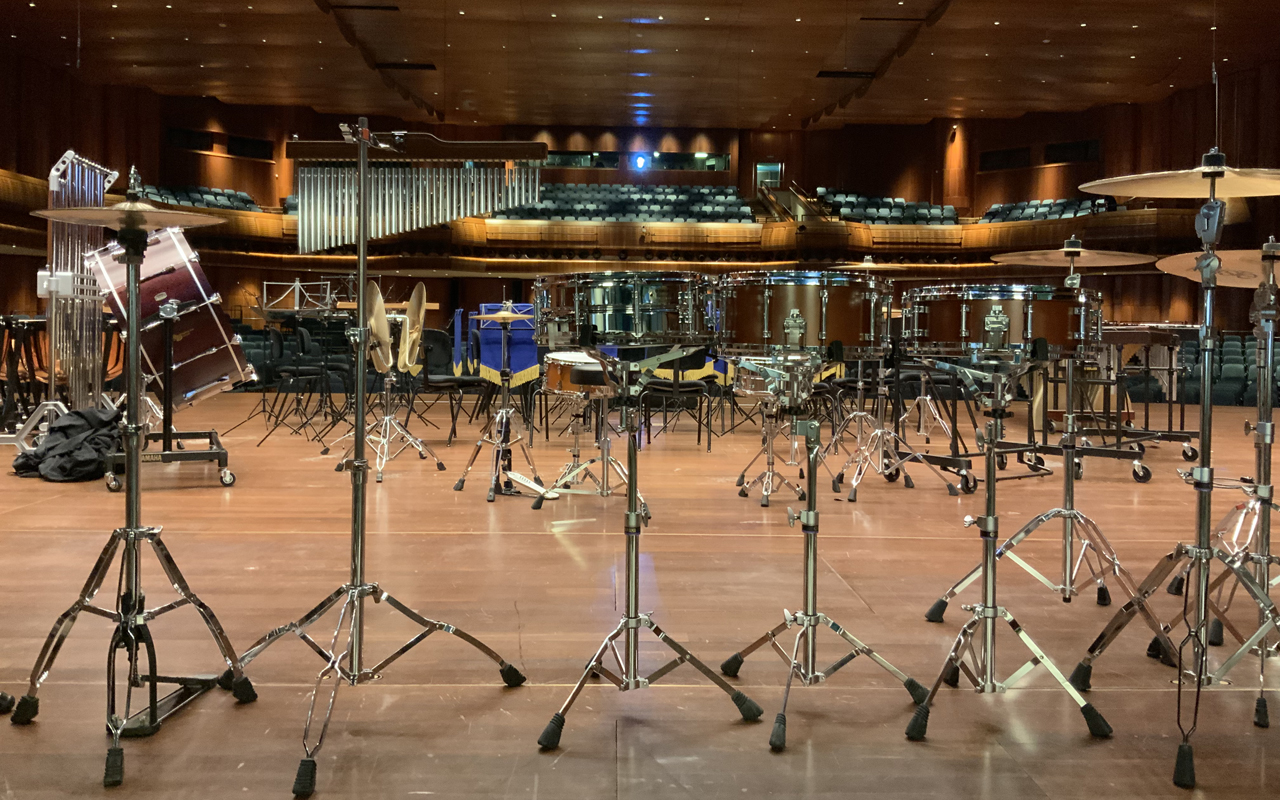
Whilst the Opening Ceremomy is being undertaken the stage is set ready for the set work contest later
Friday 26, 10:47:02
EBBA Press Conference
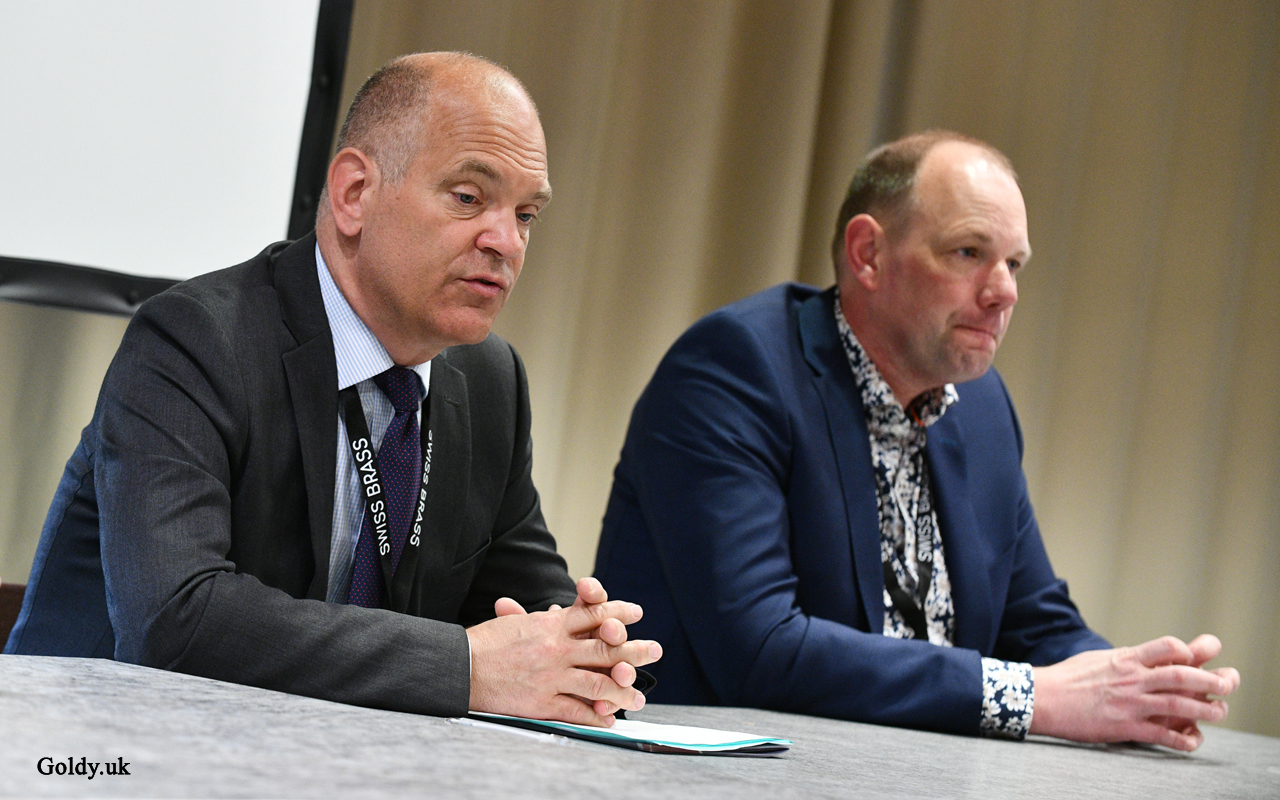
Ulf Rosenberg (President) and Kor Niehof (General Secretary) hosting the Friday morning press conference
First business of the day and and attendance by Iwan Fox at the EBBA Press Conference.
Covering a range of topics including future host nations, possible cultural funding streams and other areas of concern — most of the questions posed by the 4BR editor.
Friday 26, 10:27:58
Good morning from Montreux
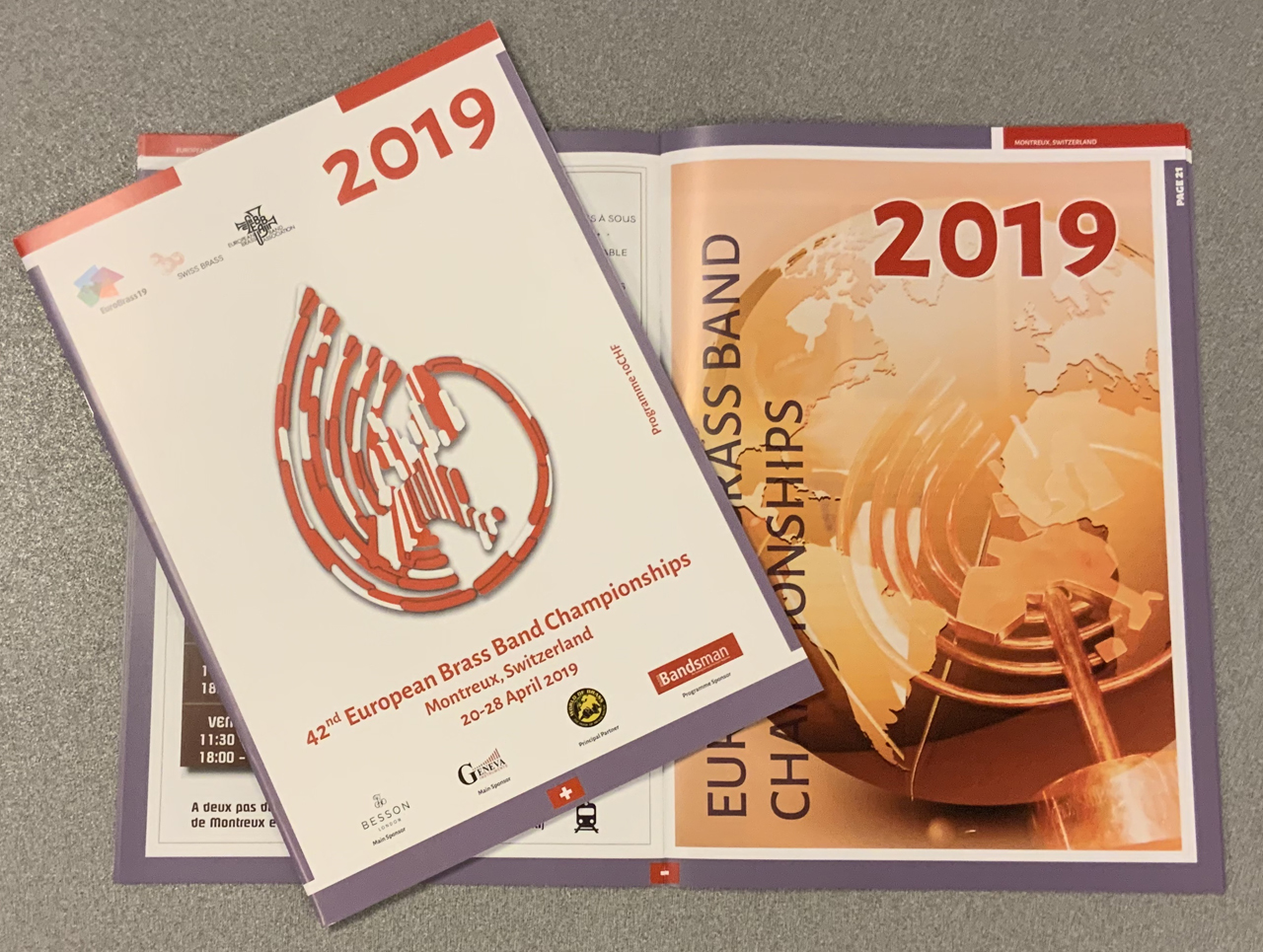
And its misty morning on the banks of Lake Geneva, although all the focus will be on the contest action later today.
Everyone is setting things up here to get ready for the live broadcast of the action, so if you haven't yet signed up, make sure you do so.
We are just off to do a bit of filming and will back to you as soon as possible.
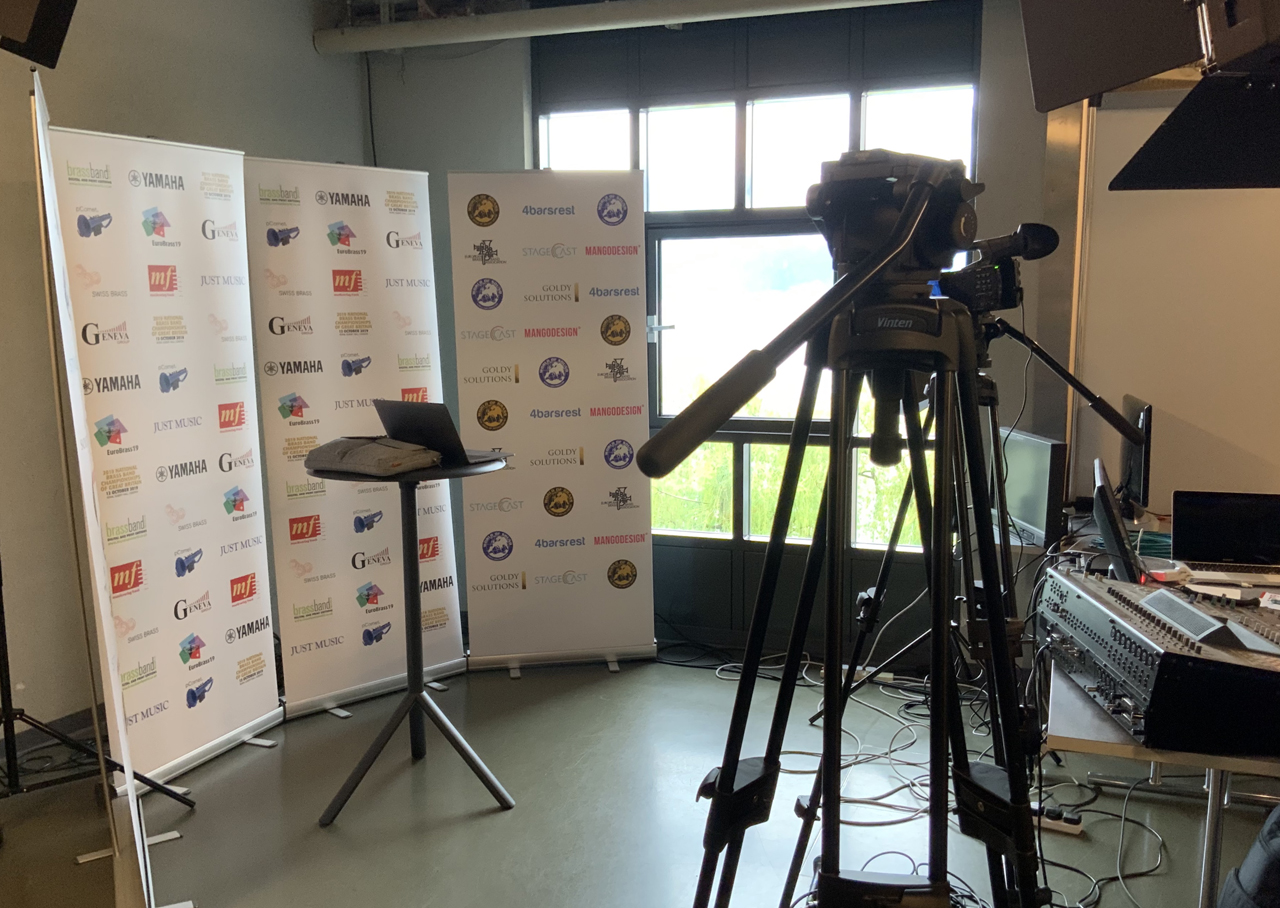
Setting things up here to get ready for the live broadcast
Thursday 25, 23:21:29
Presentation: 7th European Composers Competition
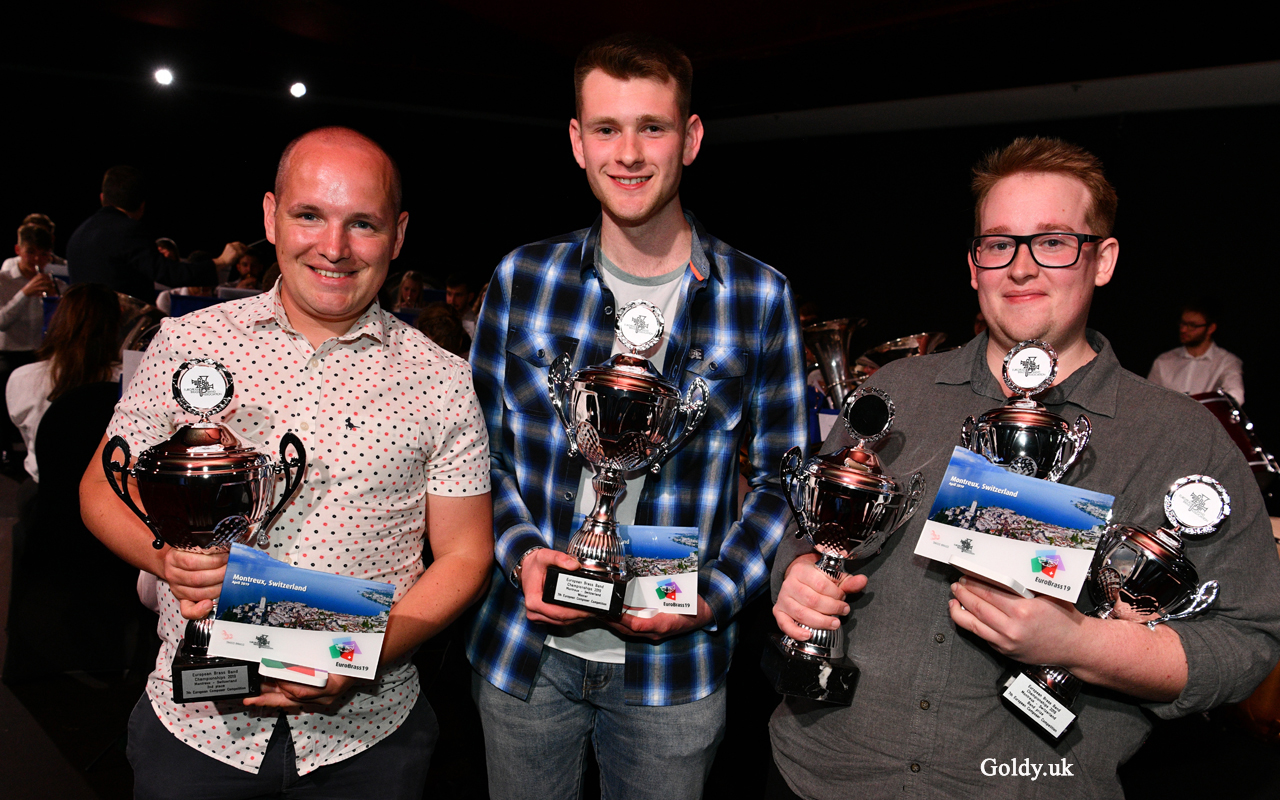
Full news report can be read at: https://www.4barsrest.com/news/detail.asp?id=37760
Result:
1. Daniel Hall with 'A Dialogue of Transmogrified Souls'
2. Paul Saggers with 'Ironbright'
3. Stijn Aertgeerts with 'Bipolarity'
Audience Prize: Stijn Aertgeerts with 'Bipolarity'
Band Prize: Stijn Aertgeerts with 'Bipolarity'
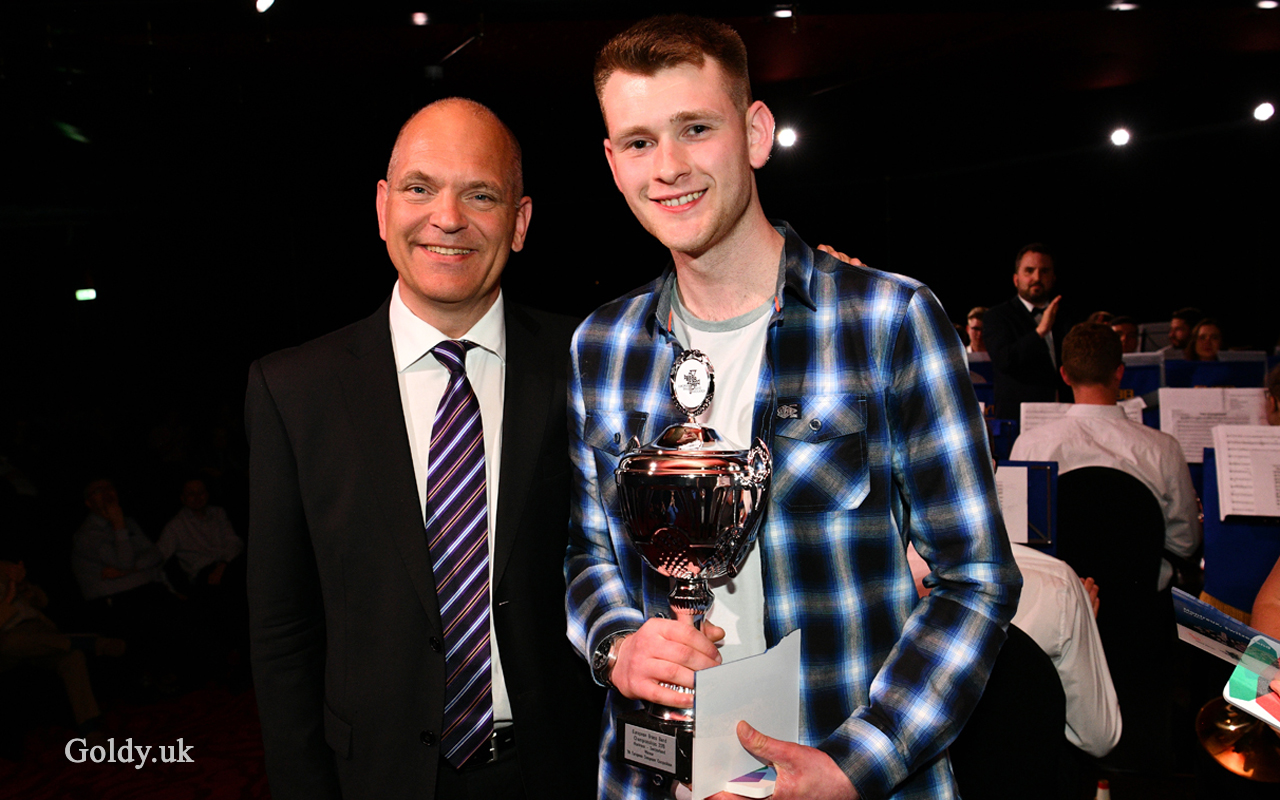
Thursday 25, 23:20:13
Eikanger-Bjorsvik Musikklag
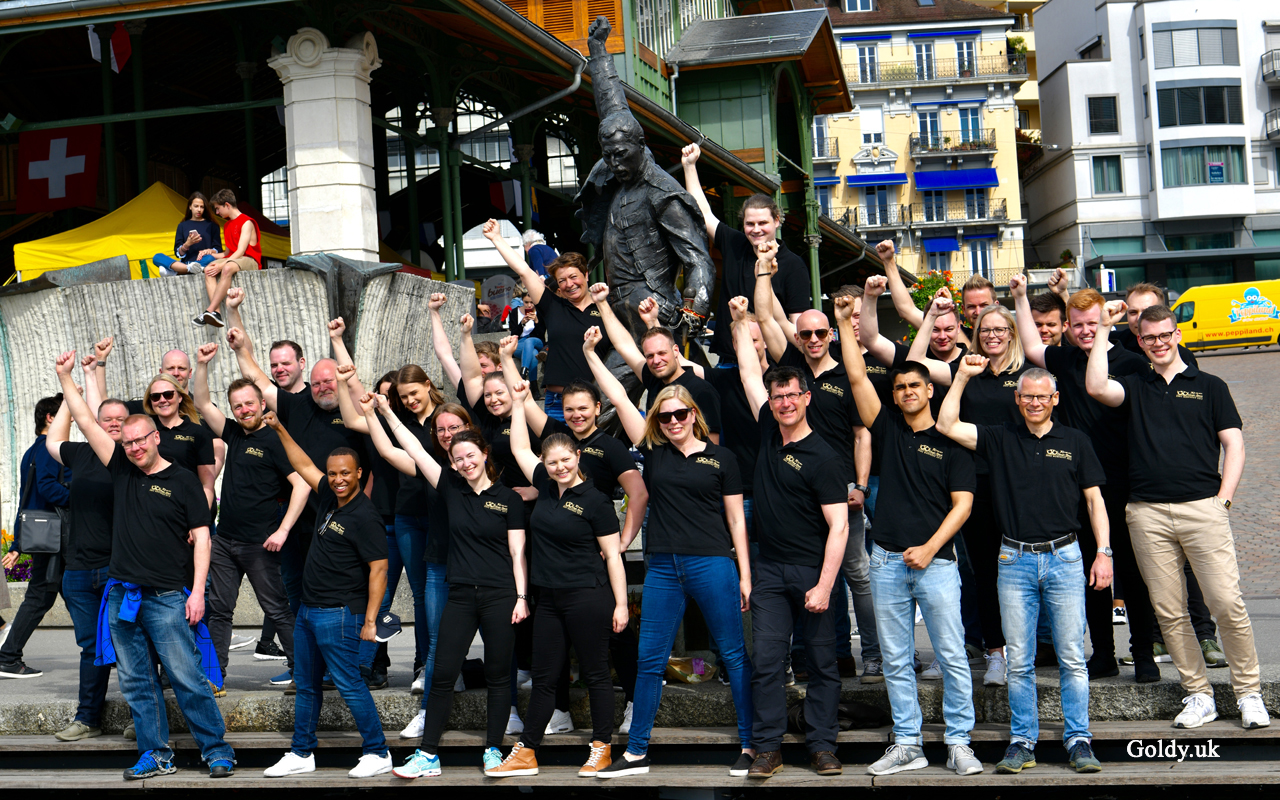
Assuming the pose beside Freddie Mercury
Thursday 25, 23:17:46
EYBB 2019
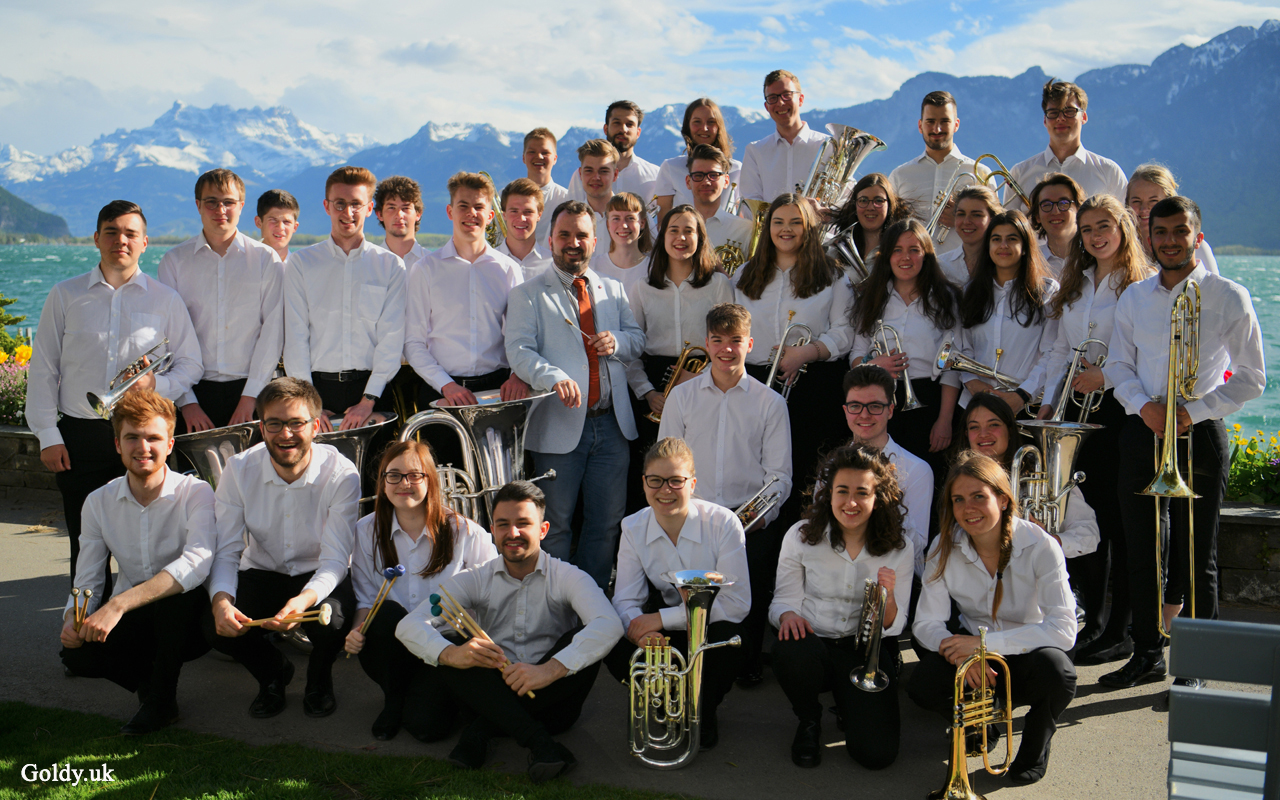
EYBB group beside Lake Geneva
Thursday 25, 14:36:18
Simply fantastico!
Iwan Fox meets up with the one and only Lito Fontana, who has been working the Malaga Brass Band to get them to the European Championships in Montreux
Thursday 25, 13:58:46
European Memories
Iwan Fox catches up with David Thornton to share some of his European Championship memories...
Thursday 25, 13:42:26
Images from Montreux
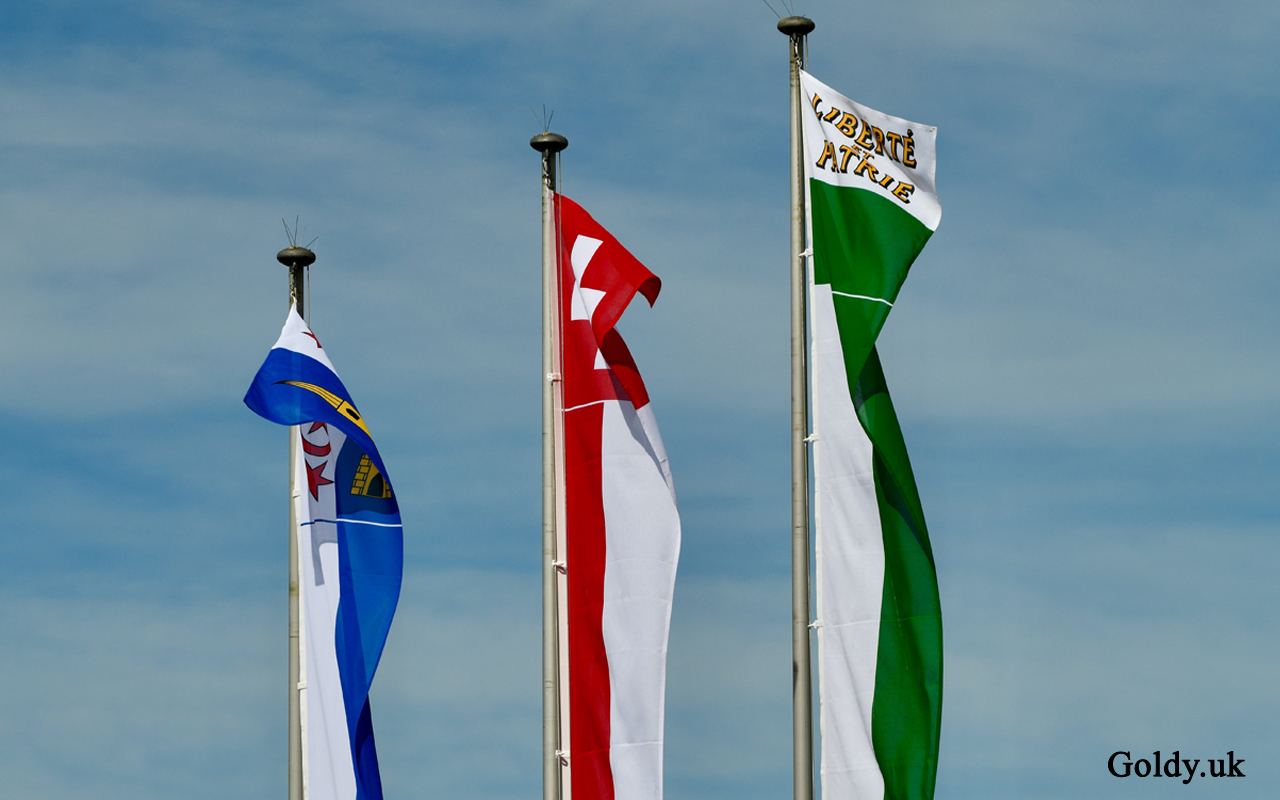
The banners are flying in Montreux

2M2C — Venue home of the Stravinski Auditorium
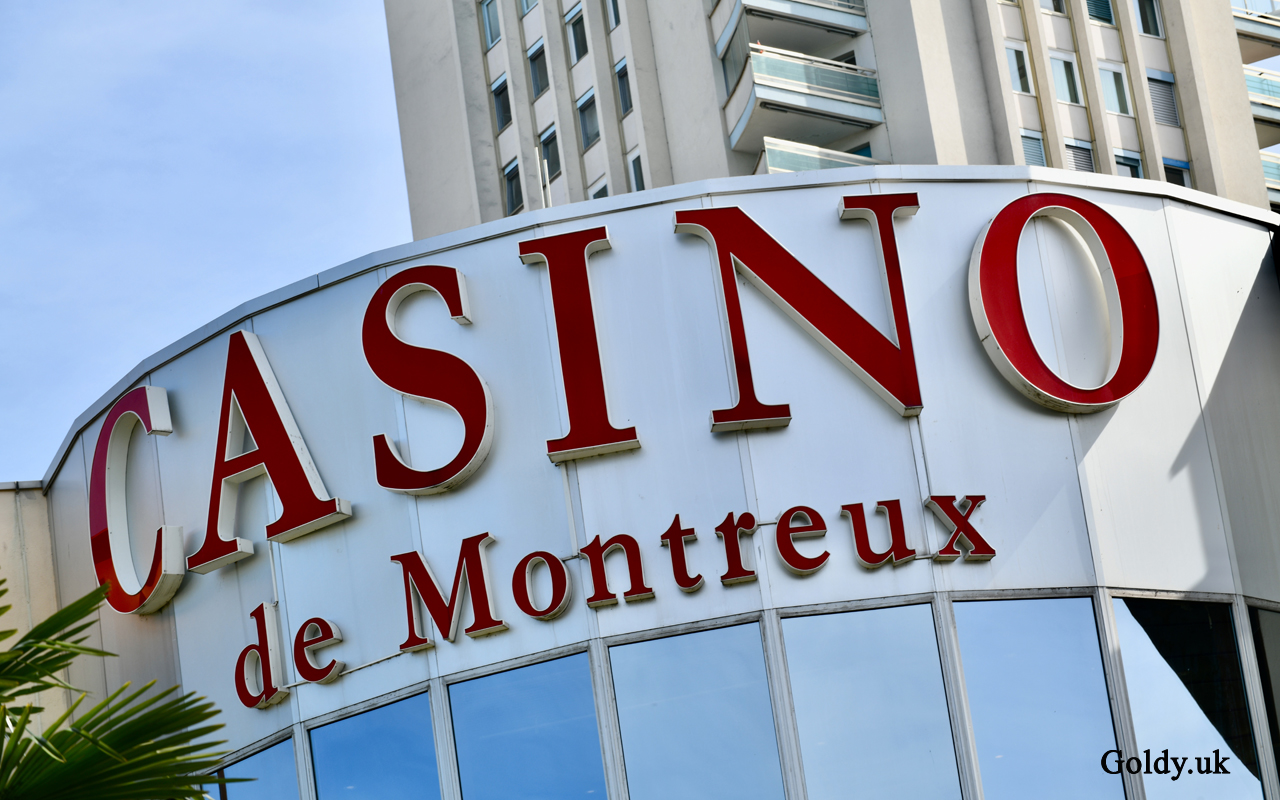
Montreux Casino venue for the Composer Competition
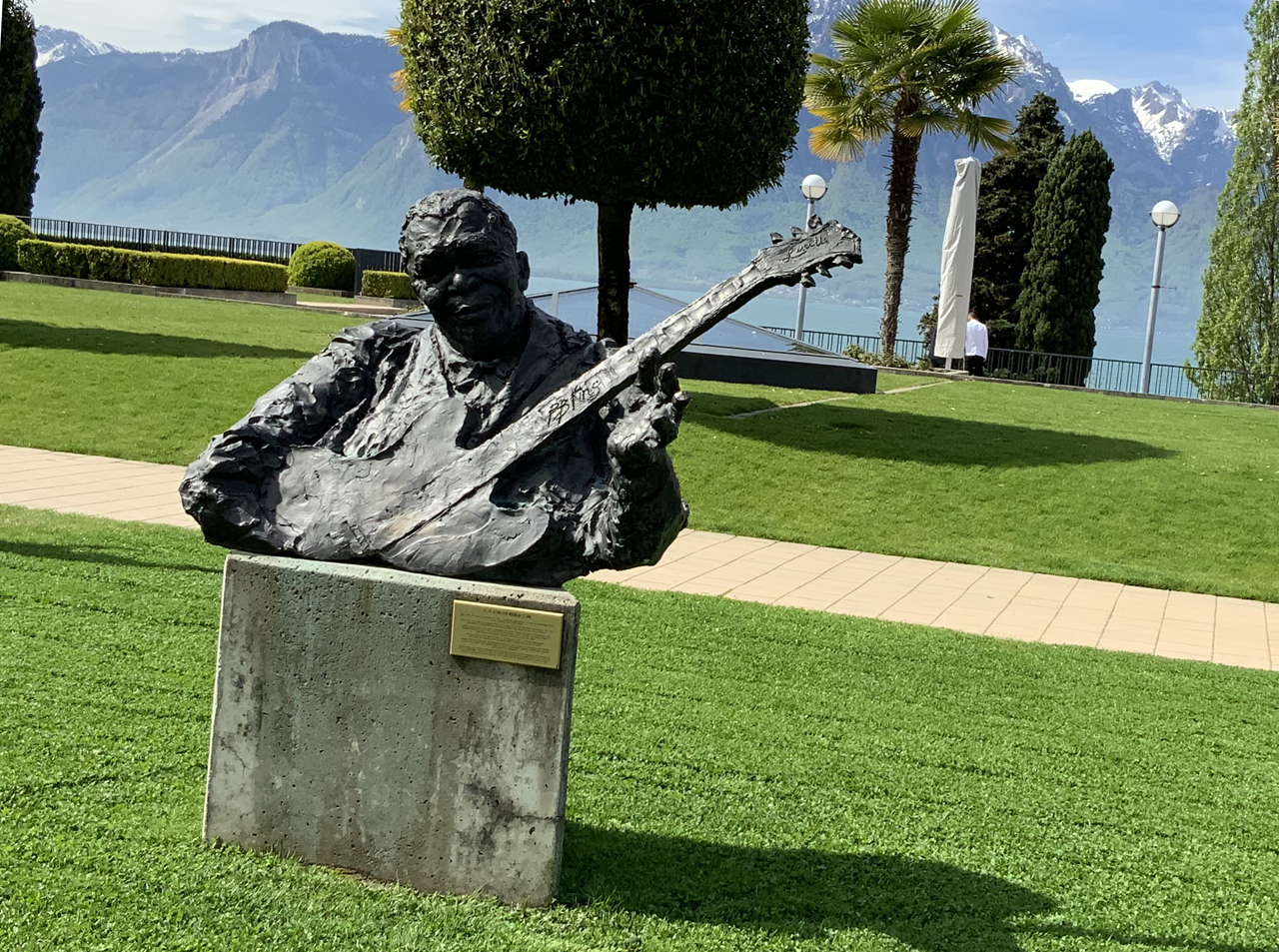
Jazz & Blues Garden beside 2M2C
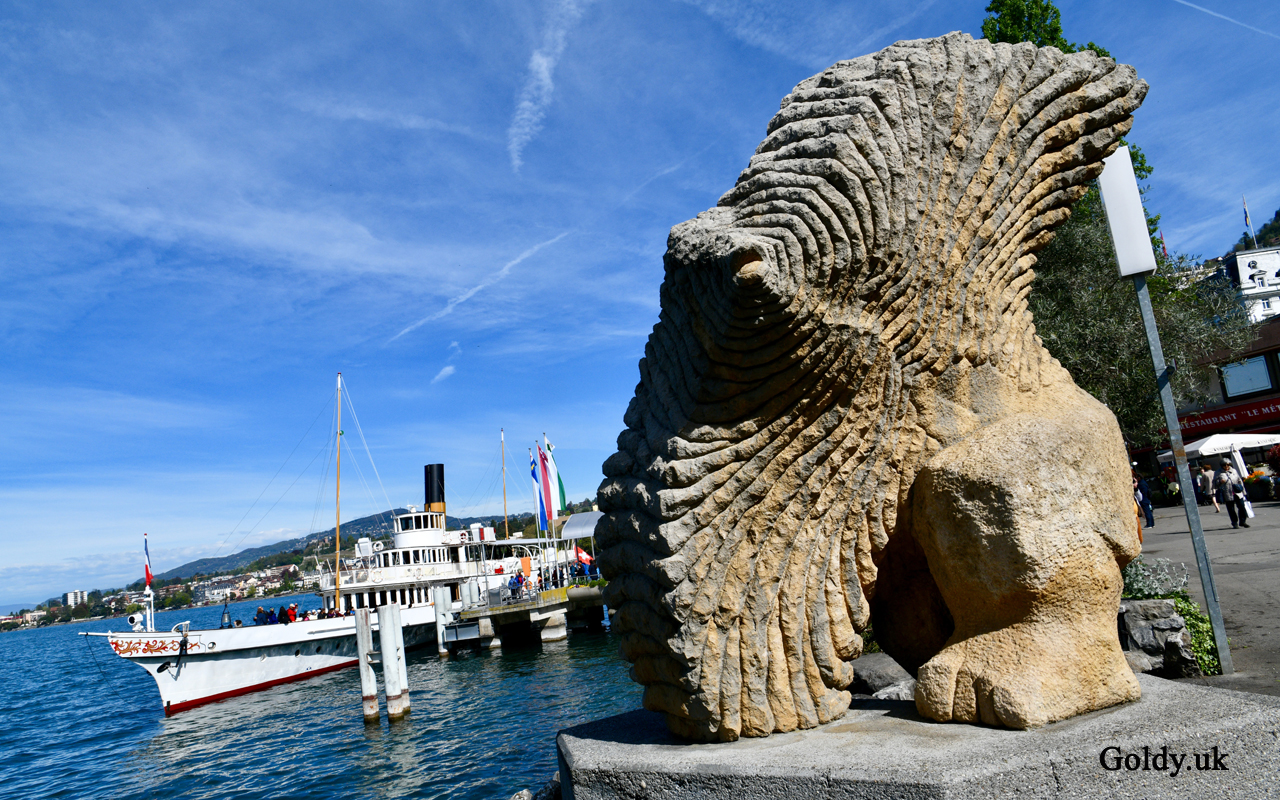
Cruising on the lake
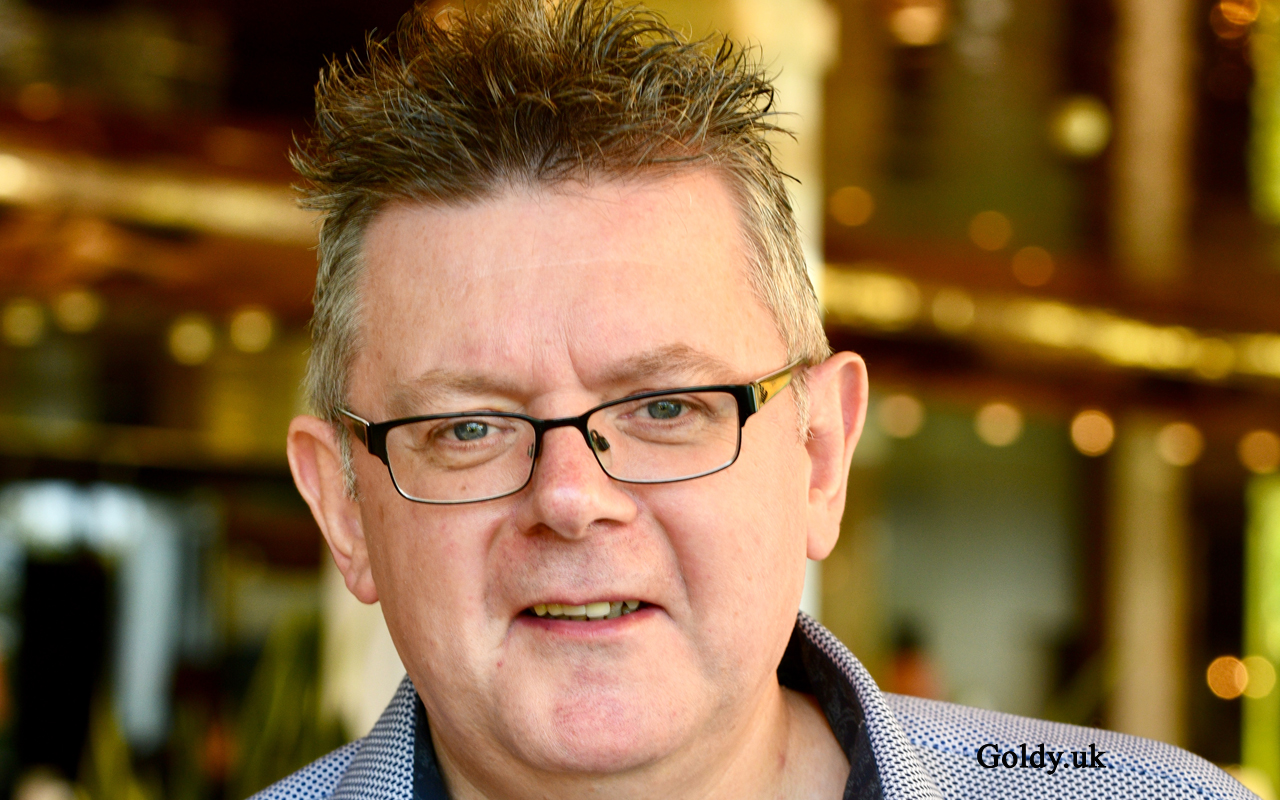
Kenneth Crookston — Chief Executive Officer at Brass Bands England
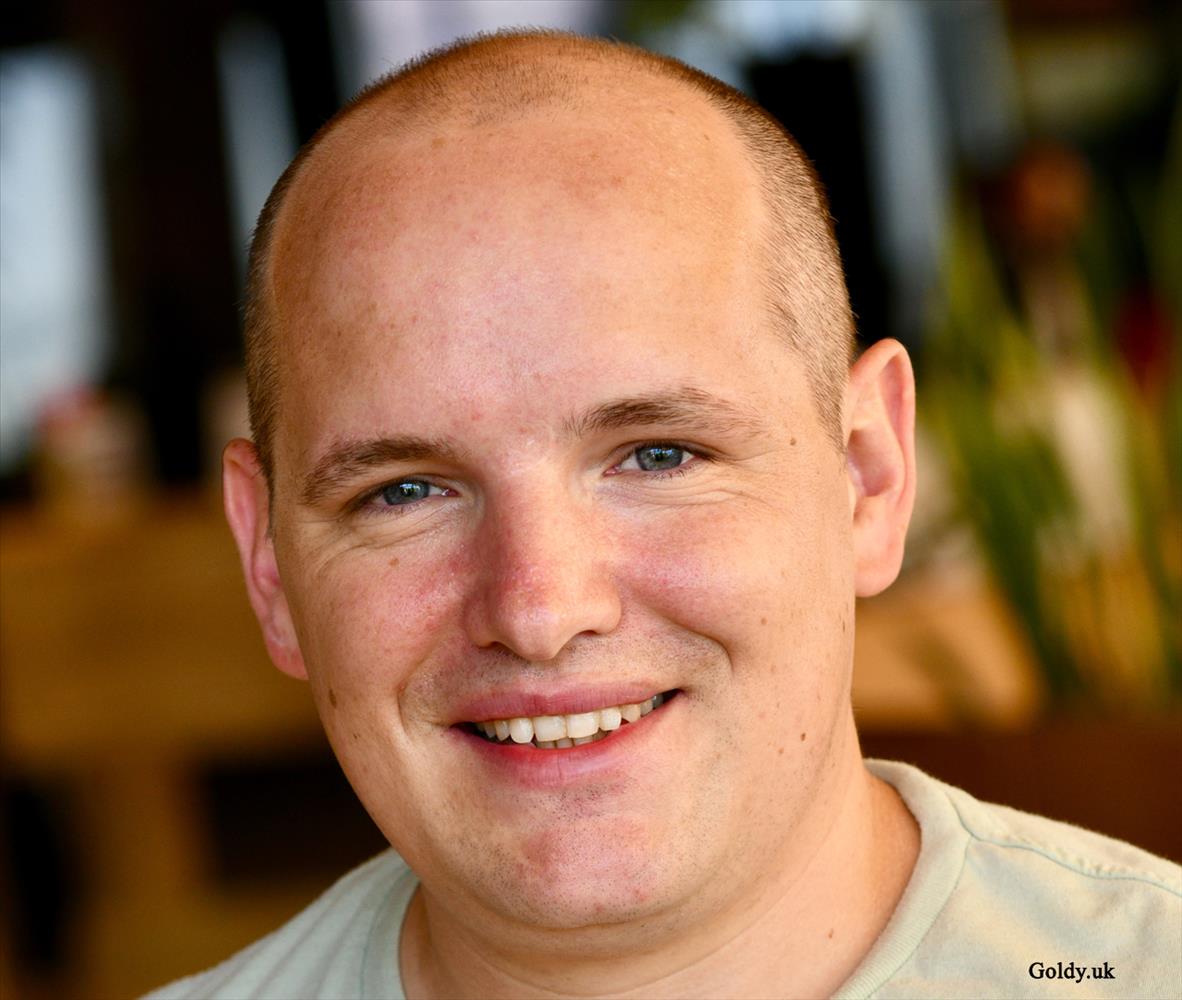
Paul Saggers composer of 'Ironbright' to be performed at the Composer Competition
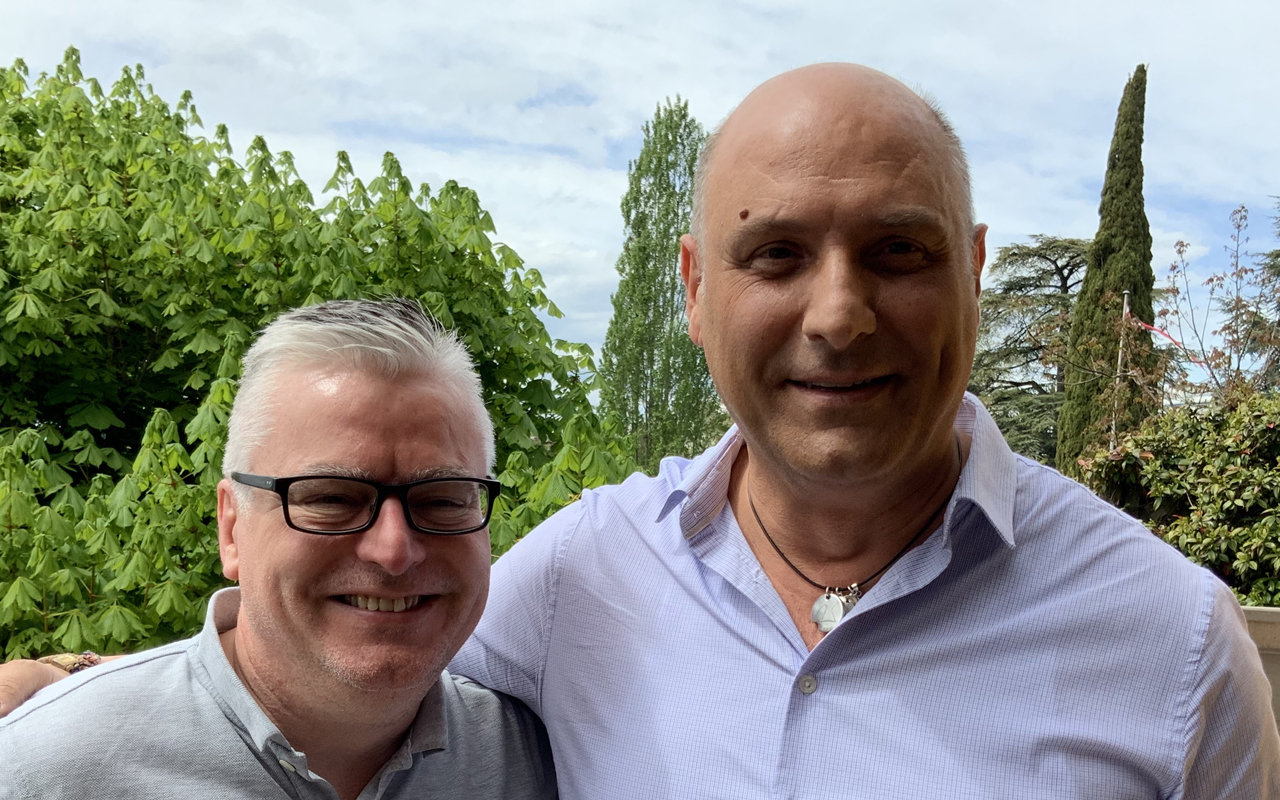
Meeting inspirational Lito Fontana, one of Europe's finest trombone players
Thursday 25, 13:38:16
The man behind A Dialogue of Transmogrified Souls
Iwan Fox talks to composer Daniel Hal , whose work, 'Dialogue of Transmogrified Souls' will be performed at the European Composers Competition in Montreux this evening.
The man behind Ironbright
Iwan Fox talks to composer Paul Saggers, whose work, 'Ironbright' will be performed at the European Composers Competition in Montreux this evening.
Thursday 25, 11:30:47
European memories
Iwan Fox talks to Kenny Crookston and Stein Skorpholm about some of their personal memories of the European Championships
Thursday 25, 10:55:44
Montreux mini quiz
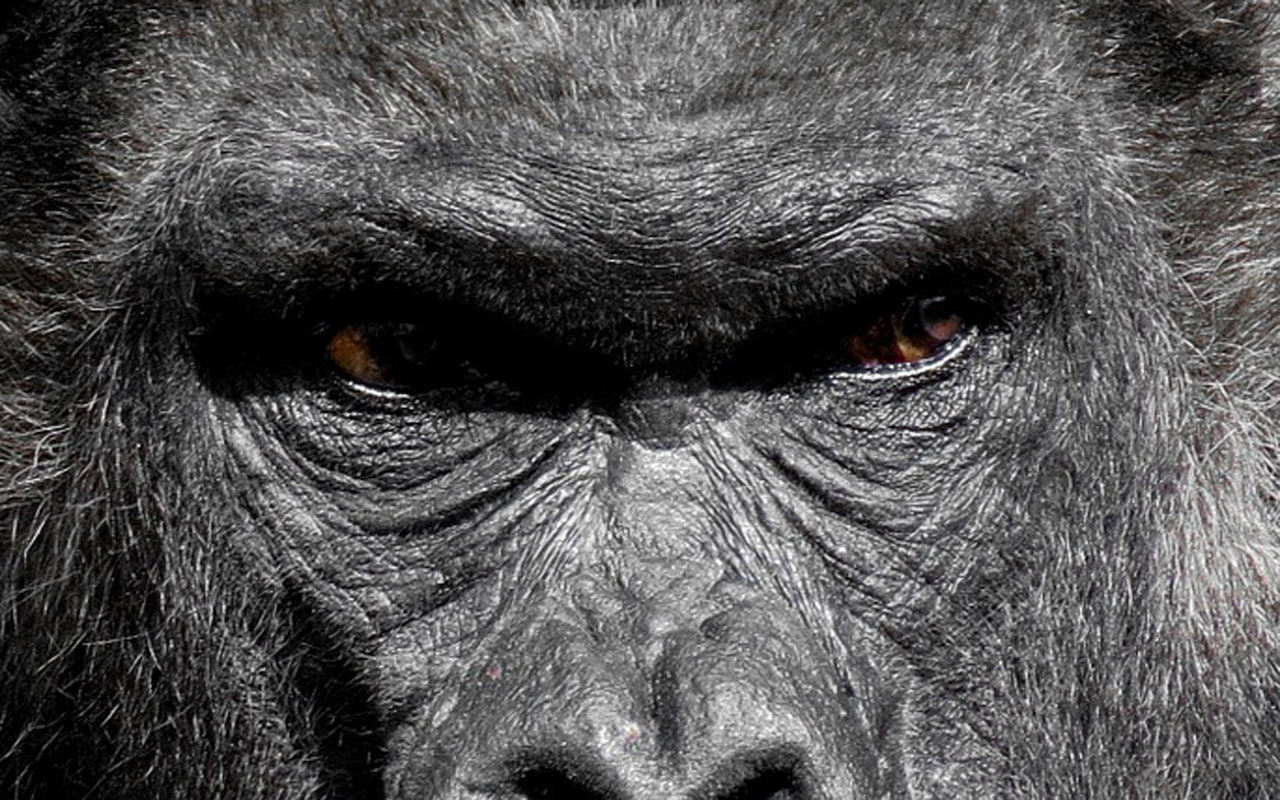
We have a little quiz question to test you today.
We may be able to come up with a little prize, so get your thinking caps on.
What own-choice work being played this weekend can be linked to a detective story by Edgar Allan Poe about a murder in the Rue Morgue, and a science fiction film starring Charlton Heston?
Thursday 25, 08:45:21
Lots to do today...
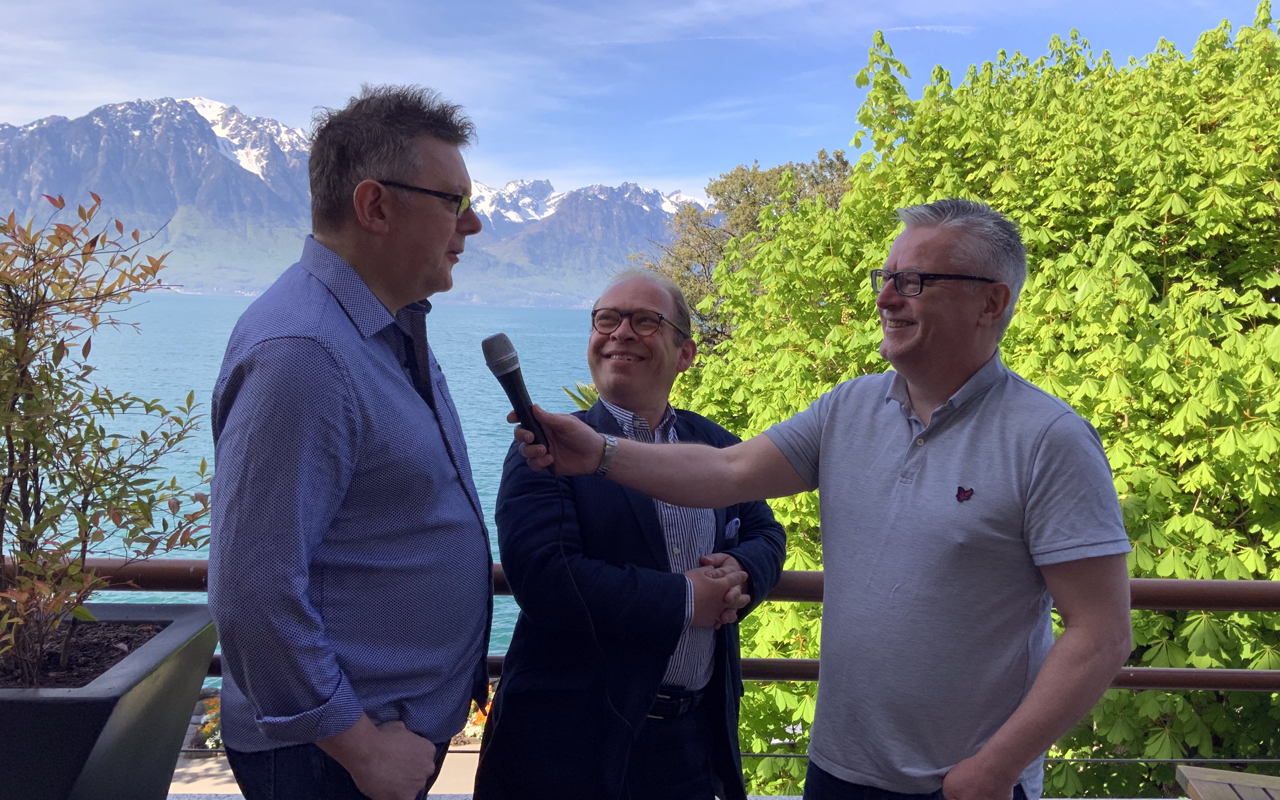
Meeting with Stein Skorpholm and Kenny Crookston
It's going to be a busy today today as look forward to the first competitive action in Montreux.
We will be catching up with plenty of people to do some interviews and features, so keep tuned...
Thursday 25, 07:49:30
42nd European Brass Band Championships: Timetable
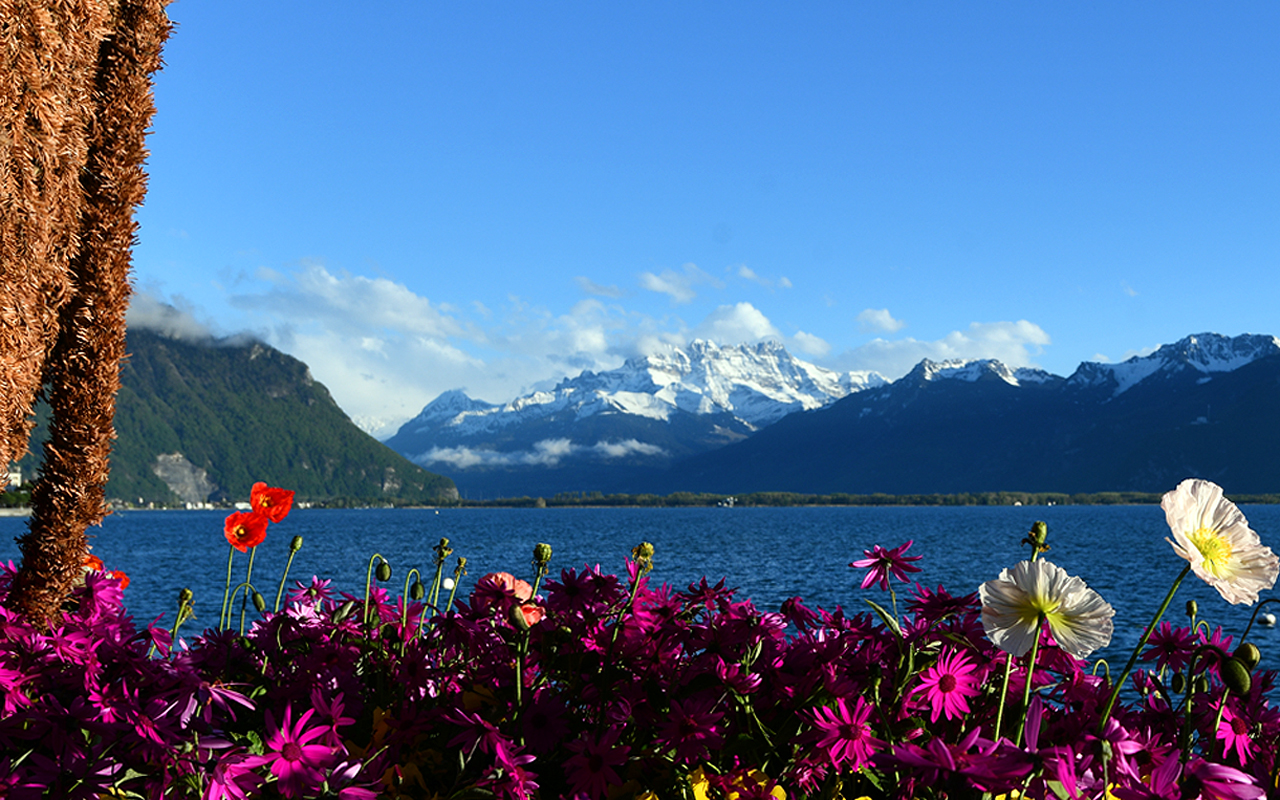
(All local times)
Thursday 25th April:
8.00pm
European Composers Competition
Friday 26th April:
9.30am
EBBA Press Conference
11.00am
Opening Ceremony
Draw: EBBC Championship Section set-work
Draw: EBBC Challenge Section
3.00pm
EBBC Composers' talk
4.00pm
EBBA Championship Section set-work
Saturday 27th April:
8.00am
Draw: EBBC Championship Section own-choice
9.00am
EBBC Challenge Section
12.00 noon
EBBC Championship Section own-choice
8.30pm
Gala Concert featuring Valaisia Brass Band and the European Youth Brass Band followed by Results and Awards Ceremony
10.30pm
Brass Party
Sunday 28th April
8.00am
EBBA General Meeting
9.30am
European Youth Brass Band Development Section contest
12.30am
European Youth Brass Premier Section contest
3.30pm
Farewell Concert followed by Awards and Results Ceremony
Thursday 25, 07:38:25
Good Morning from Montreux
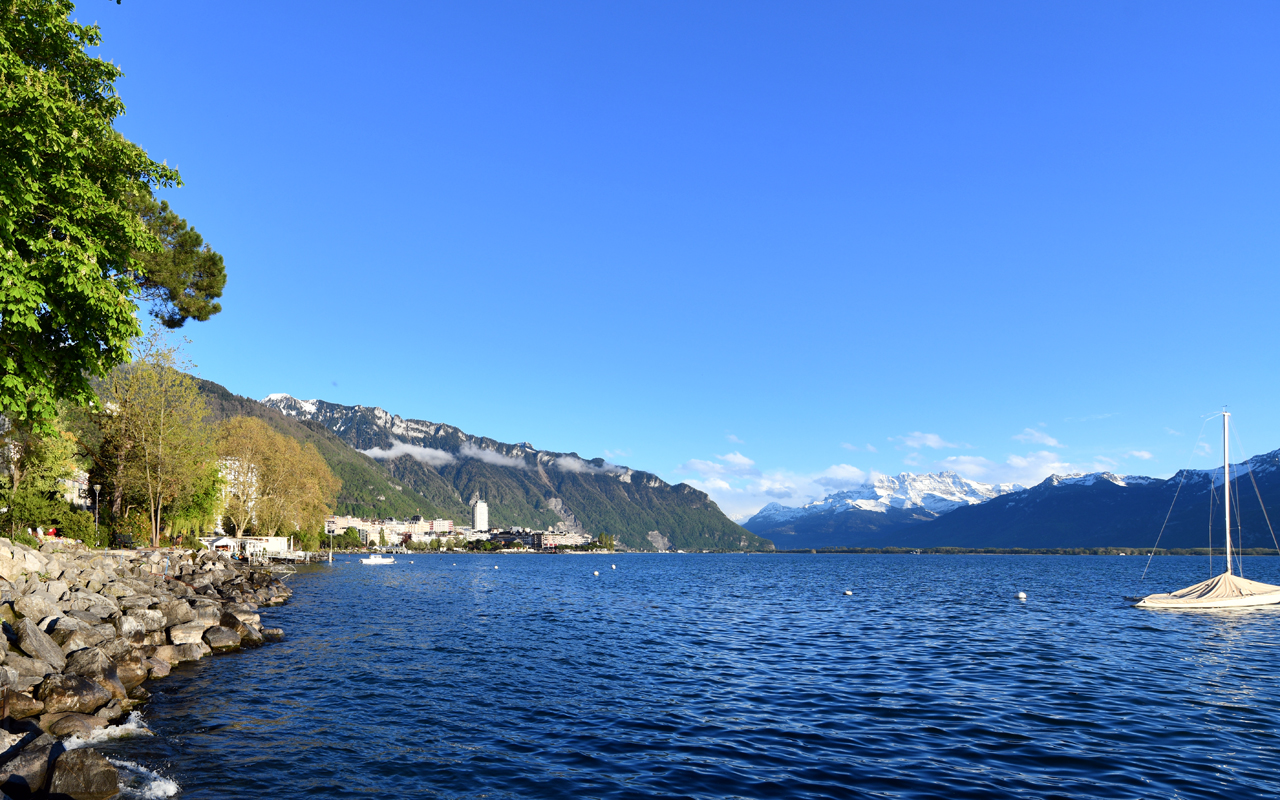
A bright and early start here in Montreux as the preparations continue in bringing you our coverage of the 42nd European Brass Band Championships returning to Switzerland for a fifth time.
The first European title to be decided will come this evening, on the Casino stage, with the European Composer Competition.
Works by Stijn Aertgeerts of Belgium ('Bipolarity'), Daniel Hall of England ('A Dialogue of Transmogrified Souls') and Paul Saggers of England ('Ironbright') will battle for the 2,500 Euro first prize.
Wednesday 24, 23:09:13
Looking forward to the music making
Wednesday 24, 21:06:16
Montreux Convention Centre
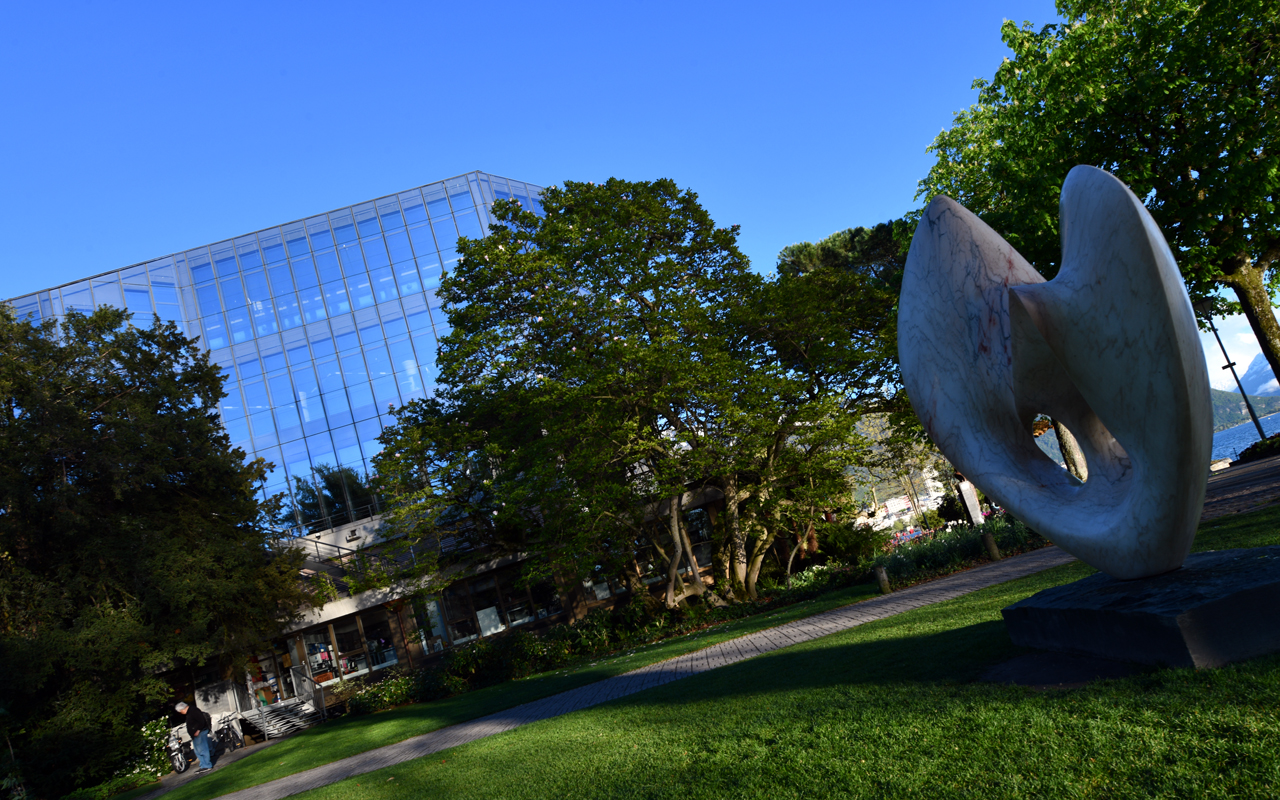
View from the lakeside gardens beside Lake Geneva
Wednesday 24, 13:05:00
Welcome to Montreux
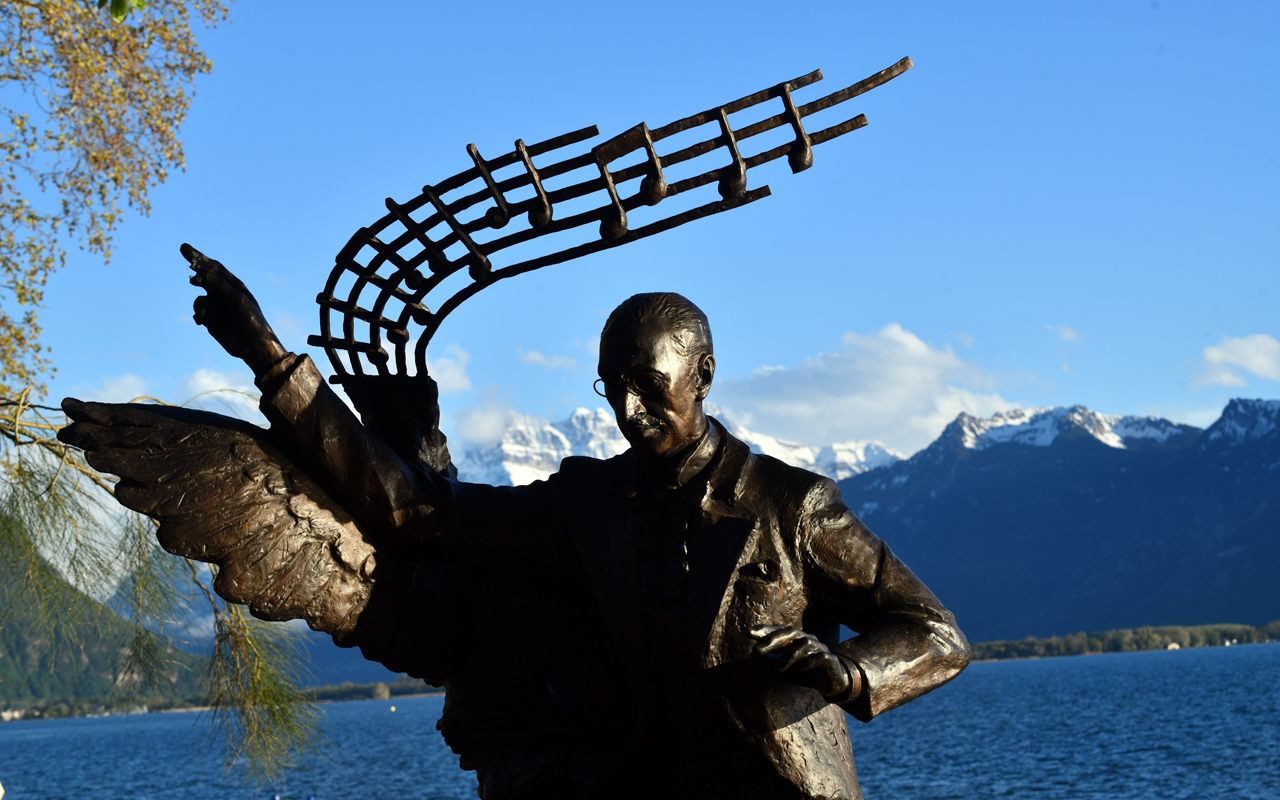
Sculpture of Igor Stravinsky standing on the lakeside
The 4barsrest team have arrived in Switzerland and preparations are well underway to bring you the full live coverage.
With all of the usual free 4BR coverage on one page why not also join worldofbrass.tv and enjoy the video action also.
All you have to do is go to www.worldofbrass.tv and sign up.













